250+ Academic Citations
How the Secret Ballot Ended the Gilded Age...
...And Obsoleted the Glass-globe Icon of Democracy
Beginning in the 1830s, the iconic symbol of democracy (as seen in many images below) was the transparent, glass globe, ballot box. But, in the late 1800s with partisanship, campaign finance and inequality soaring to all-time highs, the United States began to roll out the secret ballot. The intentions were clear. Proponents like John Stuart Mill claimed the secrecy of the ballot would curb the power of intimidating landlords and the rampant vote-buying funded by the wealthy.
Now embraced as a ‘cornerstone of modern democracy,’ the secret ballot brought an immediate reduction to election violence, intimidation and bribery. It also curtailed the Robber Barons’ vice-grip control over elections and diminished their hold on the democratic process. By curbing the government capture of the Gilded Age, the secret ballot opened the door for the Progressive Era. And despite the paucity of press on this topic, one thing is for sure, few other compelling reasons for this transition are offered. And the correlations and rationale that link the demise of inequality and corporate power to the simple introduction of voter secrecy are precise. And we expect, today, that reinstating congressional secrecy would have the same chilling effect on corruption.
By James D’Angelo – December 16, 2024
Citations
James Madison’s writings on the secret ballot predecess the nation’s adoption by over 100 years. In 1785, recollecting his own defeat at the public poll of the liquor-influenced voters of Orange County, Madison urged the secret ballot as “the only radical cure for those arts of Electioneering which poison the very fountain of liberty.”
Here we present citations (with links to original sources) to not just show the benefit of secret ballots, but to support the notion that they are the principle drivers in the diminished partisanship and inequality that were rampant in the late 1800s. To see more info on how congressional voting (made public / not secret) in 1970 have led to our most recent gilded age, click here. Special thanks to Ellery Foutch for unearthing many of these images and her excellent research
Everyone knows that laws which provide a secret ballot have deprived the aristocracy of all its influence.Cicero 50 BC
De Legibus
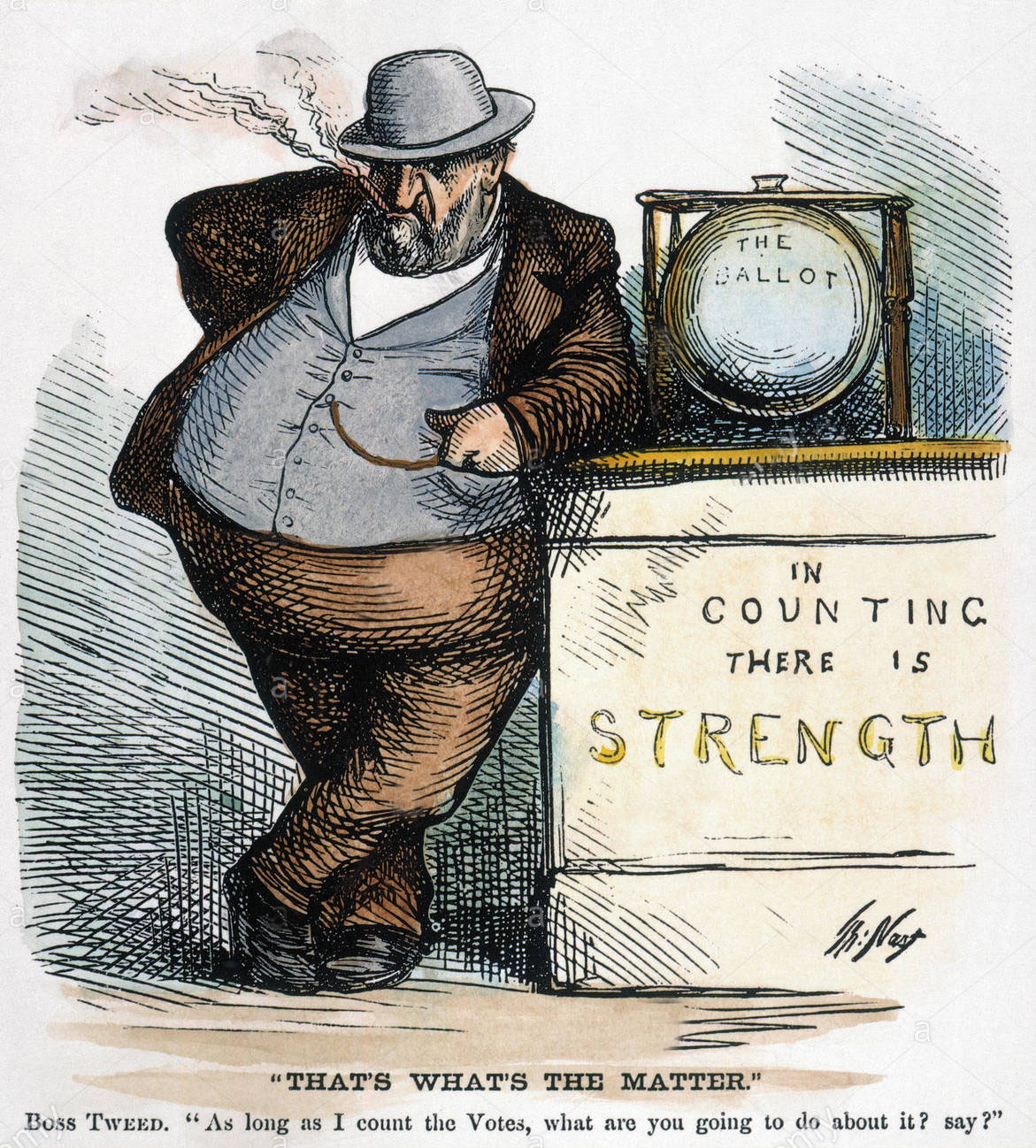
One of the most iconic images of Gilded Age Corruption – Boss Tweed and the Glass (Transparent) Ballot Box 1871

One of the most iconic images of Gilded Age Corruption – Boss Tweed and the Glass (Transparent) Ballot Box 1871
The powerless will always be prevailed upon by the powerful; only secrecy can protect them from bribery and bullying.Jill Lepore 2008
Rock, Paper, Scissors
There can be no doubt that many members of the aristocracy vociferously opposed the introduction of secret voting precisely because they saw in it a dangerous democratic innovation hostile to the influence of property at elections.Bruce Kinzer 2014
The Un-Englishness of the Secret Ballot
The secret ballot disrupts vote buying because candidates are uncertain how a citizen actually voted.Ian Ayres 1999
Disclosure vs. Anonymity in Campaign Finance
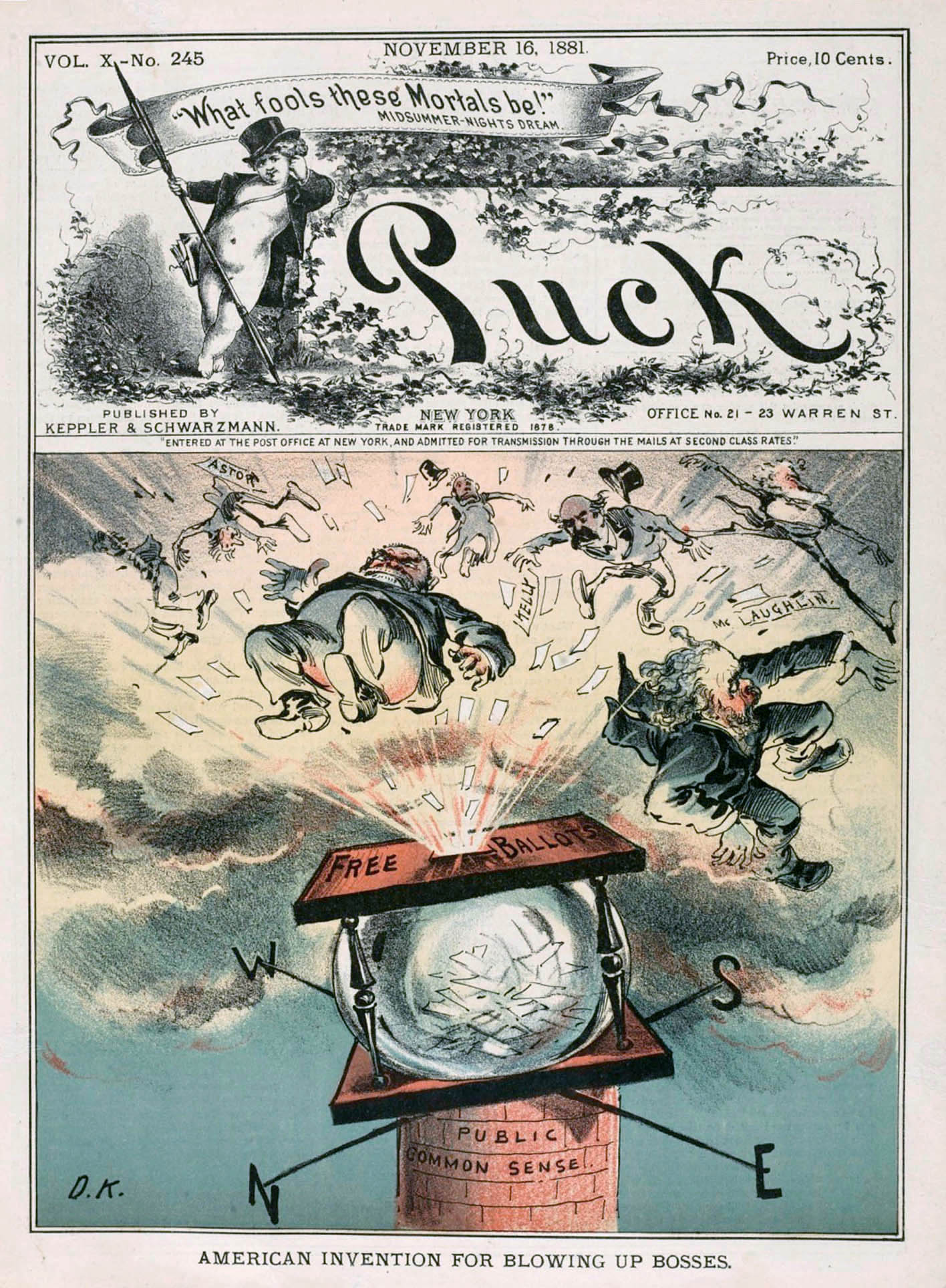
“American Invention for Blowing Up Bosses” Puck 1881
Depicts ballot box labeled "Free Ballots" exploding atop a brick tower labeled "Public Common Sense", blasting John Kelly, Hugh McLaughlin, Roscoe Conkling, and William W. Astor into the sky.

“American Invention for Blowing Up Bosses” Puck 1881
Depicts ballot box labeled "Free Ballots" exploding atop a brick tower labeled "Public Common Sense", blasting John Kelly, Hugh McLaughlin, Roscoe Conkling, and William W. Astor into the sky.
If they want to vote themselves, they won’t get no money from me.Darrel Fugate 1987
A Vote-buyer on his Trade - to Win you have to do it
The failure of the law to secure secrecy, opened the door to bribery, intimidation, and corruption. It is hard, however, to imagine a system more open to corruption than the one just described.Eldon Cobb Evans 1917
A History of the Australian Ballot System in the United States
A series of ballot laws, passed in the second part of the second century, made the voting secret in all the Roman assemblies. The ancient sources which refer to the introduction of the ballot are few; they describe it as a radical innovation. Modern scholars have long regarded the change as a democratic one, lessening the control of the upper classes over the electorate, and enhancing the voters’ effective freedom of choice.Alexander Yakobson 1995
The Secret Ballot and its Effects in the Late Roman Republic
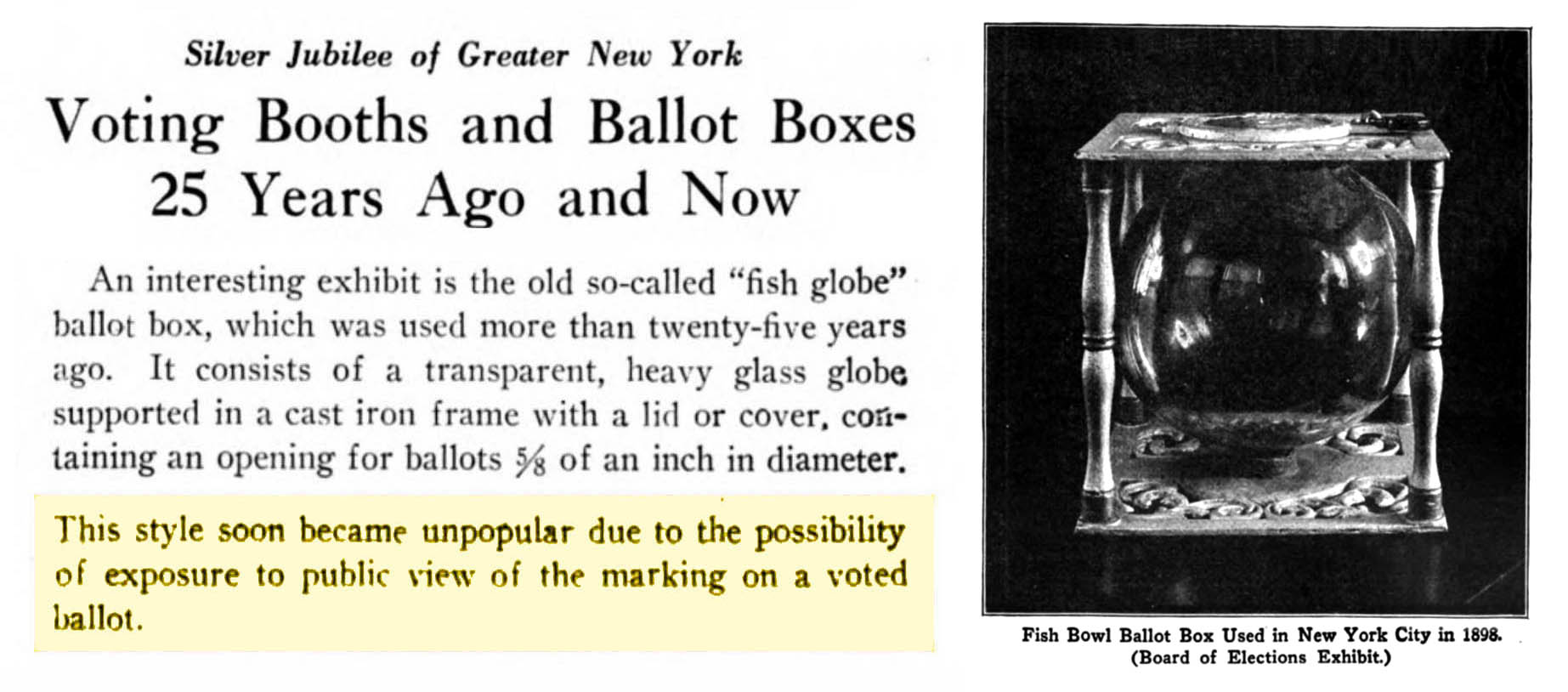
1923 article describing how the transparency of glass ballot box became obsolete when they realized it aided in corruption

1923 article describing how the transparency of glass ballot box became obsolete when they realized it aided in corruption
In 1882 a Conservative M.P. complained that “the Ballot Act [the introduction of the secret ballot] had promoted that most un-English practice of taking bribes from both sides, or voting against the side from which a bribe had been accepted.”Alexander Yakobson 1995
The Secret Ballot and its Effects in the Late Roman Republic
The Ballot Act of 1872 finally gave Britain the secret ballot, thereby striking a major blow against electoral corruption and intimidation and greatly diminishing the ability of the landowning elite to control electoral outcomes.Sheri Berman 2019
Democracy and Dictatorship in Europe
In a debate in the German parliament [before the introduction of the secret ballot], Heinrich Rickert described how employers would “lead the voters to the voting place like animals to slaughter. In front of the door of the voting precinct some supervisor or inspector pushes a ballot in the hands of the worker. As [the worker] does not want to lose his job, he is in no position to vote according to his conviction.”Isabela Mares 2015
From Open Secrets to Secret Voting
They handed over to workers who were dependent on them ballots that were folded in different ways. Some were folded in the shape of a triangle, others in the shape of a diamond, a hat, or an accordion. Naturally, they did not hesitate to inform these voters that they would keep an eye on them when the votes were counted and that it was imperative to find these particular ballots. Journal Officiel de la Republique Française 1914
Débats Chambre
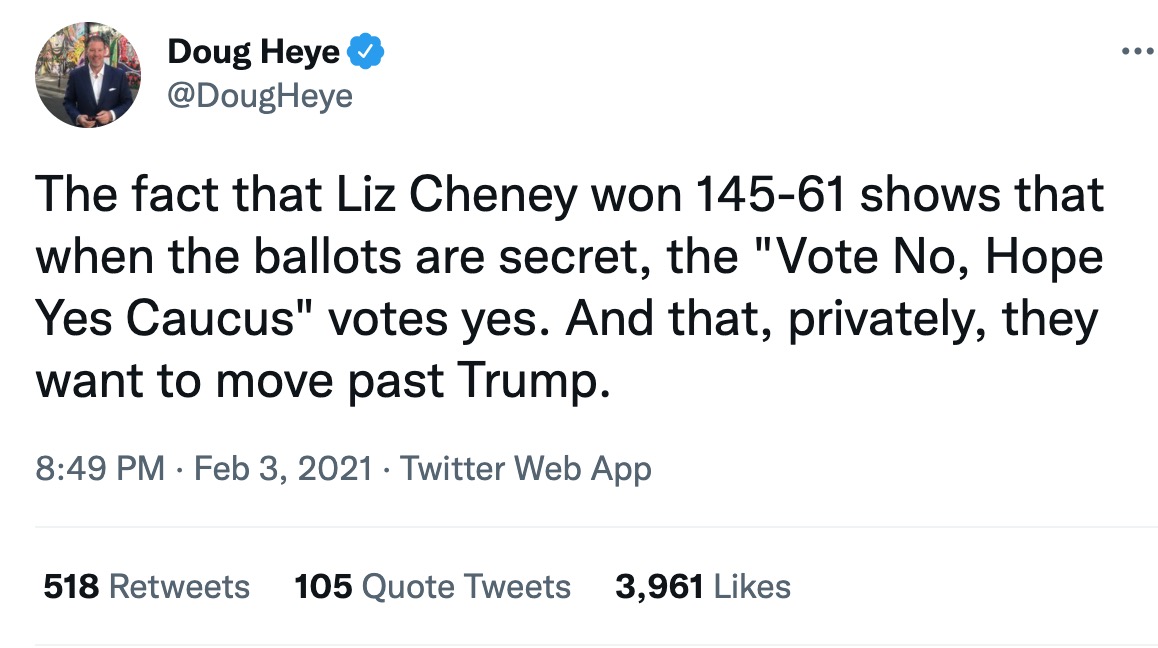
2021 Liz Cheney retains leadership role via secret ballot despite attacks on Trump

2021 Liz Cheney retains leadership role via secret ballot despite attacks on Trump
Because most democracies use a secret ballot, citizens can accept the money but vote for whichever candidate they prefer even if their preferred candidate did not offer similar gifts.Ari Pradhanawati, George Towar Ikbal Tawakkal & Andrew D. Garner 2018
Age of Voting their Conscience
Moreover, “the individuals in each group announced their choice orally, one by one, to the teller, or rogator. How individuals voted was therefore a very public affair”; the combination of voting procedures and social realities ensured the upper classes a powerful influence over the voting assemblies.Alexander Yakobson 1995
The Secret Ballot and its Effects in the Late Roman Republic
“Scarcely an election goes by without somebody being killed.”U.S. Marshall 1881
New Perspectives on Election Fraud in the Gilded Age
American clientelism (of the late 1800s) was dealt a blow by ballot reform.Susan Stokes & Thad Dunning 2010
What Killed Vote Buying?
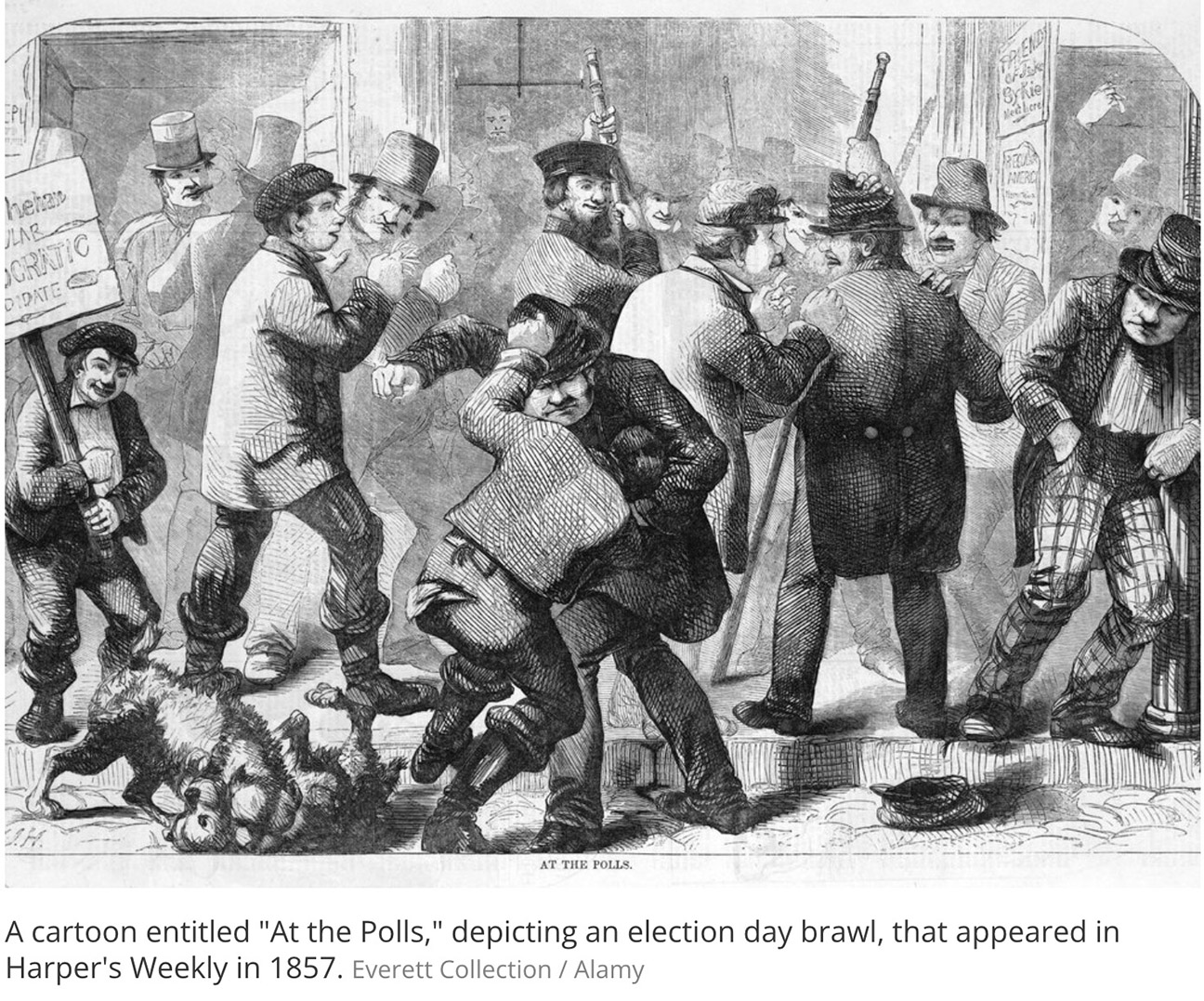
1857 Political Cartoon "At the Polls" depicting an election day brawl

1857 Political Cartoon "At the Polls" depicting an election day brawl
The Romans also used the secret ballot to limit the influence of the rich.Jon Elster 2013
Securities Against Misrule
In Rome “the peoples voices were bought and sold, and that by the poore, and thence it came that the richest man . . . made himself a perpetuall dictator.”Colonel Rich 1647
The Putney Debates, London: The Historical Society
Restrictions on speech around polling places on election day are as venerable a part of the American tradition as the secret ballot.Justice Anton Scalia 1992
From Clamor to Calm: Restrictions on Speech at Polling Places
By fighting for the secret ballot… it would be the only way, he warned, to “check the arrogance of corrupt partisan organization.”Puck Magazine 1884
Holding the Tiger - The Gilded Age
Voter intimidation has cropped up in places across the nation, but the voting booth remains the one place where nobody can get to you.Lily Hay Newman 2022
Secret Ballot Is US Democracy’s Last Line of Defense
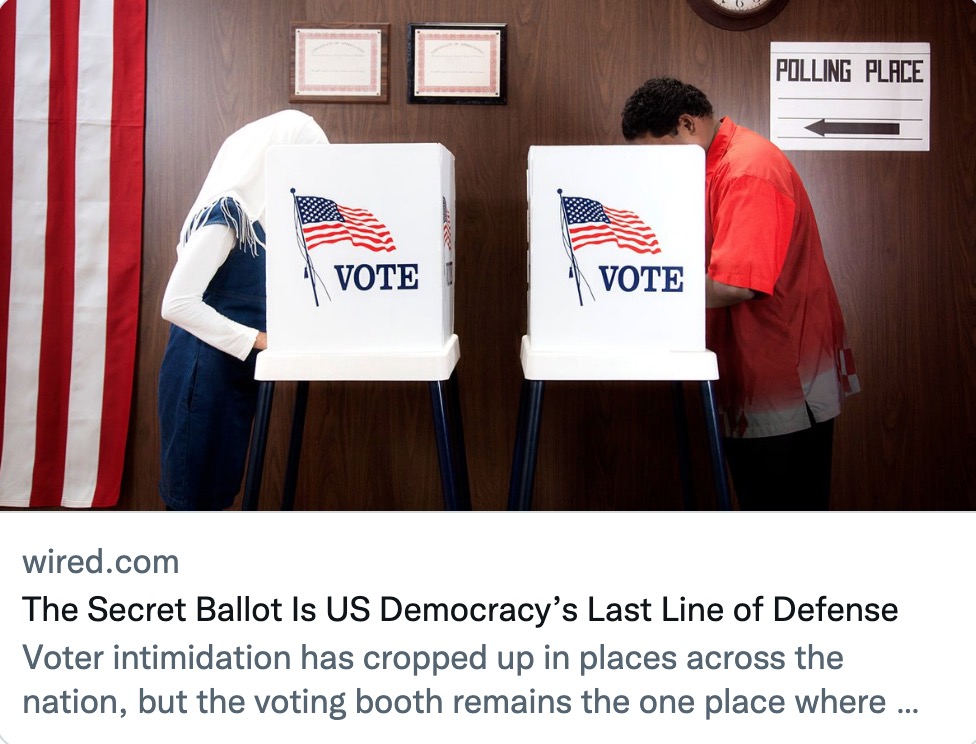
Newman 2022 - Secret Ballot Is US Democracy’s Last Line of Defense

Newman 2022 - Secret Ballot Is US Democracy’s Last Line of Defense
In Tiberius’s conception [Roman emperor ad 14–37], the assembly would become the dominant force directing all facets of Roman policy. Led by assertive tribunes and protected by secret ballots that enabled plebeians to vote anonymously for the first time, the assembly could legislate as the popular will demanded.Edward J. Watts 2018
Mortal Republic - How Rome Fell Into Tyranny
Of the attempts to prevent corrupt influence in the first place, the most notable in the period under discussion was the substitution of secret for open voting.Charles Seymour 1915
Electoral Reform - The Final Attack Upon Corruption
My attention was called to the peculiar way they had of managing the voters there, I stepped up to the little railing that they had there to go around and up to the polls and I saw two men stationed at the entrance where the voters went it. One was a Mr. Chase, and the other was a Mr. Knox. I saw that the help of the village [employees/thugs of the big manufacturer] came along in a sort of rotation. Mr. Chase was on one side and this Mr. Knox was on the other, and as each man came up they would take hold of the ticket that the man had, and say, “That is right, pass on.” Another would come would come up and they would say, “That is right, pass on.” Another would come up, and they would say, “Hold on, that is not the vote that you want to cast.” “Why, yes, it is the vote I want to cast.” “No, it is not.” “Why certainly this is my vote.” “O, no”; and he got it out of the man’s hand, tore it up, and threw it on the floor. He said, “You do not want to vote such a damned vote as that.” He then handed the voter another one. The man then remarked, “I don’t want to cast this vote.” The reply was, “Go right along’ that is the vote you want.” The man went right along and put it in the box. Mr. Hastings, the constable, stood right opposite, and I stood, perhaps, four feet from this Mr. Knox.United States Congress 1880
Civilized Bulldozing - Alleged Frauds in the Late Elections
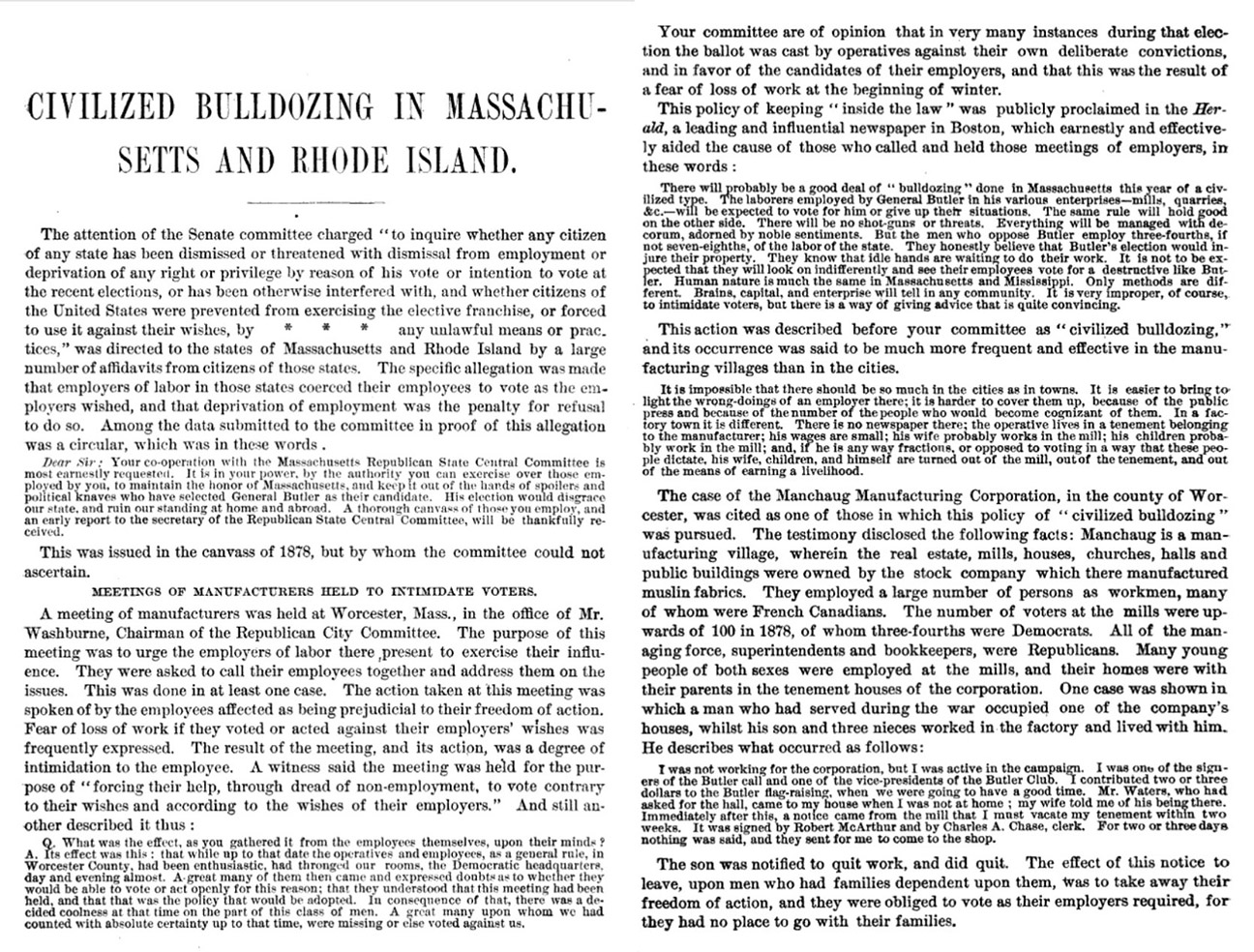
US Congress Report 1880 - Civilized Bulldozing in Massachusetts and Rhode Island

US Congress Report 1880 - Civilized Bulldozing in Massachusetts and Rhode Island
At Middlesex, in 1768, gangs of roughs, said to have been hired at a guinea a day, attacked Wilkite radicals at the [open ballot] poll, killing one man, and struck fear into the general populace by assaulting men and women indiscriminately in the street. Similarly, at Westminster in 1784 the Foxites alleged that ‘banditti... armed with bludgeons, staves and pistols’ violently attacked their supporters, leaving many wounded and one dead.Jon Lawrence 2009
Electing Our Masters: The Hustings in British Politics from Hogarth to Blair
The particularly unruly election of 1882 even provided the chaotic backdrop for the culmination of the Hatfield-McCoy feud, an infamous and often bloody conflict between two rural families in eastern Kentucky. The election day festivities quickly turned sour when the Hatfield and McCoy sons got into a drunken brawl; Ellison Hatfield was mortally wounded, and his brothers shot the three McCoy men in retaliation. Though this incident was particularly egregious, it exemplified to reformists the need to establish order at the polls.Kate Keller 2018
Why Are There Laws That Restrict What People Can Wear to the Polls?
As occurs so often in the course of American reform movements, light is presented as the solution to corruption which occurs in secret and in darkness: light is the great disinfectant. But of course what that reasoning applied to this circumstance meant was that every individual vote would be an even more visible, even more a public declaration for any interested observer to see, just as any observer at a viva voce election could hear every vote. Transparency, not secrecy, was the solution to the ills of American politics. It would take another generation for the opposite view to take hold: that the solution to the ills of American politics was secrecy, not visibility and not transparency, but voting as a private act and a ballot box that shielded every vote from scrutiny.Donald A. Debats 2016
Voting Viva Voce - Unlocking the Social Logic of Past Politics
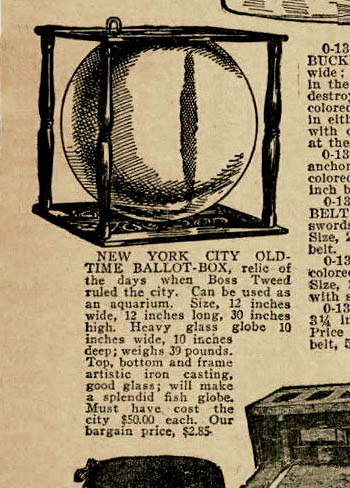
The glass urn ballot box - relic of days when Tweed ruled city 1927

The glass urn ballot box - relic of days when Tweed ruled city 1927
If the dependent relations are such that the individual voter in any considerable number or to any great degree is afraid of the public ballot, and either abstains from voting or votes contrary to his convictions, then the secret ballot is the lesser evil.John Stuart Mill 1861
Terrorism Admitted on All Sides
[With the introduction of the secret ballot] the day of polling saw such quietness that a stranger would not realize that an election was going on. Rioting and disorder disappeared entirely. Intimidation by landlords and dictation by trades unions alike ceased.John Henry Wigmore 1889
The Australian Ballot System
By compelling the dishonest man to mark his vote in secrecy, it renders it impossible for him to prove his dishonesty, and thus deprives him of the market for it.John Henry Wigmore 1889
The Australian Ballot System
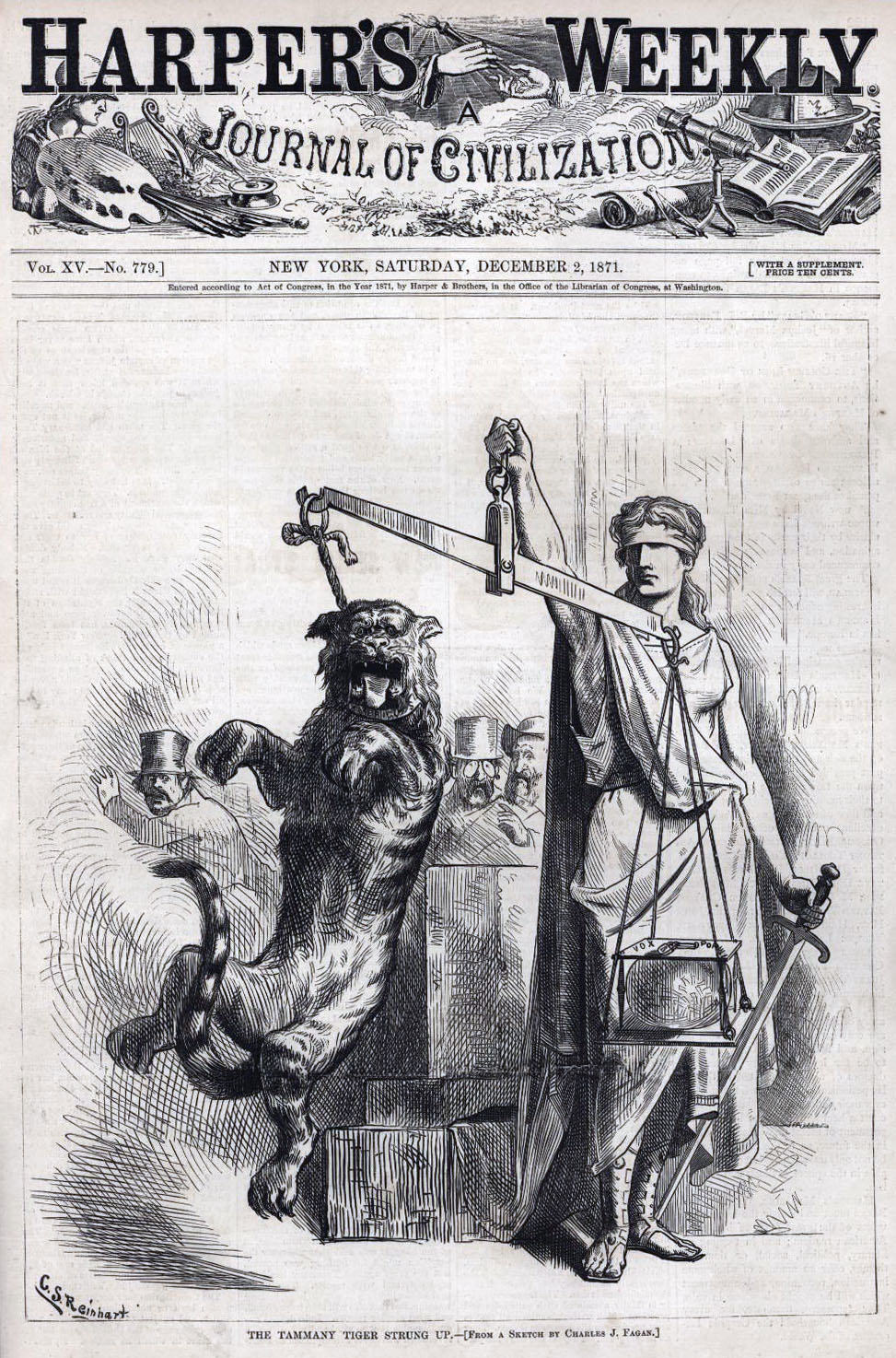
“Tammany Tiger Strung Up” by voting reform - 1871

“Tammany Tiger Strung Up” by voting reform - 1871
Today, virtually every democracy makes overt vote buying illegal and discourages it through mechanisms like the secret ballot.Francis Fukuyama 2014
Political Order and Political Decay
The absence of a secret ballot magnified corruption, [and] enhanced party control.Maria Petrova 2011
Newspapers and Parties
Voting procedure is open in the USSR, but the ballot is designated secret by the law (article 95 of the constitution); however, anyone who makes use of the procedure for casting his vote secretly is noted by the electoral officer, and disciplined accordingly.Roger Scruton 1982
A Dictionary of Political Thought
The view is widespread that more transparency in institutions leads to better outcomes. That, however, is surely too enthusiastic a view. To illustrate, a sine qua non of popular democracy is the secret ballot — the suppression of transparency. To appreciate one of the central virtues of secret balloting, consider the fact that in a number of organizations, the leadership, for obvious reasons, insists that the preferences and opinions of the rank and file be revealed through a hand count instead of a secret ballot. Transparency, in that case, is a way of controlling the membership.Albert Breton 2007
The Economics of Transparency in Politics
The adoption of the secret ballot dramatically reduced instances of electoral coercion. Researchers found that indicators of electoral corruption dropped – such as prices offered by those seeking to buy votes, the frequency of petitions challenging electoral results, and the rates at which incumbents are reelected.Susan Orr & James Johnson 2020
Perils of voting without secrecy
There will be a good deal of ‘bull-dozing’ down in Massachusetts this year of a civilized type. The laborers employed by General Butler in his various enterprises—mills, quarries, etc.—will be expected to vote for him or to give up their situations. The same rule will hold good on the other side. There will be no shotguns or threats. Everything will be managed with decorum, adorned with noble sentiments. But the men who oppose Butler employ three-fourths, if not seven-eighths, of the laborers of the state. They honestly believe that Butler’s election would injure their property. They know that idle hands are waiting to do their work. It is not the be expected that they will look on indifferently and see their employees vote for a destructive like Butler. Human nature is much the same in Massachusetts and Mississippi. Only methods are different. Brains, capital, and enterprise will tell in any community. It is very improper to intimidate voters, but there is a way of giving advice that is most convincingUnited States Congress 1880
Civilized Bulldozing - Alleged Frauds in the Late Elections
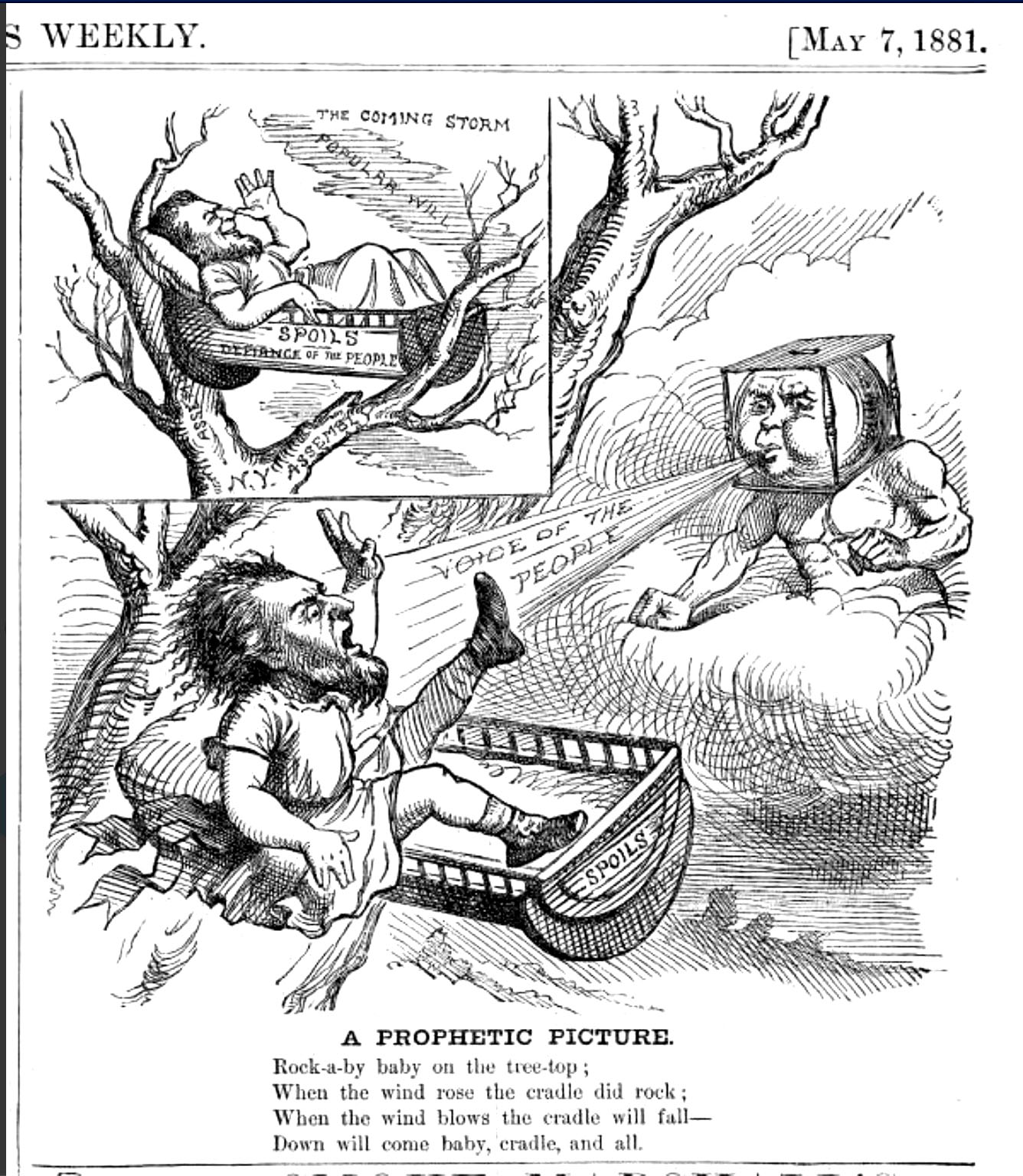
A Prophetic Picture - The Ballot Blows out Spoils 1881 - Harpers

A Prophetic Picture - The Ballot Blows out Spoils 1881 - Harpers
By compelling the honest man to vote in secrecy it relieves him not merely from the grosser forms of intimidation, but from more subtle and perhaps more pernicious coercion of every sort.John Henry Wigmore 1889
The Australian Ballot System
Ever since its first days, indeed, in the time of Henry VI., the open poll had shown its failings. One is half amused to read the ingenuous complaint presented in 1451 by certain freemen of Huntingdonshire, protesting against the election of two knights returned for the shire, and telling a tale of armed opponents, who threatened violence at the polls, “and soe wee departed for dread of the inconveniences that was likely to be done for manslaughter.” John Henry Wigmore 1889
The Australian Ballot System
Landlords intimidated their tenants, and marched detachments to the polls to vote in their interests. In one place employers coerced their workmen ; and in another the trades unions coerced their members. Worse than all, and hardly to be believed, in larger cities hired mobs often patrolled the streets, keeping away hostile voters and intimidating those who ventured to the polls. A Conservative mob or a Radical or Liberal mob, or both, were in some places a common feature of an election. On one occasion which may serve as an example, some 500 out of 2,000 Conservative voters were prevented by demonstrations of violence from giving their votes.John Henry Wigmore 1889
The Australian Ballot System
The general and emphatic verdict was that a thorough change for the better had taken place. “All those disorders,” said Sir Joseph Heron, town clerk of Manchester, “that used to occur under open voting have ceased altogether.... Any one walking through the borough would not know the fact that an election was going on ; everything is so perfectly peaceful;” and yet “it was notorious that, taking the city as a whole, there was more interest felt in the elections than had been known for very many years past.” To the change in regard to the purity of the election he bears the strongest possible testimony: “I believe that such a thing as bribery does not exist at Manchester;” though it was in these large cities that the disorders of the previous decades had reached their extreme.” The ballot is a blessing to us.” John Henry Wigmore 1889
The Australian Ballot System
David Eisenbach (Columbia) 2020
The Introduction of the Secret Ballot Link
David Eisenbach (Columbia) 2020
The Introduction of the Secret Ballot
The improvement in the protection of electoral secrecy had far-reaching consequences for political competition... These changes in the electoral law reduced the opportunities for electoral intimidation. By emboldening voters to take electoral risks, the Rickert law made possible the spectacular political growth of the Social Democratic Party during the final elections of the period. These gains for Social Democrats came at the expense of parties on the right. Because of the reduction in their ability to monitor voters’ choices, many candidates on the right lost districts that had previously been their electoral strongholds.Isabela Mares 2015
From Open Secrets to Secret Voting
[Before the secret ballot] Candidates campaigned by offering money, food, or entertainment to voters. In addition to these positive inducements, electoral intimidation, pressure, and harassment were amply used during elections. Policemen, tax collectors, and other local notables were deployed to influence the decisions of voters to support particular candidates. Imperfections in voting technology allowed candidates and their agents to engage in intense monitoring of the political choices made by voters and to punish the latter for undesirable political choices. Such threats of post-electoral punishments were highly credible because of ample imperfections in voting technology. Isabela Mares 2015
From Open Secrets to Secret Voting
The use of the secret ballot makes it impossible to tell whether voting promises are carried out. In these circumstances the voter will simply vote in accord with his preferences on each individual issue.Gordon Tullock 1959
Problems of Majority Voting
In 1856 the state of Victoria, which had been carved out of New South Wales in 1851, and the state of Tasmania would become the first places in the world to introduce an effective secret ballot in elections, which stopped vote buying and coercion. Today we still call the standard method of achieving secrecy in voting in elections the Australian ballot.Daron Acemoglu, James A. Robinson 2012
Why Nations Fail
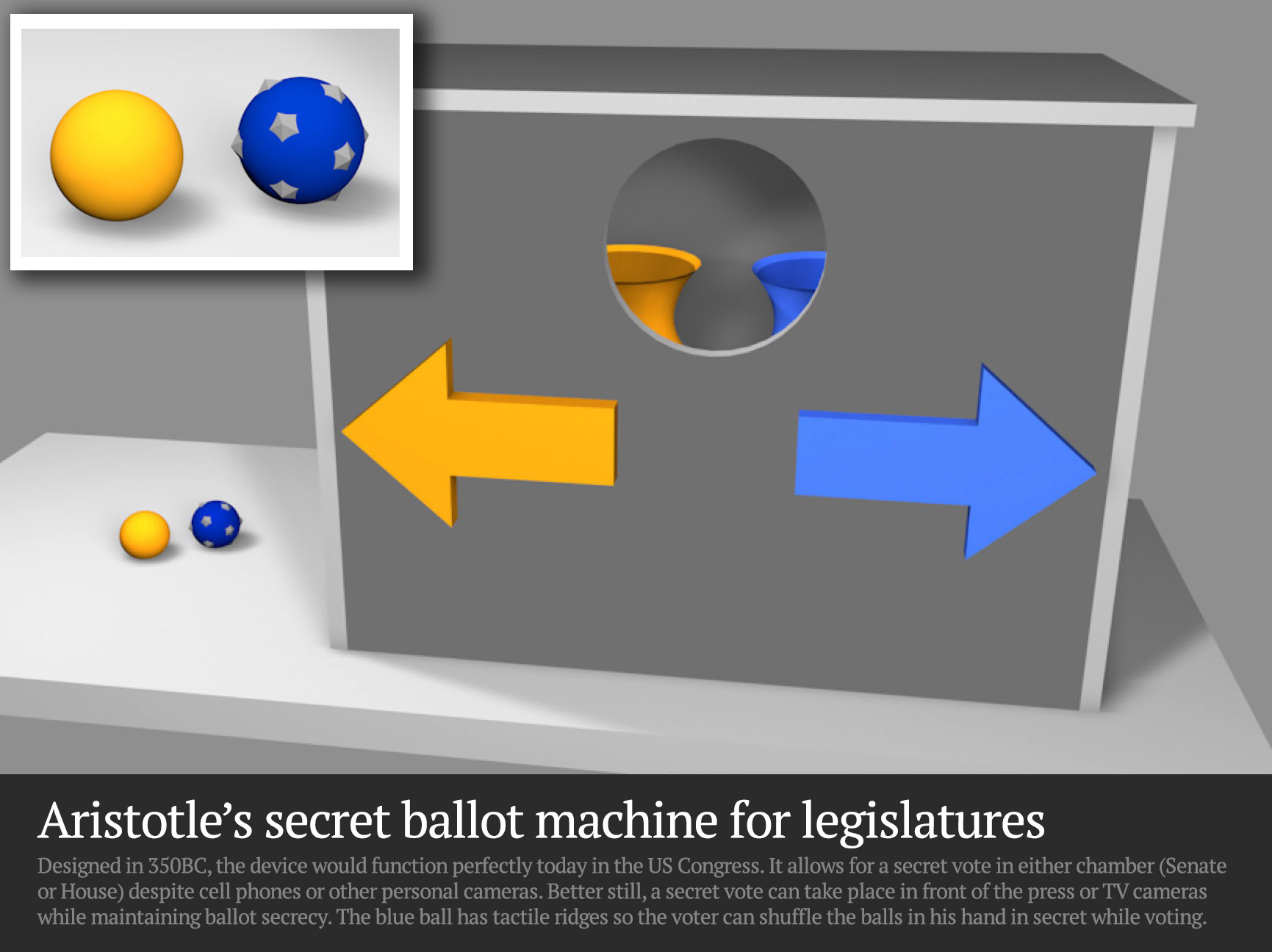
Aristotle’s Secret Voting ‘Machine’ 350BC
3-D drawing by James D’Angelo made from Aristotle’s notes on a dual urn secret voting system. To use, the voter grabs both of the ballots (balls) in one hand and inserts their hand in the hole. To vote yes, they put the yellow ball in the yellow urn and the blue ball in the blue urn. To vote no, they do the opposite. The blue ball is grooved so it can be distinguished by touch alone. This system allows for observers to monitor the voting process while still keeping the vote secret. A the end of the vote, the urns are overturned in public and the votes counted. It is an ideal system for legislatures, where the number of votes are small – and it eliminates the ability to record the vote with cellphones.

Aristotle’s Secret Voting ‘Machine’ 350BC
3-D drawing by James D’Angelo made from Aristotle’s notes on a dual urn secret voting system. To use, the voter grabs both of the ballots (balls) in one hand and inserts their hand in the hole. To vote yes, they put the yellow ball in the yellow urn and the blue ball in the blue urn. To vote no, they do the opposite. The blue ball is grooved so it can be distinguished by touch alone. This system allows for observers to monitor the voting process while still keeping the vote secret. A the end of the vote, the urns are overturned in public and the votes counted. It is an ideal system for legislatures, where the number of votes are small – and it eliminates the ability to record the vote with cellphones.
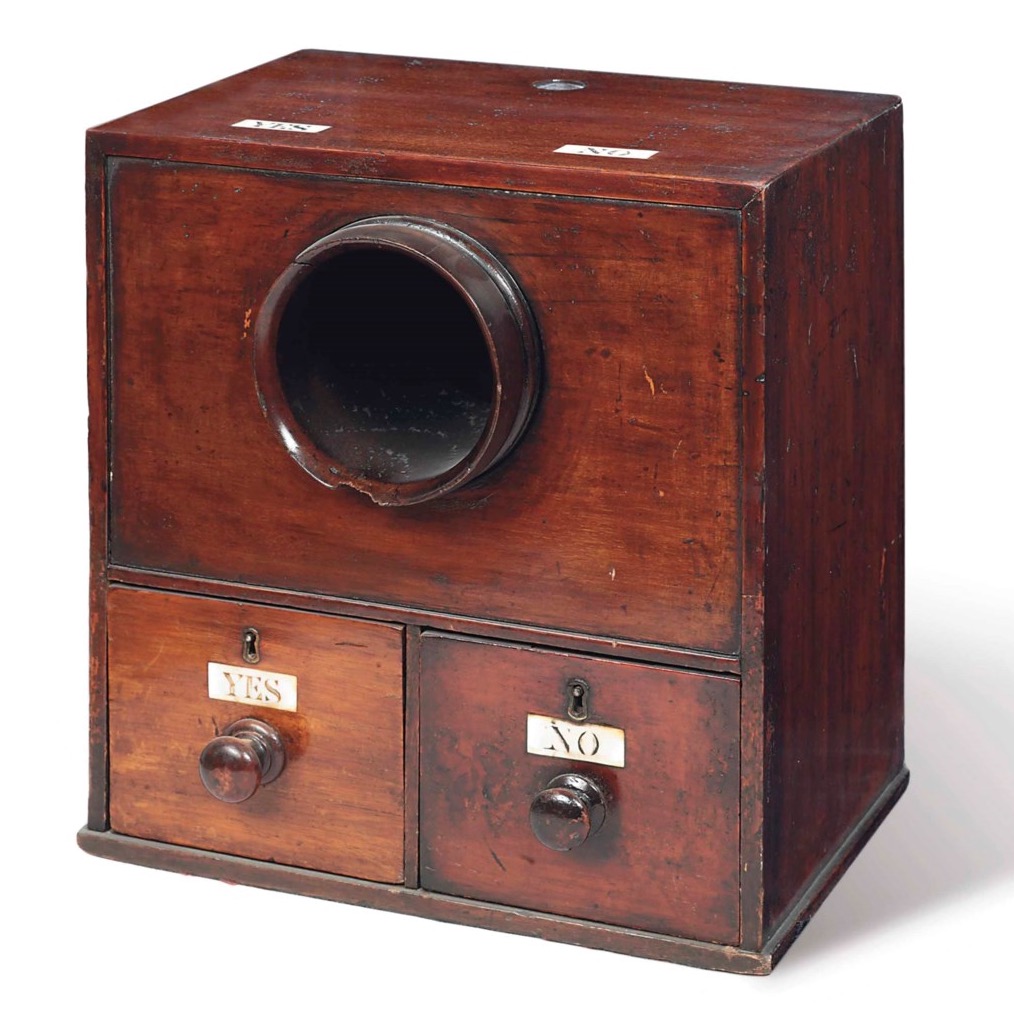
Victorian Era: Aristotle-style Ballot Box

Victorian Era: Aristotle-style Ballot Box
“Any election I work in, I’ve got money. Generally there’s somebody buying votes against me. The person who gets ‘em (wins the election) is the one who pays the most, and I generally have it (the most money).” But Fugate never pays off until he has actually seen the bought vote cast, or else casts it himself. “You don’t give nobody money unless you watch ‘em. I go to the house, line ‘em up. On Election Day, I vote ‘em. They let me vote ‘em any way I want to. If they want to vote themselves, they won’t get no money from me. I wouldn’t trust ‘em if I couldn’t watch ‘em vote.”
By law, only voters who swear they cannot read, are blind or suffer from some other physical disability requiring assistance can legally receive aid In the voting booth. Such voters generally are assisted by one of two precinct officials while the other observes. But if the voter prefers, he can be assisted by a person of his choice. Under state law, an individual can assist only two voters in any election. In years past, Fugate and others have been able to perpetrate widespread fraud by II assisting II dozens of voters actually casting their votes In exchange for giving them money.R.G. Dunlop 1987
A Vote-buyer on his Trade - to Win you have to do it
The Plug Uglies were excellent intimidators of voters. With their bloody help, the American Party in 1857, for example, won 19 of 20 wards in Baltimore with 76 percent of the vote and took control of the city and state government. Baltimore roughs were so good, they were recruited to control voting in Philadelphia and Washington, D.C.Carl Schoettler 2006
Think Baltimore's rough now?
Anderson and Tollison (1990) … argue that the poor used the secrecy provided by the Australian Ballot to vote in their own interest. As rational wealth-maximizers, they voted for expansionary government policies in the form of redistribution.Jac C. Heckelman 1995
The effect of the secret ballot on voter turnout rates
Perils of voting without secrecy: Before modern voting procedures were created, there was a lively trade in votes. Employers, landlords, political operatives and even clergy exerted their influence on people who had to vote by voice or public show of hands. In places that used paper ballots, party agents handed out pre-marked, color-coded party “tickets” and watched as voters dropped them in the ballot boxes. People could be – and were – bribed and threatened into voting for particular candidates, regardless of their personal views on the candidates or the issues.Susan Orr & James Johnson 2020
Voting by mail is convenient, but not always secret
Other forms of intimidation may be even more difficult to identify. How could anyone uncover the subtle – or not so subtle – influence exerted at the kitchen table by an abusive spouse or domineering parent, when the family sits down to vote? It happens all over the world in places where ballots are not secret.Susan Orr & James Johnson 2020
Voting by mail is convenient, but not always secret
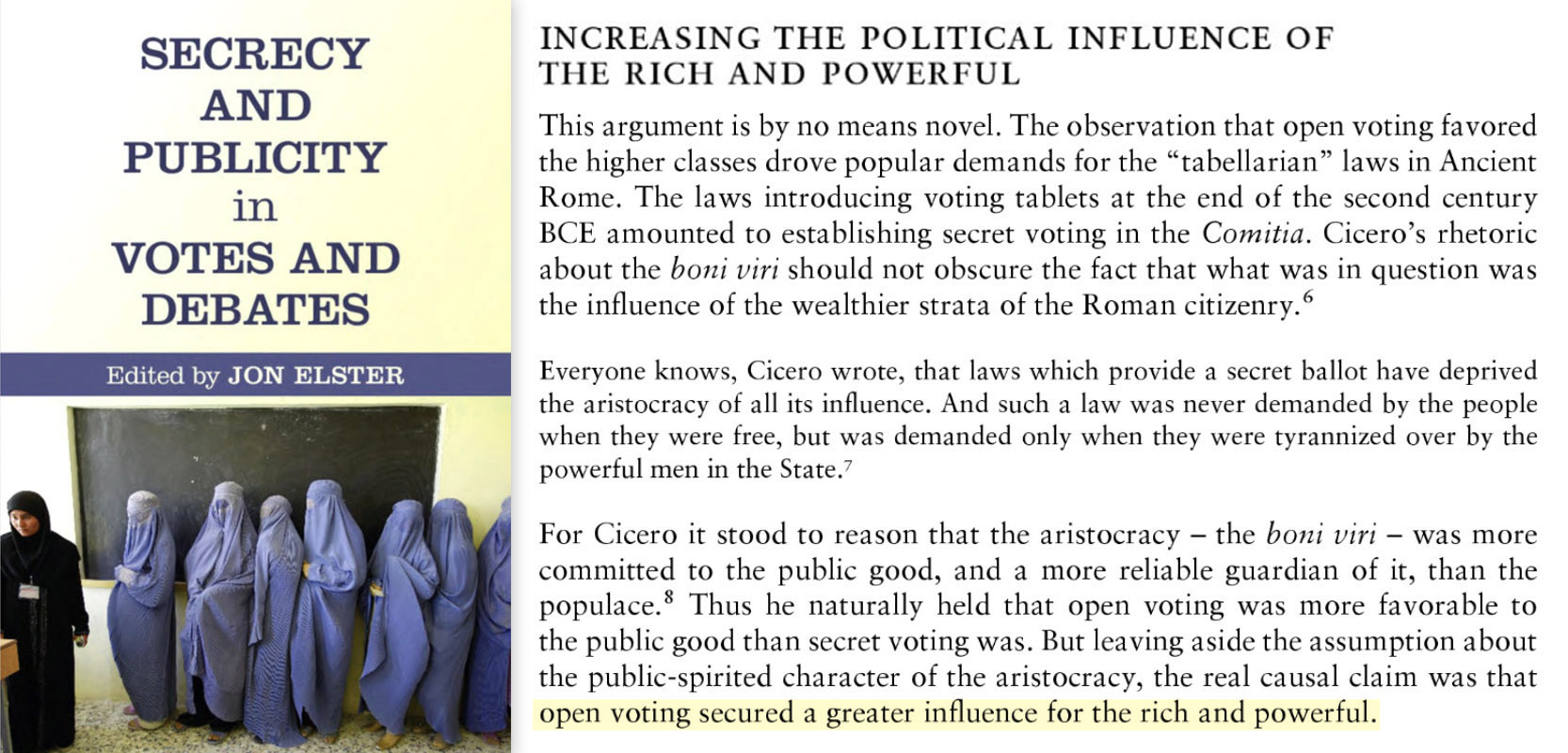
Bernard Manin 2015 - Open Voting Benefits Rich and Powerful

Bernard Manin 2015 - Open Voting Benefits Rich and Powerful
Some theorists claim that the secret ballot privatizes the vote. Actually, quite the opposite is true. It is only under public voting that the vote may effectively be employed for private gain. The secret ballot is an obstacle to such practice.Bernard Manin 2015
Secrecy and Publicity
Checking the ways other people vote is likely to be driven by private concerns, not by a concern for the common good. Vote checking, then, is likely to be performed for the wrong reasons.Bernard Manin 2015
Secrecy and Publicity
Ballot reform hence is part of the explanation for the turn-of-the century (1900) demise of partisanship.Susan Stokes & Thad Dunning 2010
What Killed Vote Buying?
By secret voting alone could bribery and intimidation be stopped.Charles Seymour 1915
Electoral Reform - The Final Attack Upon Corruption
Labor racketeer Richard “Big Dick” Butler complained that “elections nowadays are sissy affairs. Nobody gets killed anymore and the ambulances and patrol wagons stay in their garages… [Before, the secret ballot] to be a challenger at the polls you had to be a nifty boxer.”Marie Alison Weiss 2013
"A Plumb Craving for the Other Color"
LIncumbents most often have a direct access to state resources, which they can distribute to citizens in exchange for political support. Opposition parties rarely have access to financial resources that could in any way compete with the incumbents in vote buying efforts. The main problem with vote buying is that its effectiveness is often hard to measure or verify. As the ballot is cast in secret, vote buyers have little chances of knowing whether their vote buying effort actually had any significant effect on the voting behavior of the masses.Teemu S. Meriläinen 2012
Electoral Violence as a Side Product of Democratization in Africa
Soon after this sermon was preached, the election was held. Approaching the polls, I asked for a Union ticket, and was informed that none had been printed, and that it would be advisable to vote the secession ticket. I thought otherwise, and going to a desk, wrote out a Union ticket, and voted it amidst the frowns and suppressed murmurs of the judges and bystanders, and, as the result proved, I had the honour of depositing the only vote in favour of the Union which was polled in that precinct. I knew of many who were in favour of the Union, who were intimidated by threats, and by the odium attending it from voting at all. It was now dangerous to utter a word in favour of the Union. Many suspected of Union sentiments were lynched.John Hill Aughey 1863
The Iron Furnace
In the middle decades of the nineteenth century [when votes were made openly], eighty-nine Americans were killed at the polls during Election Day riots.Jill Lepore 2008
Rock, Paper, Scissors
The formulation of the case against the ballot incorporated the self-interest of an aristocracy nervous about the potential impact of secret voting on the existing distribution of political power.Bruce Kinzer 2014
The Un-Englishness of the Secret Ballot
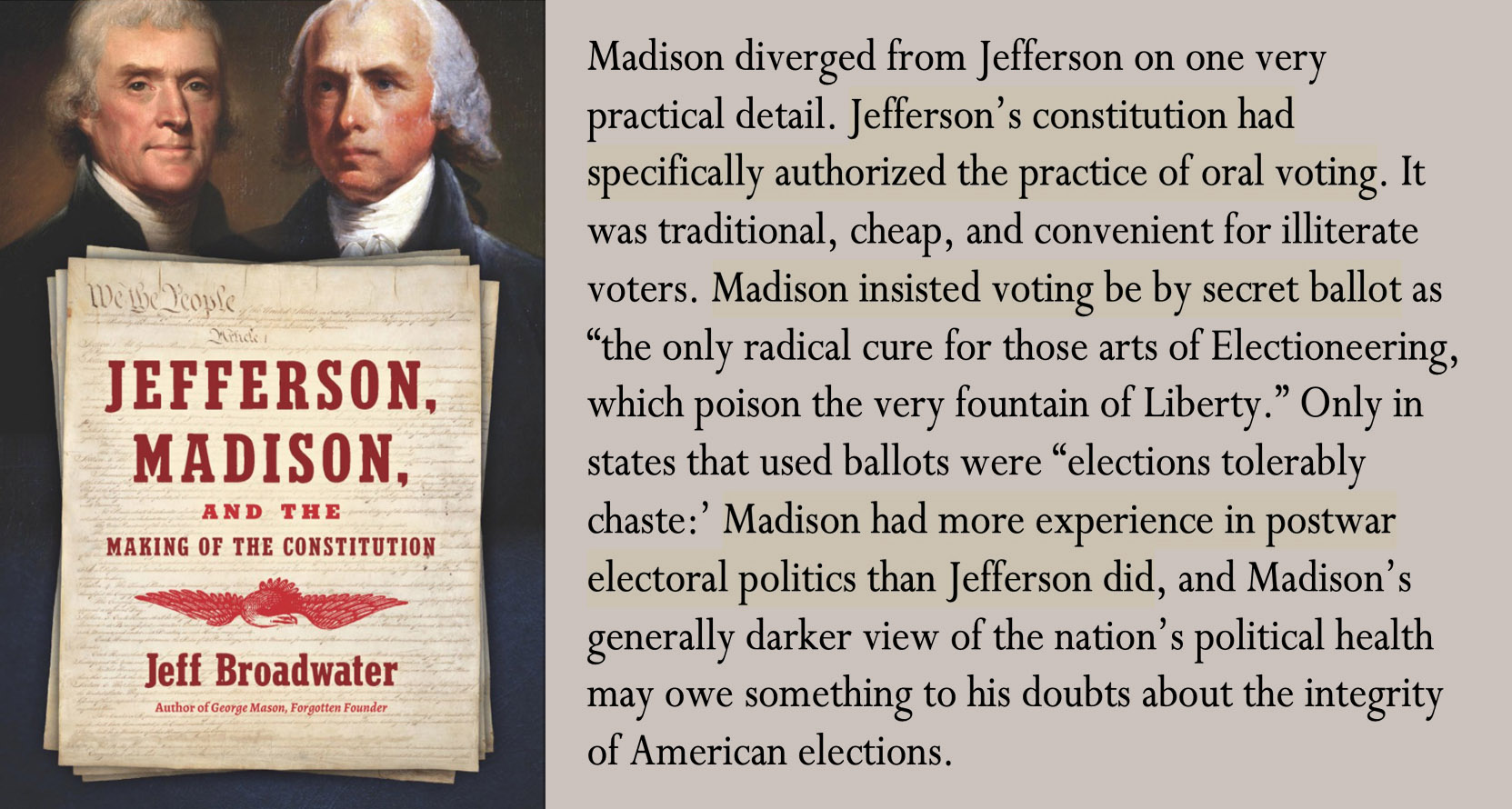
Jeff Broadwater 2019 - Madison vs. Jefferson
Madison diverged from Jefferson on one very practical detail. Jefferson’s constitution had specifically authorized the practice of oral voting. It was traditional, cheap, and convenient for illiterate voters. Madison insisted voting be by secret ballot as “the only radical cure for those arts of Electioneering, which poison the very fountain of Liberty.” Only in states that used ballots were “elections tolerably chaste:’ Madison had more experience in postwar electoral politics than Jefferson did, and Madison’s generally darker view of the nation’s political health may owe something to his doubts about the integrity of American elections.

Jeff Broadwater 2019 - Madison vs. Jefferson
Madison diverged from Jefferson on one very practical detail. Jefferson’s constitution had specifically authorized the practice of oral voting. It was traditional, cheap, and convenient for illiterate voters. Madison insisted voting be by secret ballot as “the only radical cure for those arts of Electioneering, which poison the very fountain of Liberty.” Only in states that used ballots were “elections tolerably chaste:’ Madison had more experience in postwar electoral politics than Jefferson did, and Madison’s generally darker view of the nation’s political health may owe something to his doubts about the integrity of American elections.
(I object) to the Ballot, because it would make that House more democratic than it is already, and (I think) it democratic enough.Sir Robert Peel 1833
Hansard’s Parliamentary Debates*NOTE: The wealthy elite Robert Peel suggests that the problem with the secret ballot is that it would make the government more democratic. To elites, that was surely not a good thing. And while the argument likely has some merit, he does come off sounding a bit like Cicero on this topic.
The anonymous vote, a feature of the Australian ballot, was gradually adopted by all US states during the nineteenth century as a protection against intimidation, bribery, and voter harassment by political organizations and local factions (Fortier and Ornstein, 2002–2003). Denying would-be bribers and intimidators the chance to observe what voters actually did in the voting booth in effect undermined efforts to control vote outcomes. Bruce Cain 2014 (Stanford)
Democracy More or Less
Although open threats against Roman voters seem to have been exceptional, the necessity to vote openly, under the watchful eyes of their superiors, could not fail to hamper the voters’ freedom of choice. A voter might be reluctant to offend not just his patron, but his landlord, or his military commander… The change brought about by the ballot laws must then have been quite significant. Modern scholars have stressed the popular and liberating nature of this legislation, and it has even been described as a manifestation of “a much more genuine popular movement than the Gracchan legislation itself.”Alexander Yakobson 1995
The Secret Ballot and its Effects in the Late Roman Republic
It has been suggested that the ballot laws did not fully ensure the effective secrecy of the voting; the nobles found ways to circumvent the legislation and thus protect their ascendancy.Alexander Yakobson 1995
The Secret Ballot and its Effects in the Late Roman Republic
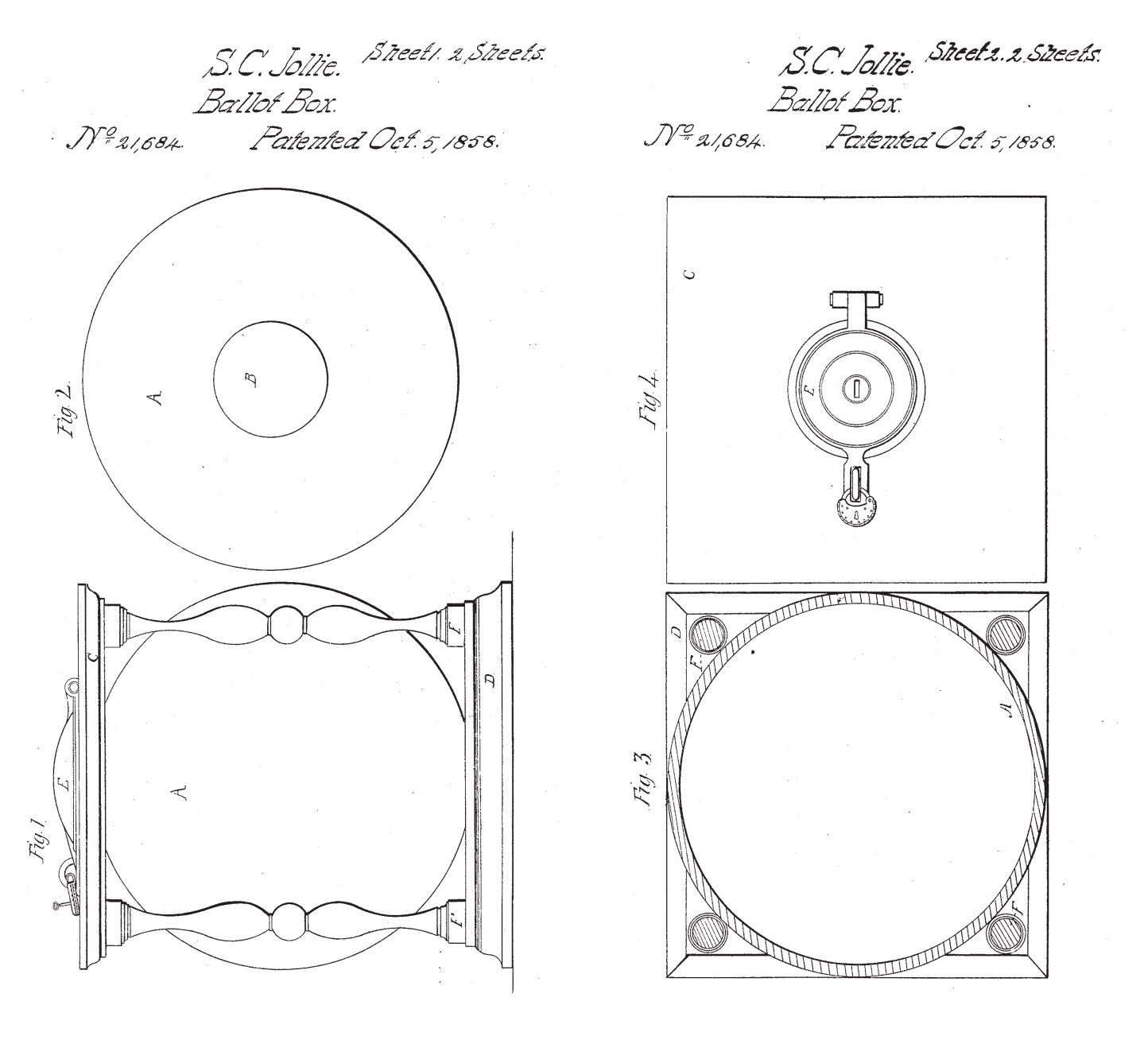
Samuel Jollie Patent Application for Transparent Voting Box 1858

Samuel Jollie Patent Application for Transparent Voting Box 1858
Because most democracies use a secret ballot, citizens can accept the money but vote for whichever candidate they prefer even if their preferred candidate did not offer similar gifts.Ari Pradhanawati, George Towar Ikbal Tawakkal & Andrew D. Garner 2018
Age of Voting their Conscience
The general impression of the new system was positive, with Childers among those rejoicing that the secret ballot had proved ‘thoroughly workable’. In contrast with the unruly behaviour which had often marred previous elections, seasoned observers declared that ‘they never saw a contested election in which less intoxicating liquor was drunk’ and there were no allegations of bribery or other corrupt practices. So quiet and orderly was the town that ‘it hardly seemed like an election’.Kathryn Rix 2013
The First Secret Ballot in Britain
Before the introduction of the secret or Australian ballot following the vote-buying scandals of 1888, the parties printed the ballots, “slip tickets,’ in party-coordinated lengths and colors. (“Big Tim” Sullivan of Tammany Hall perfumed his tickets, “so that they might be tracked to the ballot box by scent, as well as by size, shape, and color.”) Inquisitive party hacks manned the polling places. Like the party snoops monitoring East German plebiscites, they knew who voted and how, and who didn’t vote. Workingmen could vote – but in company towns like Scranton, Pennsylvania, they had to vote right. “Why do you say the poor men here have not the right of suffrage?” the chairman of a House committee investigating the effects of the long depression of 1873-79 asked a Scranton man. “I do not,” he replied, “consider that they have the right of suffrage when a foreman stands at his window and says, as a poor man goes up to cast his ballot, ‘There is another of those God-damned short tickets going in; we will have to see that fellow’; and when, a day or two previous to the election, another man is told that the best thing he can do is to keep his mouth closed. In such cases men have the right of suffrage only in name, not in fact.”Jack Beatty 2008
Age of Betrayal - The Triumph of Money in America, 1865-1900
If an open vote market [for public votes] exists, government policy will be dictated by high income groups.Anthony Downs 1957
An Economic Theory of Democracy*NOTE: This citation comes at the end of a brilliant analyisis by Downs, the full text of which is here: Before answering these questions, we must first examine the peculiar character of the value of voting to an individual. In any large-scale election, a rational voter knows that the probability that his vote will be in any way decisive is very small indeed. Given the behavior of all others, his vote is thus of almost no value to him at all, no matter how important it is to him that party P beat party Q. Consequently he will be willing to sell his vote for a very low price if vote-selling is legal, since money is definitely of value to him. In other words, every rational voter has a low reservation price on his vote. Nevertheless, this does not mean votes would be cheap in an uncontrolled market; their price depends upon demand as well as supply. To explore this matter further, let us assume for the moment that (1) there is no legal restraint on the purchase or sale of votes and (2 ) some kind of negotiable vote certificates are printed up and distributed one to each voter before each election. What will happen? No one voter has much political power—that is why there is a low reservation price. But any voter who can buy up a large number of votes can strongly influence the government’s policy in any area of interest to him. As a result, those desiring such power and possessed of vote-buying capital funds will form a demand for votes. Others not so desirous, or not so endowed with funds, will act as vote-suppliers. It is even possible that there will be keen competition among vote-demanders, so that the price of votes will be driven well above the reservation price of a majority of citizens. If this happens, most low-income citizens will not be able to afford to be buyers but will instead become sellers. Thus no matter which of the competitors finally accumulates enough votes to control government policy, the winner will almost always be a possessor of high income or large capital. In short, if an open vote market exists, government policy will be dictated by high income groups, even if there is severe competition within these groups for dominance over specific policies.
Secrecy, in short, is not disappearing. It remains at the heart of democracy, certainly as it has been practiced in the United States since the adoption of the Australian or “secret” ballot in the 1890s. There is a plausible argument – the English political thinker John Stuart Mill presented it in the mid-nineteenth century – that democracy works better if citizens are publicly held accountable for their votes. But this argument lost out to the concern that public voting subjected relatively powerless individuals to threat, arm-twisting, or bribery by the powerful (notably, employees were vulnerable to coercion by their employers). In designing democracy, a realistic assessment of the consequences of unequal power for the independence of individual voters overcame the conceptual appeal of openness.Michael Schudson
Rise of Right to Know
It is true that in many situations an indigent vote-seller and a wealthy vote-buyer would both gain if the former could sell his vote to the latter. However, in almost every such instance, their gain is someone else’s loss. Anthony Downs 1957
An Economic Theory of Democracy
Some… predicted that the introduction of the secret ballot would lead to the end of the established church, the abolition of the House of Lords, and the end of the monarchy.Tom Theuns 2017
Jeremy Bentham, John Stuart Mill and the Secret Ballot
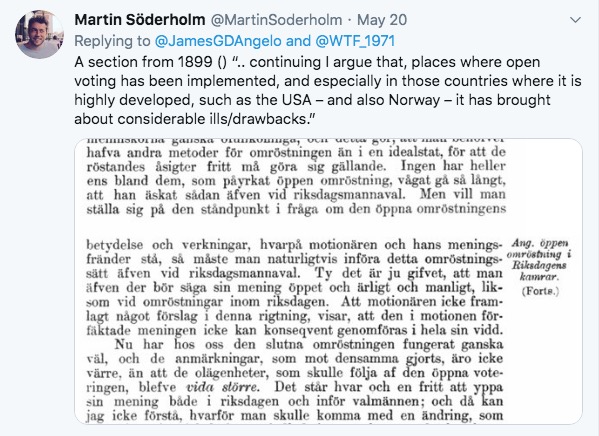
Swedish Parliament 1899 via Martin Söderholm
“in places where open voting has been implemented, and especially in those countries where it is highly developed, such as the USA - and also Norway- it has brought about considerable ills/drawbacks.”

Swedish Parliament 1899 via Martin Söderholm
“in places where open voting has been implemented, and especially in those countries where it is highly developed, such as the USA - and also Norway- it has brought about considerable ills/drawbacks.”
Whether they will support the (secret) ballot… the problem will then be reduced to its simplest terms: Who is for the aristocracy and who for the people.John Stuart Mill 1835
Parliamentary Proceedings of the Session
Without secrecy of the ballot, bribery is unlimited. Democrats will raid Republican and mixed areas, since they can ensure all bribed voters will specifically vote for them. Similarly, Republicans can invade traditionally Democratic and mixed areas, because even if they bribe a Democratic voter, they can be sure of how that person will vote in this election. Voters will not attempt to cheat their bribers because they know their actual vote is public knowledge.Jac C. Heckelman 1988
Bribing Voters without Verification
When it was first introduced, the secret ballot was a key tool used by legislators to eliminate the bribery of potential voters. Political scientists at the turn of the century argued for passage of the law specifically for this purpose (Evans, 1917; Wigmore, 1889). Secrecy of the ballot eliminated the ability to monitor how those bribed voted, thereby eliminating candidates' incentive to bribe.Jac C. Heckelman 1988
Bribing Voters without Verification
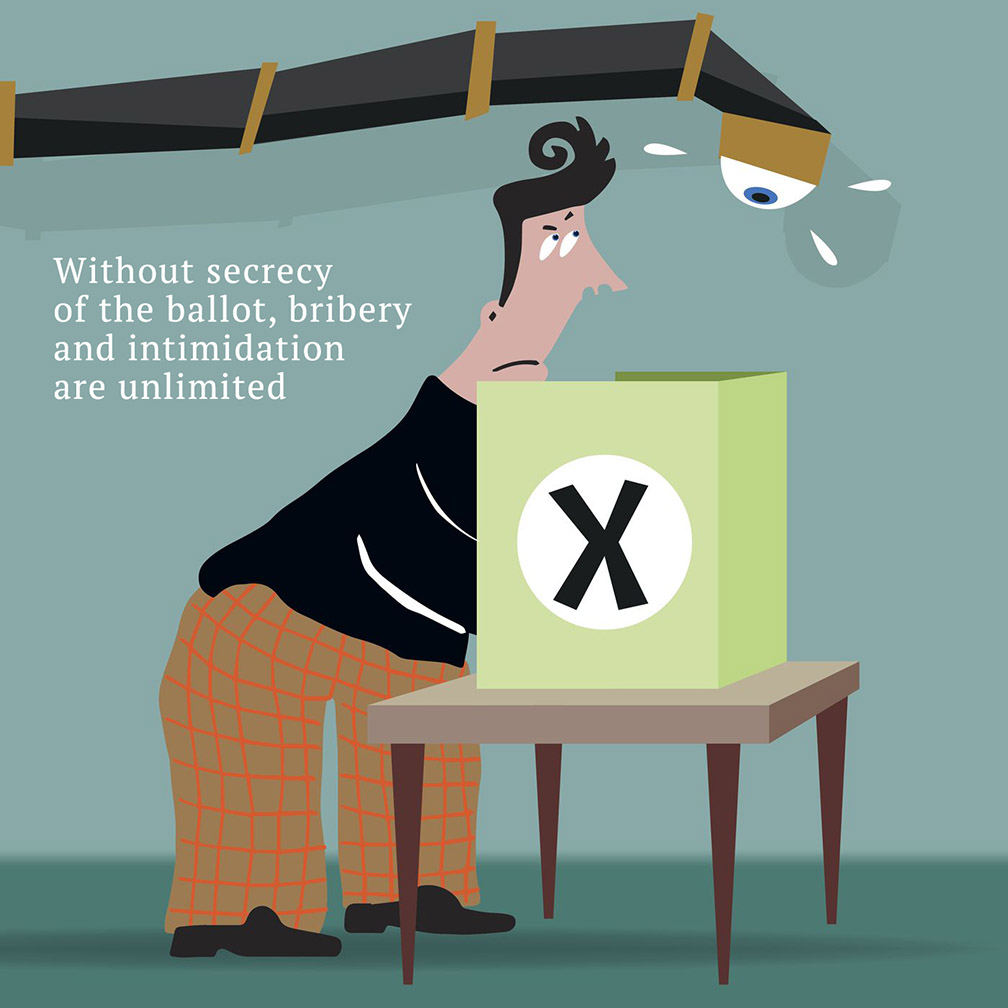
Bribing Voters without Verification 1988

Bribing Voters without Verification 1988
It may, unquestionably, be the fact that if we attempt, by publicity, to make the voter responsible to the public for his vote, he will practically be made responsible for it to some powerful individual, whose interest is more opposed to the general interest of the community than that of the voter himself would be if, by the shield of secrecy, he were released from responsibility altogether. When this is the condition, in a high degree, of a large proportion of the voters, the ballot may be the smaller evil. When the voters are slaves, anything may be tolerated which enables them to throw off the yoke. The strongest case for the ballot is when the mischievous power of the Few over the Many is increasing.John Stuart Mill 1861
Stanford Encyclopedia of Philosophy
The system of secresy has therefore a useful tendency in those circumstances in which publicity exposes the voter to the influence of a particular interest opposed to the public interest. Secresy is therefore in general suitable in electionsJohn Jeremy Bentham 1843
Principles of Judicial Procedure
The point to be made is that Mill’s commitment to secret voting in the thirties was not of an abstract character. Its value was understood strictly within the context of the struggle to establish a viable radical party and to undermine aristocratic political influence.Bruce Kinzer 1978
J.S.Mill and the Secret Ballot
You will soon see the (secret) ballot a cabinet measure, & then reform will have finally triumphed: the aristocratical principle will be completely annihilated, & we shall enter into a new era of government.John Stuart Mill 1837
Mill to Toqueville (Letters of J.S. Mill
The advantages of having the preliminary voting taken on paper [secret ballot] and not openly are, first, that each elector, not knowing exactly how the others are voting, has less inducement to vote contrary to his real opinion, so that a more trustworthy estimate is arrived at of the real opinion of the body of electors, and cyclical majorities are less likely to occur, than with open voting.Duncan Black
The Theory of Committees and Elections 1971
In this struggle against the aristocracy the Philosophic Radicals considered the secret ballot to be of central importance. Intimidation and corruption at elections, which secret voting would eliminate, were employed extensively and effectively by the landed interest. The adoption of the ballot would extinguish this pernicious electoral influence and consequently undermine the political dominance of the aristocracy. But focussing attention on the issue was seen to possess an additional advantage. Assuming that the Whig leadership would join (as they indeed did) the Tories in resisting the enactment of secret voting, their blatantly selfish common interest would stand fully revealed, as would the counterfeit nature of the party political conflict which they sought to perpetuate. Hence the importance attached by the Philosophic Radicals to the ballot.Bruce Kinzer 1978
J.S. Mill and the Secret Ballot
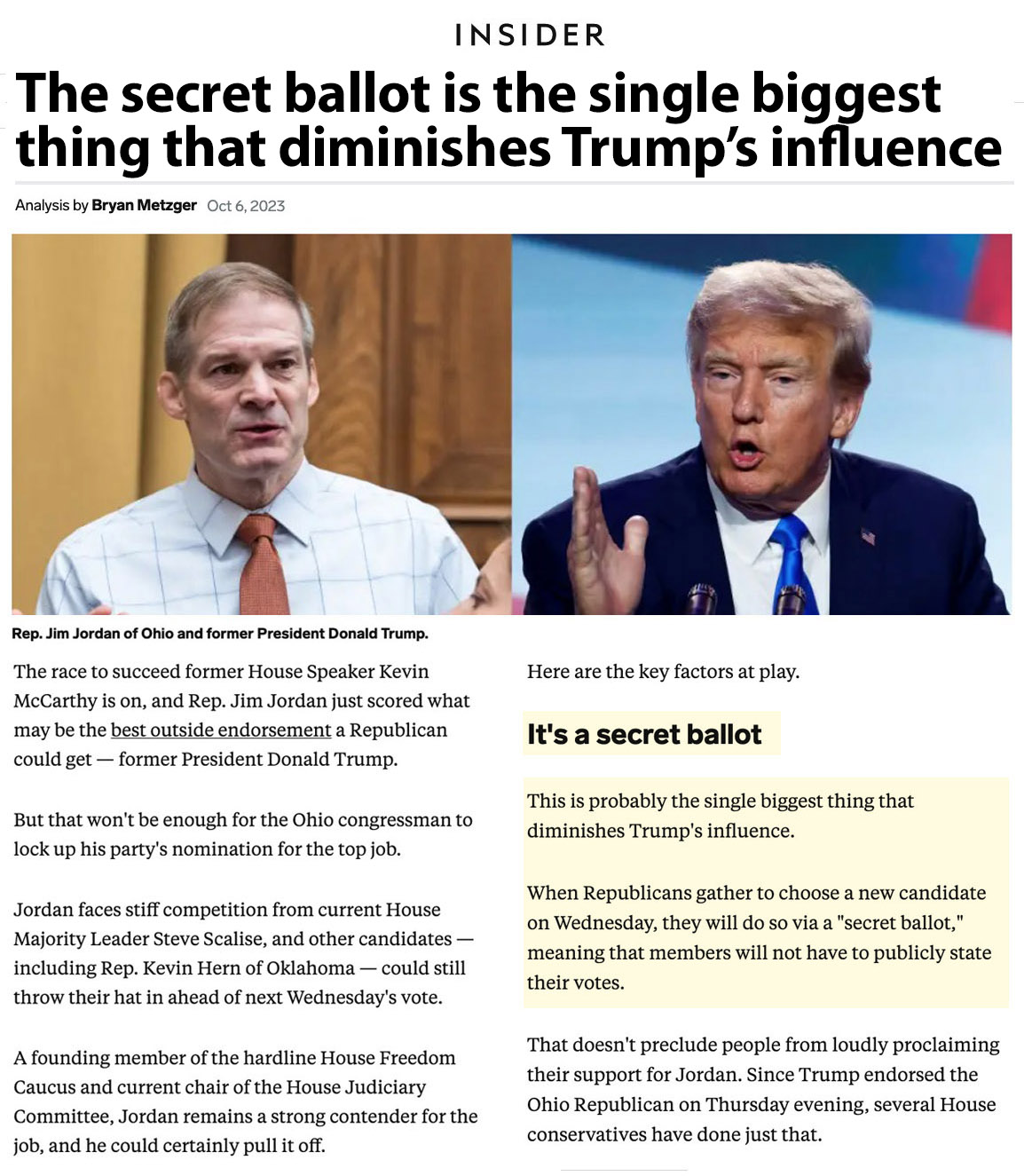
Bryan Metzger 2023 - The secret ballot is the thing that diminishes Trump’s influence

Bryan Metzger 2023 - The secret ballot is the thing that diminishes Trump’s influence
As a consequence of open voting, men who rented their homes, or relied on a local employer for work, had to vote as the property owner or employer wished them to vote. If they didn’t, they would risk losing their home and the job that fed their family. Bribery with money and liquor, drunken fights and threats from candidates, were also common. With electoral malpractice and intimidation clearly rife, politicians of the day recognised that change was needed. John Bright, cabinet member since 1868, and radical speaker and supporter of parliamentary reform, was in favour of a secret ballot to prevent intimidation of workers. Edward Aldam Leatham, husband of Bright’s sister, introduced ‘the ballot bill’ to parliament. The Ballot Act 1872 gave voters the right to privacy, away from the prying eyes of employers and landlords. It gained royal assent in July 1872 as ‘The Act which establishes the Ballot will assist to secure alike the independence of the voter and the tranquillity and purity of elections for members to serve in Parliament’, with the aim ‘to check existing evils’.The Gazette 2022
The Ballot Act 1872: voting in private
This public system of voting had left electors wide open to bribery and intimidation, for example mobs might be brought to polls to bully the voters. In contrast elections could be like a party, where candidates 'rewarded' their voters with large amounts of alcohol. Despite opposition from those who considered secret voting to be "unmanly" and "un-English", the Ballot Act of 1872 introduced the ballot box to counteract bribing of voters.Ros Ball 2015
The sweet history of the secret ballot box
[With the new secret ballots] there were no allegations of bribery or corruption and not even that much unruly behaviour. Observers said they had never seen “a contested election in which less intoxicating liquor was drunk”, and that the town was so quiet and orderly that “it hardly seemed like an election" at all.”Ros Ball 2015
The sweet history of the secret ballot box
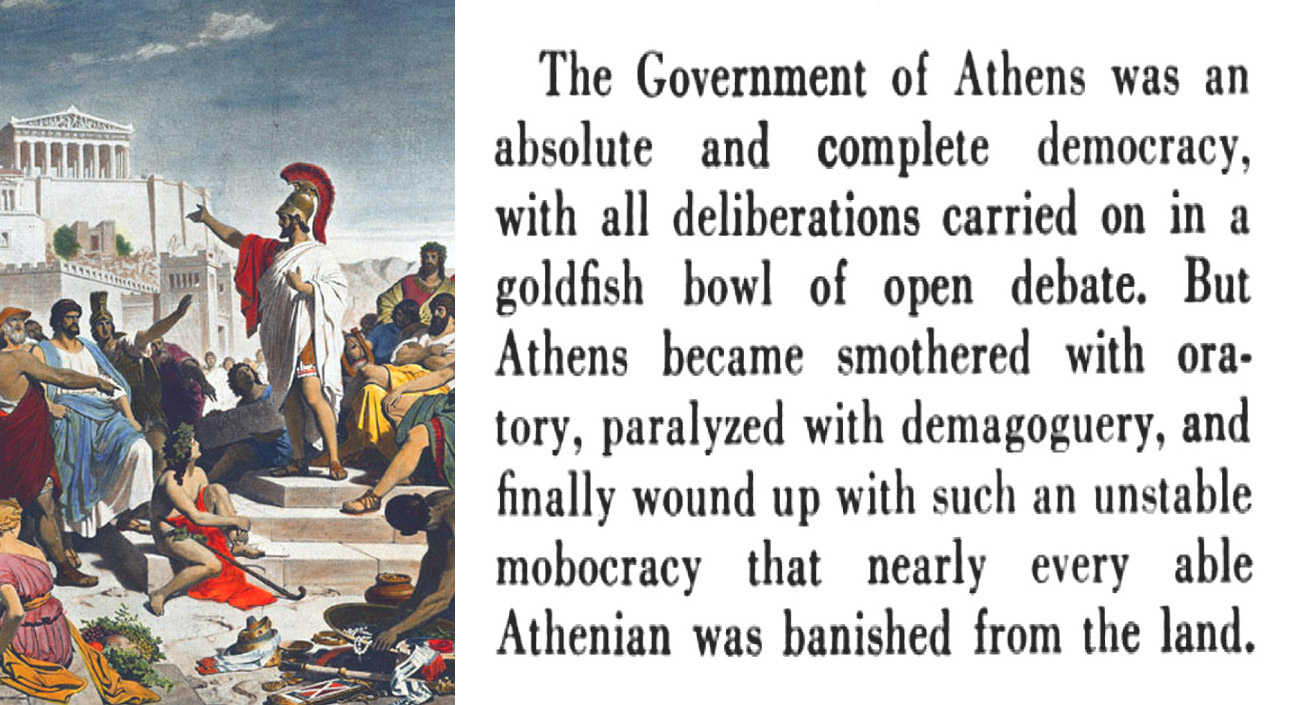
Jenkin Lloyd Jones 1957 on the failure of Greek transparency

Jenkin Lloyd Jones 1957 on the failure of Greek transparency
Certainly the most considerable and perhaps the most important controversy in this connection has been over the question whether the choice of the voter should be made in public or in secret. The dispute goes back more than two thousand years and from the very start has hung on the question whether it is better that the electorate should be guided, even controlled, or be independent. The ballot - remember that in technical discussion the word commonly implies secrecy - the ballot was abolished in Athens by the thirty tyrants when they usurped power. Lysias says in one of his orations that they ordered the suffrages of the Areopagites to be public, in order to manage them as they pleased.Robert Luce 1930
Legislative Principles
[Cicero] feared the ballot because it would diminish the power of the patricians, and like all aristocrats he felt-that safety was to be found only in the supremacy of his own class. In his oration for Sestius he said the people thought their liberty depended on the ballot, but the nobles trembled at the license and daring of the multitude. Time did not remove the fear. Robert Luce 1930
Legislative Principles
An action performed in public is more susceptible to influence by other agents than an action performed in secret is. Therefore those with the most resources at their disposal are in a better position to influence the behavior of others if such behavior takes place in the open than if it is performed in secrecy.Bernard Manin 2015
Secrecy and Publicity
[Concerning the open ballot] As long as the tribes successively passed over narrow bridges and gave their voices aloud, the conduct of each citizen was exposed to the eyes and ears of his friends and countrymen. The insolvent debtor consulted the wishes of his creditor; the client would have blushed to oppose the view of his patron; the general was followed by his veterans, and the aspect of a grave magistrate was a living lesson to the multitude. A new method of secret ballot abolished the influence of fear and shame, of honor and interest… Edward Gibbon 1854
The History of the Decline and Fall of the Roman Empire
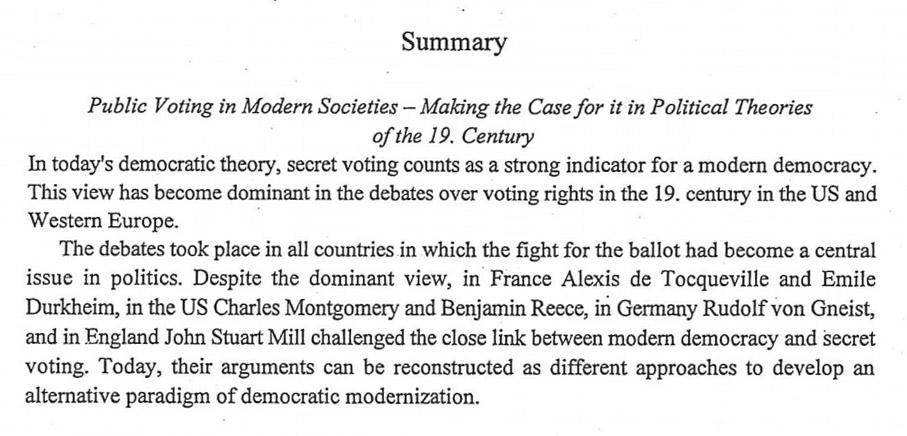
Hubertus Buchstein 2000 - Öffentliche und geheime Stimmabgabe

Hubertus Buchstein 2000 - Öffentliche und geheime Stimmabgabe
The people’s suffrages ought doubtless to be public; and this should be considered as a fundamental law of democracy. The lower class ought to be directed by those of higher rank, and restrained within bounds by the gravity of eminent personages.Charles de Secondat baron de Montesquieu 1802
The Spirit of the Laws
Despite opposition from those who considered secret voting to be "unmanly" and "un-English", the Ballot Act of 1872 introduced the ballot box to counteract bribing of voters.Ros Ball 2015
BBC Parliament: The sweet history of the secret ballot
In sum, an examination of the history of election regulation in this country reveals a persistent battle against two evils: voter intimidation and election fraud. After an unsuccessful experiment with an unofficial ballot system, all 50 States, together with numerous other Western democracies, settled on the same solution: a secret ballot secured in part by a restricted zone around the voting compartments. We find that this wide spread and time tested consensus demonstrates that some restricted zone is necessary in order to serve the States' compelling interest in preventing voter intimidation and election fraud.Bruce Kinzer 1978
J.S.Mill and the Secret Ballot
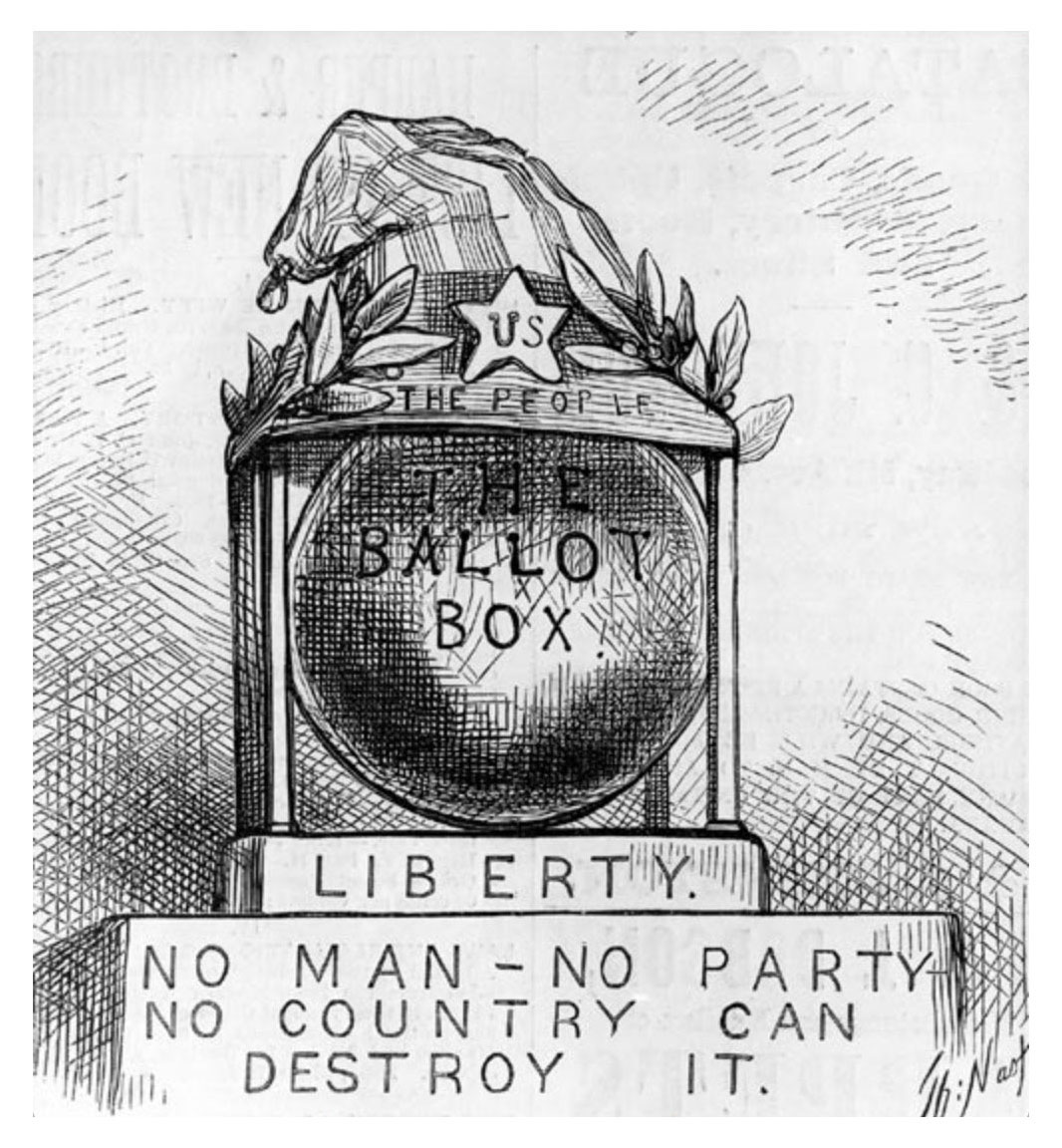
Thomas Nast - The Power of the Ballot Box 1880

Thomas Nast - The Power of the Ballot Box 1880
I have spoken before about the importance and relevance of the Bill. It seeks to tackle the issue of family voting, when two or more people attempt to vote together in a polling booth, potentially leading to someone being intimidated or their decision being influenced. It is vital that voters cast their votes in secret. Once inside the polling station, no one should feel intimidated or be influenced by someone else on which way to vote, or whether to vote at all... The report states that more than 70% of those affected by family voting in the May 2022 elections were women. We must get a grip on this ugly practice. Women should not feel intimidated or have their vote influenced by anyone at a polling station.Paul Bristow 2023
UK Parliament - House of Lords
The people who practise family voting with an intent to intimidate and influence a person’s vote have no respect for the secret ballot. It is wholly inappropriate and is a rising threat to our democratic right to a secret ballot in the UK. We must uphold our values and traditions. Secret voting was introduced just over 150 years ago, in 1872, to tackle many bad practices in elections at that time. The Bill is a continuation of the idea that voting should be done secretly. It will give presiding officers the correct powers to tackle the problem then and there at the polling station. There is only room for one person and one mind at the ballot booth. This Bill will ensure that that is always the case, which makes it a crucial piece in updating and protecting our democracy.Paul Bristow 2023
UK Parliament - House of Lords
I am particularly concerned that family voting and voter intimidation disproportionately affect women in Asian communities. A 2015 Manchester University paper for the Electoral Commission found evidence among interviewees in Pakistani and Bangladeshi-origin communities that hierarchical family structures often mean that women are expected to follow the lead of the head of the household. This creates additional family voting vulnerability, especially among ethnic minority households. That was also the conclusion of the Democracy Volunteers report on the Tower Hamlets election, which found: “Those subjected to family voting…were invariably women…from the Asian community and those causing family voting were generally men”.Scott Benton 2023
UK Parliament - House of Lords
We take the secret ballot for granted, but we have not always had it. Previously, people had to declare for whom they had voted, and they were subjected to all kinds of harassment, intimidation and bullying by, for example, their landowner or employer to vote a particular way. The first attempt to introduce a secret ballot was made in 1853 by Thomas Thompson, the Radical MP. The issue gained more traction in the 1860s, with the secret ballot being established in the 1870s. It has been a fundamental part of our electoral process ever since.Dr Kieran Mulgen
UK Parliament - House of Lords
My one concern is that we have seen rapid growth in the use of postal voting. I support this Bill completely, but, where large households register for and are sent postal votes, there is still the risk of those people being coerced into voting in a particular way, or – even worse – not even voting themselves, but just filling in the identity element, with the head of the household filling in the rest of the ballot papers before they are sent back. That is something we must think about if we wish to safeguard our democracy.Bob Blackman 2023
UK Parliament - House of Lords
[In the days before the secret ballot] an election could not take place without party action. Parties printed up the ballots, or tickets, as they were called, and distributed them. There was nothing particularly secret about the ballots; while a few citizens might prepare their votes at home, “vest-pocket voters” were few. Most people gave away their preference by approaching the party agents peddling tickets to any comers and sometimes calling over those on whose vote they counted. Sometimes voters marched to the polls in brigade formation, under ward leaders, and now and then managers provided a brass band, a barbecue, or refreshments. Election judges were chosen by the parties, and so were the poll watchers, who scrutinized the lists and challenged suspicious-looking voters. Ballots were designed to make maverick voting difficult.Mark Wahlgren Summers 2010
Party Games: Getting, Keeping, and Using Power in Gilded Age Politics
At the time of Lincoln’s election, there was no secret ballot anywhere in the United States. The candidates were responsible for printing and distributing their own ballots and that in order to distribute valid ballots for a presidential election in a state, candidates needed citizens eligible to vote in that state who would pledge to vote for the candidate in the Electoral College. This meant that even if a voter had access to a ballot for Lincoln, casting one in favor of him in a strongly pro-slavery county would incur (at minimum) social ostracization (of course, casting a vote for Breckinridge in a strongly abolitionist county ran a voter the same risk). In ten southern slave states, no citizen would publicly pledge to vote for Abraham Lincoln. In most of Virginia, no publisher would print ballots for Lincoln's pledged electors.Wikipedia
Lincoln and the Public Voting Problems of 1860
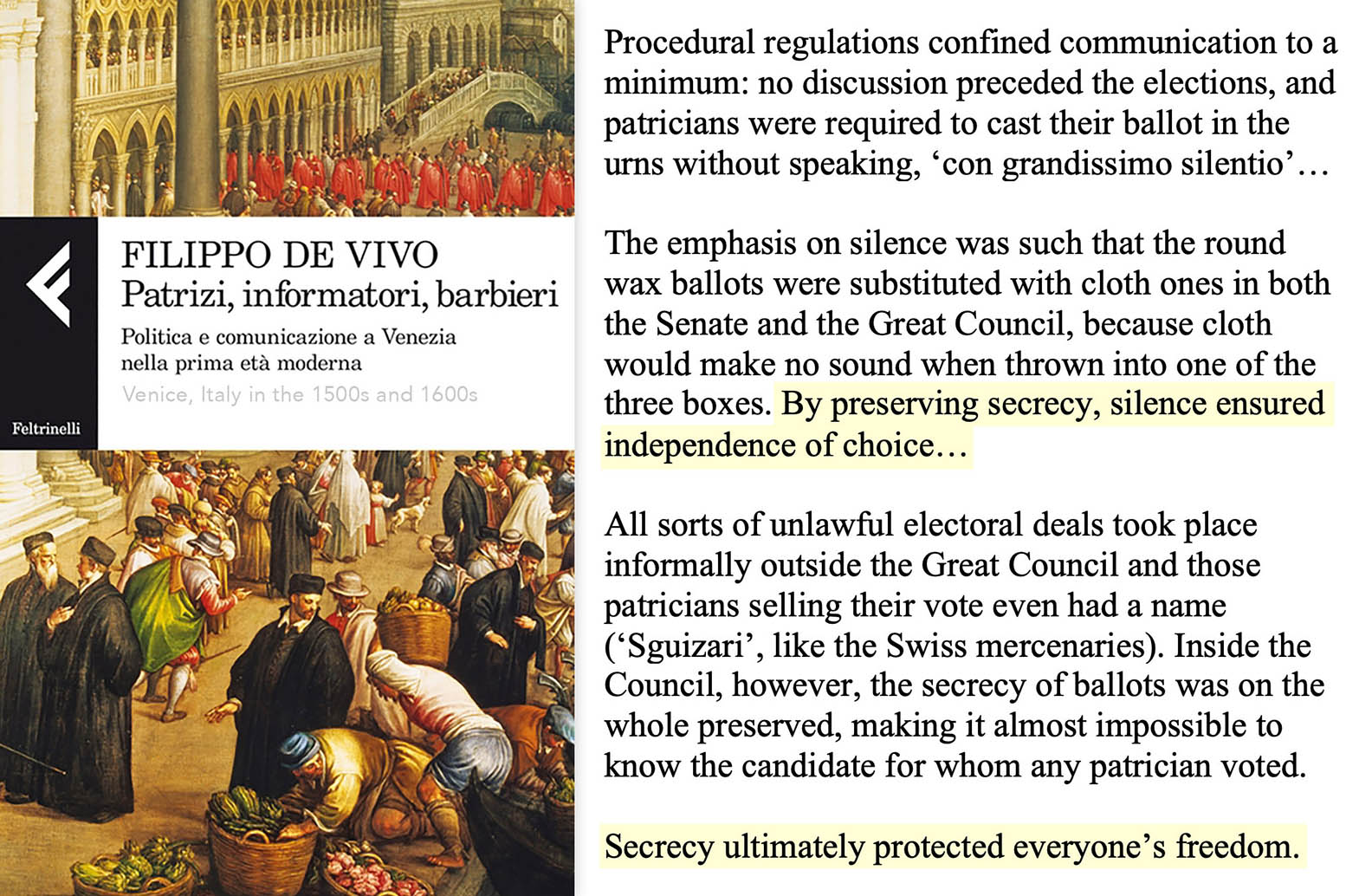
De Vivo 2007 - Information and Communication in Venice
Procedural regulations confined communication to a minimum: no discussion preceded the elections, and patricians were required to cast their ballot in the urns without speaking, ‘con grandissimo silentio’…The emphasis on silence was such that the round wax ballots were substituted with cloth ones in both the Senate and the Great Council, because cloth would make no sound when thrown into one of the three boxes. By preserving secrecy, silence ensured independence of choice…All sorts of unlawful electoral deals took place informally outside the Great Council and those patricians selling their vote even had a name (‘Sguizari’, like the Swiss mercenaries). Inside the Council, however, the secrecy of ballots was on the whole preserved, making it almost impossible to know the candidate for whom any patrician voted. Secrecy ultimately protected everyone’s freedom. (Patrizi, informatori, barbieri)

De Vivo 2007 - Information and Communication in Venice
The 1860 presidential election was the only occasion where a winning candidate was so unpopular in a particular region that it was impossible to organize and print ballots in every state. Since 1860, Republican presidential candidates have managed to poll votes in every state (other than unreconstructed Southern states prior to 1872) whereas national Democratic candidates have occasionally failed to appear on all state ballots.Wikipedia
Lincoln and the Public Voting Problems of 1860
Elites often spent thousands of pounds in bribes and other inducements to ensure their preferred electoral outcome and the lack of a secret ballot facilitated intimidation and vote-buying.Sheri Berman 2019
Democracy and Dictatorship in Europe
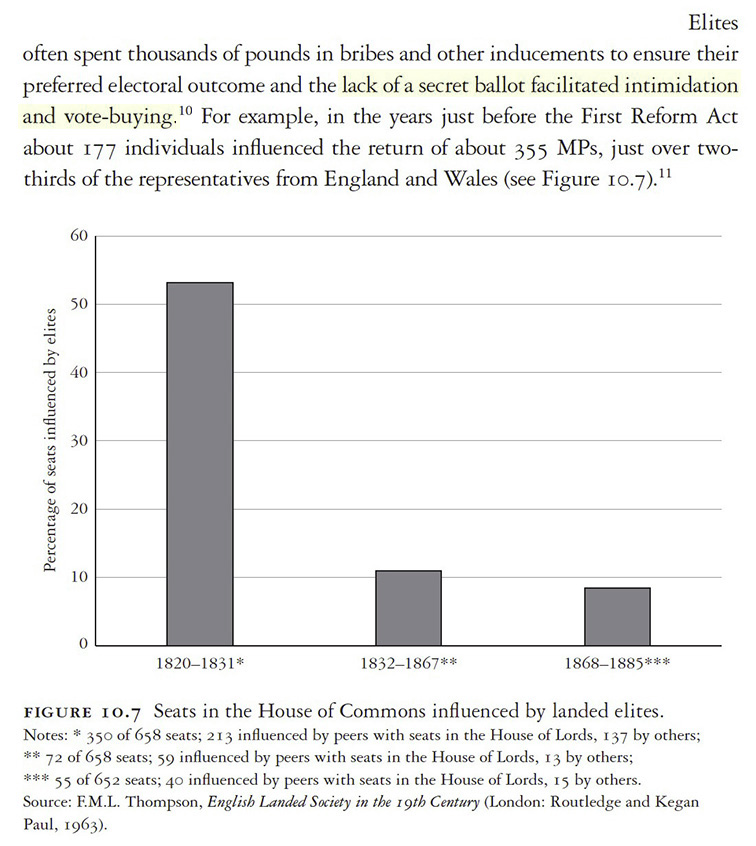
Sheri Berman 2019 - Democracy and Dictatorship in Europe

Sheri Berman 2019 - Democracy and Dictatorship in Europe
The British working class, however, remained disenfranchised and did demand further reforms after 1832.38 The main vehicle for working-class agitation during this time was Chartism, which got its name from the 1838 “People Charter” calling for universal manhood suffrage, the secret ballot, the abolition of property requirements to serve as MPs, payment for MPs, equal electoral districts, and annual parliamentary elections.39Sheri Berman 2019
Democracy and Dictatorship in Europe
Most critically, votes in the People’s Courts that heard graphes were secret. Discussion among the jurors during vote-casting was prohibited, and each man held two slightly different bronze discs, one representing a vote for the accuser and one for the defendant. Ballots were cast into one of two urns, a bronze one for the vote intended to be valid and another for the discard. Since the bronze disks could be concealed in the hand, voting was very effectively anonymous and therefore independent. The importance of this was clearly recognized at the time...Secrecy would prevent the voters from being intimidated; bribery or logrolling would be almost impossible to implement because of the large number of voters.Sandra Peart, David M. Levy 2013
F. A. Hayek and the Modern Economy
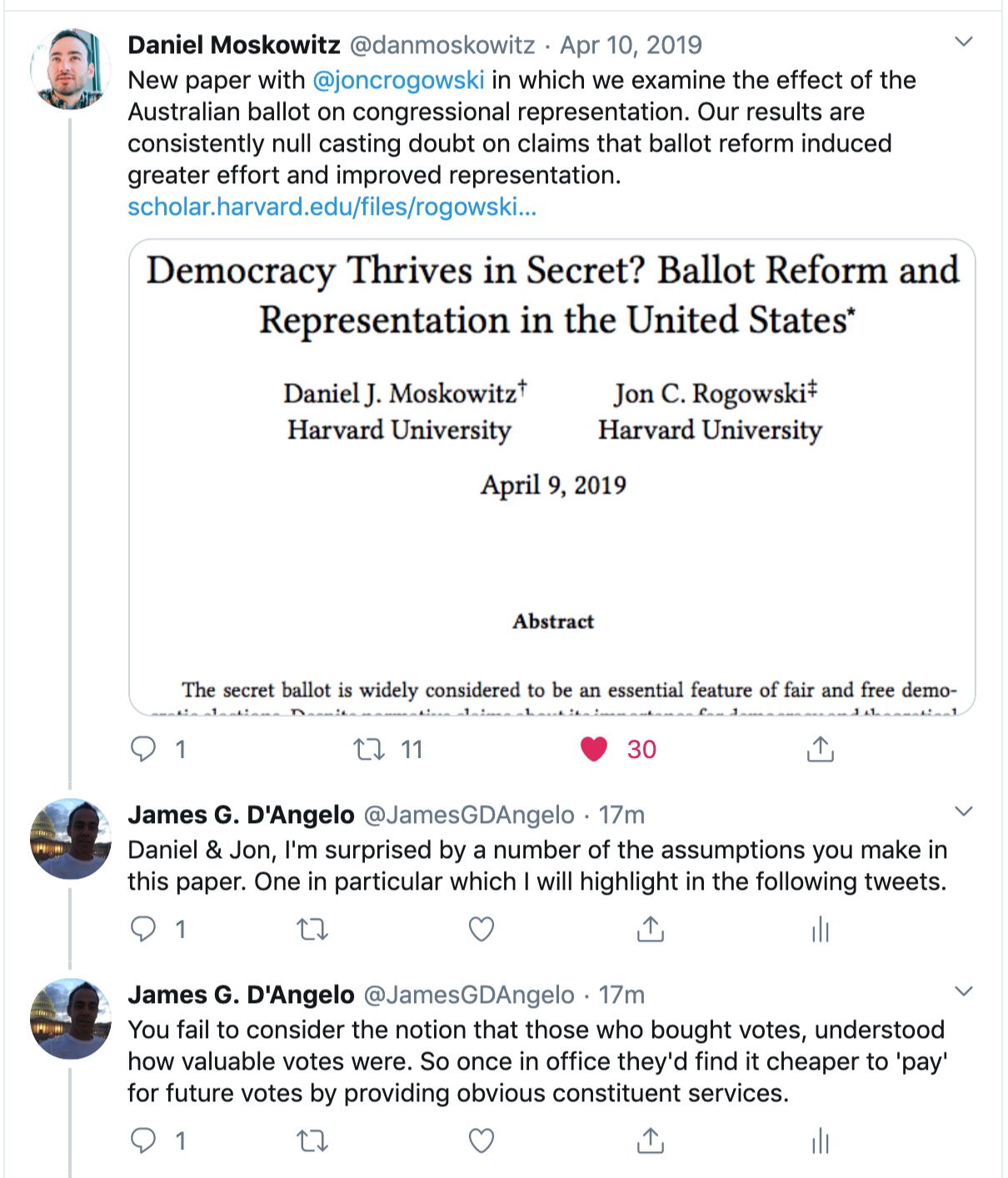
Response to Moskowitz & Rogowski on their misleading 2019 paper “Transparency Thrives in Secret? Ballot Reform and Representation in the United States”

Response to Moskowitz & Rogowski on their misleading 2019 paper “Transparency Thrives in Secret? Ballot Reform and Representation in the United States”
That we all can vote is a consequence of nineteenth-century politics. That we vote secretly is the Gilded Age’s answer to universal manhood suffrage.Jill Lepore 2008
Rock, Paper, Scissors
The people should not have been provided with a hiding-place, where they could conceal a mischievous vote (vitiosum suffragium) by means of the ballot, and keep the boni (aristocracy) in ignorance of their real opinions.Cicero 50 BC
De Legibus
By weakening the connection between legislators and the parties, the ballot reforms (of the late 1800s) created an environment that made it possible for future legislators to assert even greater independence from their parties. Jamie Carson & Joel Sievert 2015
Electoral Reform and Changes in Legislative Behavior
Perverse accountability – the ability of parties to monitor constituents’ votes, reward them for their support and punish them for defection – is what sustains machine politics.Susan C. Stokes 2005
Perverse Accountability
Neither postal votes [mail in votes] nor Internet votes can guarantee that the vote is cast in secrecy without intimidation or pressure.Vollan, Kåre 2006
Voting in uncontrolled environment and the secrecy of the vote
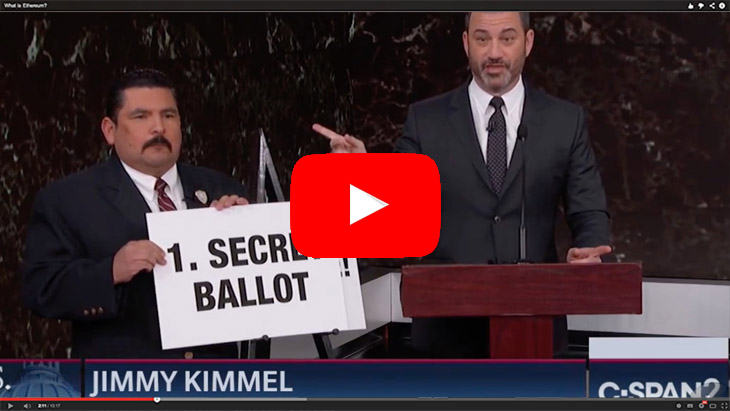
Jimmy Kimmel 2020 - Advocates Secret Ballot Senate Votes

Jimmy Kimmel 2020 - Advocates Secret Ballot Senate Votes
The (secret) ballot was said to have discouraged the introduction or the spread of bribery. Many witnesses agreed that secret voting was effective in this respect; and a few declared that bribery was driven entirely from their constituencies. Charles Seymour 1915
Electoral Reform - The Final Attack Upon Corruption
Efforts were made to curb the increasing role of money in politics. Secret ballots were introduced to render bribes less effective.Tony O’Connor 2021
How Inequality Killed the Roman Republic
The [Nigerian] government also announced that it would continue to use the so-called "open ballot," according to which voters line up behind photos of the candidates of their choice, even though this inherently coercive system had failed to eliminate fraud in elections in 1991.Human Rights Watch 1993
Human Rights Developments in Nigeria
If corruption was to be eliminated, the efforts of the legislators could not be confined to an improvement in the method of discovery and punishment. Steps must be taken which would prevent corrupt practices in the first place, by rendering them useless. And some means must be found for the protection of the voter from intimidation, that form of corrupt influence which it was almost impossible to prove after the act, and which invariably escaped punishment. Such a remedy, the Radicals asserted, was to be found only in the substitution of secret for open voting; by secret voting alone could bribery and intimidation be stopped, because under the system of secret voting the wealthy and influential would be unable to discover the exact results of either their threats or their financial outlay.Charles Seymour 1915
Electoral Reform - The Final Attack Upon Corruption
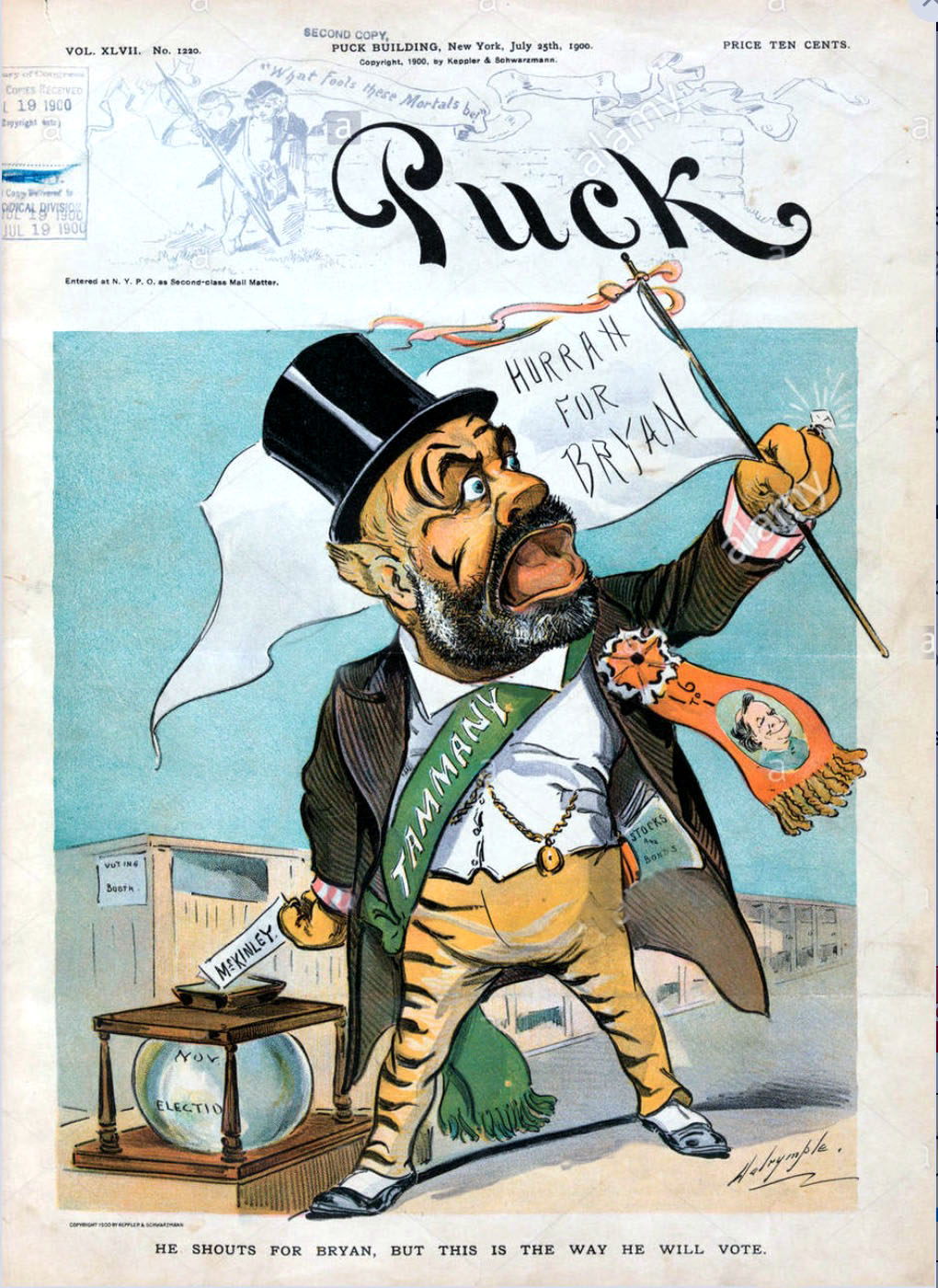
Puck Magazine - Richard Croker voting for Bryan - 1900

Puck Magazine - Richard Croker voting for Bryan - 1900
Examining the consequences of electoral reforms adopting the Australian ballot in Chile in 1958, Baland & Robinson (2008) find that secret ballot reforms reduced the vote share of right-wing conservative parties by reducing the influence of landowners over their workers and subsequently the benefits that landowners received in exchange (Baland & Robinson 2012). Isabela Mares & Lauren Young 2016
Buying, Expropriating, and Stealing Votes
The secret ballot had long term effects on curbing bribery.Ashley C. Wall 1872
The Money of Politics: Financing American and British Elections
It seems clear that at Leeds in 1832 both sides had gone to considerable lengths to surround themselves with bands of burly bodyguards, partly to ensure their personal safety, but also to intimidate their opponents. There was nothing unusual in this. At Bristol it was commonplace for candidates to hire ‘bludgeon men’, such as prize fighters or local shipwrights, to guard the steps to the city’s Guildhall, where the poll was held. Their role was simple: to chase off the other side’s hired muscle and then to assault any voter suspected of being opposed to their man.Jon Lawrence 2009
Electing Our Masters: The Hustings in British Politics from Hogarth to Blair
The introduction of political institutions that stop corruption and vote buying, such as the Australian (secret) ballot, appear to be as significant a step in the process of political development as the construction of electoral democracy itself.Jean-Marie Baland & Jim Robinson 2007
How Does Vote Buying Shape the Economy?
One robust finding of the literature examining clientelism in both historical and contemporary settings is that the protection of voter secrecy affects clientelistic strategies. Threats of postelectoral punishments of voters are extremely powerful if electoral secrecy is imperfectly protected (Mares 2015). This suggests that the use of strategies of intimidation should be higher when electoral secrecy is insufficiently protected but that their use should decline after legislation protecting voter secrecy is adopted.Isabela Mares & Lauren Young 2016
Buying, Expropriating, and Stealing Votes
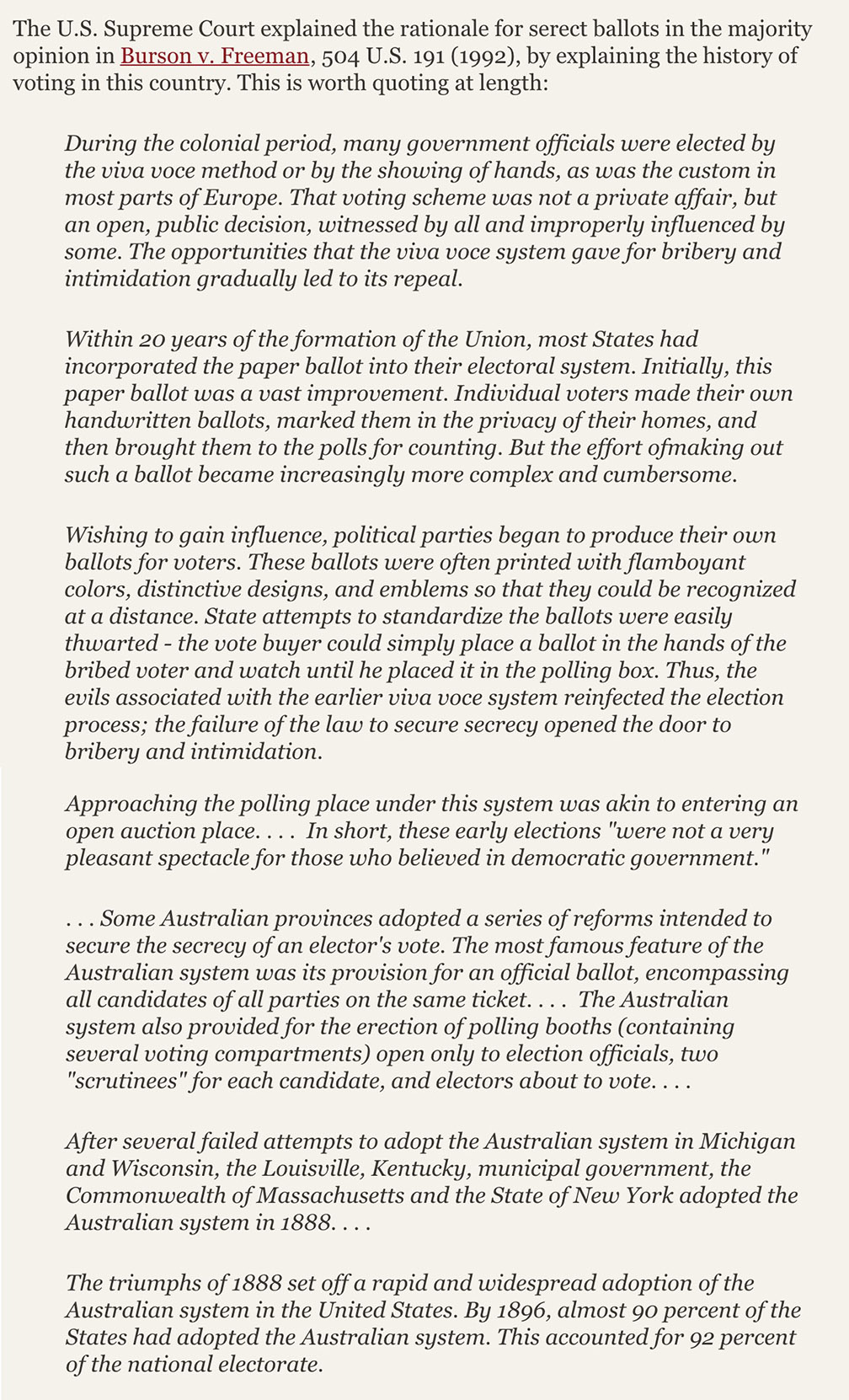
US. Supreme Court - Burson v. Freeman, 504 191 1992

US. Supreme Court - Burson v. Freeman, 504 191 1992
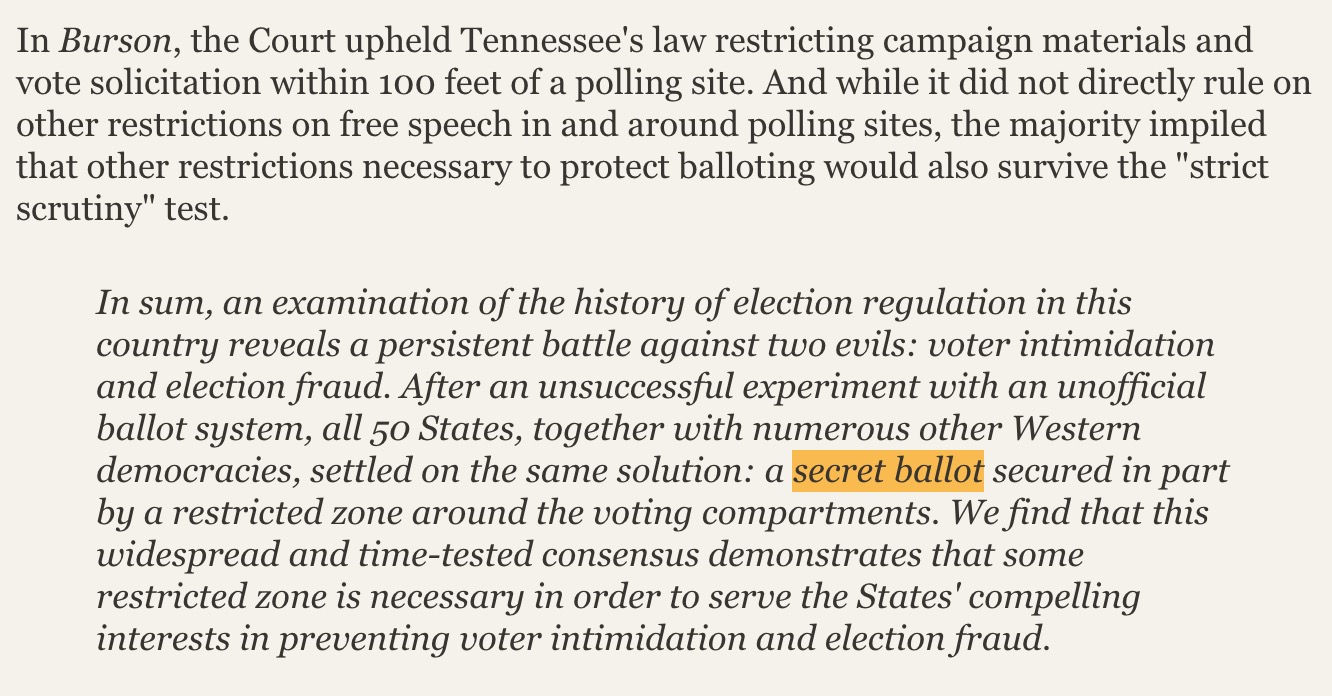
US. Supreme Court - Burson v. Freeman, 504 191 1992

US. Supreme Court - Burson v. Freeman, 504 191 1992
For example, in Peterson v. City of San Diego (1983) 34 Cal.3d 225, 193 Cal.Rptr. 533, 666 P.2d 975 (Peterson ), our Supreme Court held the constitutional provision that voting shall be secret was not violated by a municipal election conducted entirely by mail ballot. The plaintiff argued article II, section 7, should be interpreted to require not only that the voter's right to secrecy be protected by election procedures but also that the voters be required to cast their votes in secret. (Id. at p. 227, 193 Cal.Rptr. 533, 666 P.2d 975.) The plaintiff argued that, unless the voter was required to cast his ballot in secret (at a polling place), the voter may demonstrate to another person how he voted (and therefore could sell his vote). “‘By compelling the dishonest man to mark his vote in secrecy, it renders it impossible for him to prove his dishonesty and thus deprives him of the market for it.’” (Peterson, supra, 34 Cal.3d at p. 227, 193 Cal.Rptr. 533, 666 P.2d 975, citing Wigmore, The Australian Ballot System (2d ed. 1889) pp. 50-51.)California Supreme Court 2006
Bridgeman v. McPherson
We do not, however, embrace transparency in all aspects of government. Citizens vote by secret ballot to protect their votes from outside influence. [Why?] Some individuals have more money than others. Some work odd hours and are more inconvenienced by getting to the polls on election day. Some run crime syndicates and can threaten anybody that approaches the polls. We do not think that these qualities entitle those individuals to greater political influence.Astral Codex 2023
Book Review: Secret Government
Cox & Kousser (1981) examine the consequences of the adoption of the secret ballot in the state of New York during the period between 1879 and 1900 and find that this change in electoral law contributed to a change in the strategies pursued by parties. Prior to the adoption of the secret ballot, electoral strategies of parties were “inflationary,” attempting to increase voter turnout. After the secret ballot reform, the strategies of parties were “deflationary” and consisted of efforts to convince voters to stay home on election day.Isabela Mares & Lauren Young 2016
Buying, Expropriating, and Stealing Votes
The Australian (or secret) ballot was introduced in Massachusetts in 1888; it proved so popular that most states instituted it within four years, all within eighteen. The device promised to end intimidation and corruption at the polls. Straight-arm voting—in which floaters were lined up, paid, and marched to the voting box with a colorful party ballot held out in the ward heeler's view—was rendered impossible.James Morone 1990
The Democratic Wish
Kenyans this week were forced for the first time to forsake the secret ballot in a national election and instead line up in public behind a photograph of the candidate of their choice. The law establishing the new queuing system was pushed through Parliament last year by Kenyan President Daniel arap Moi over the objections of church leaders, the Kenyan law society and several prominent politicians, who argued that it would intimidate voters and stifle freedom of choice. The new system, which Moi has promoted as a method particularly well-suited to Africans, revives a British colonial practice that was alleged to have resulted in public intimidation to assure the election of chiefs sympathetic to the colonial government.Blaine Harden 1988
Kenyan President Abolishes the Secret Ballot
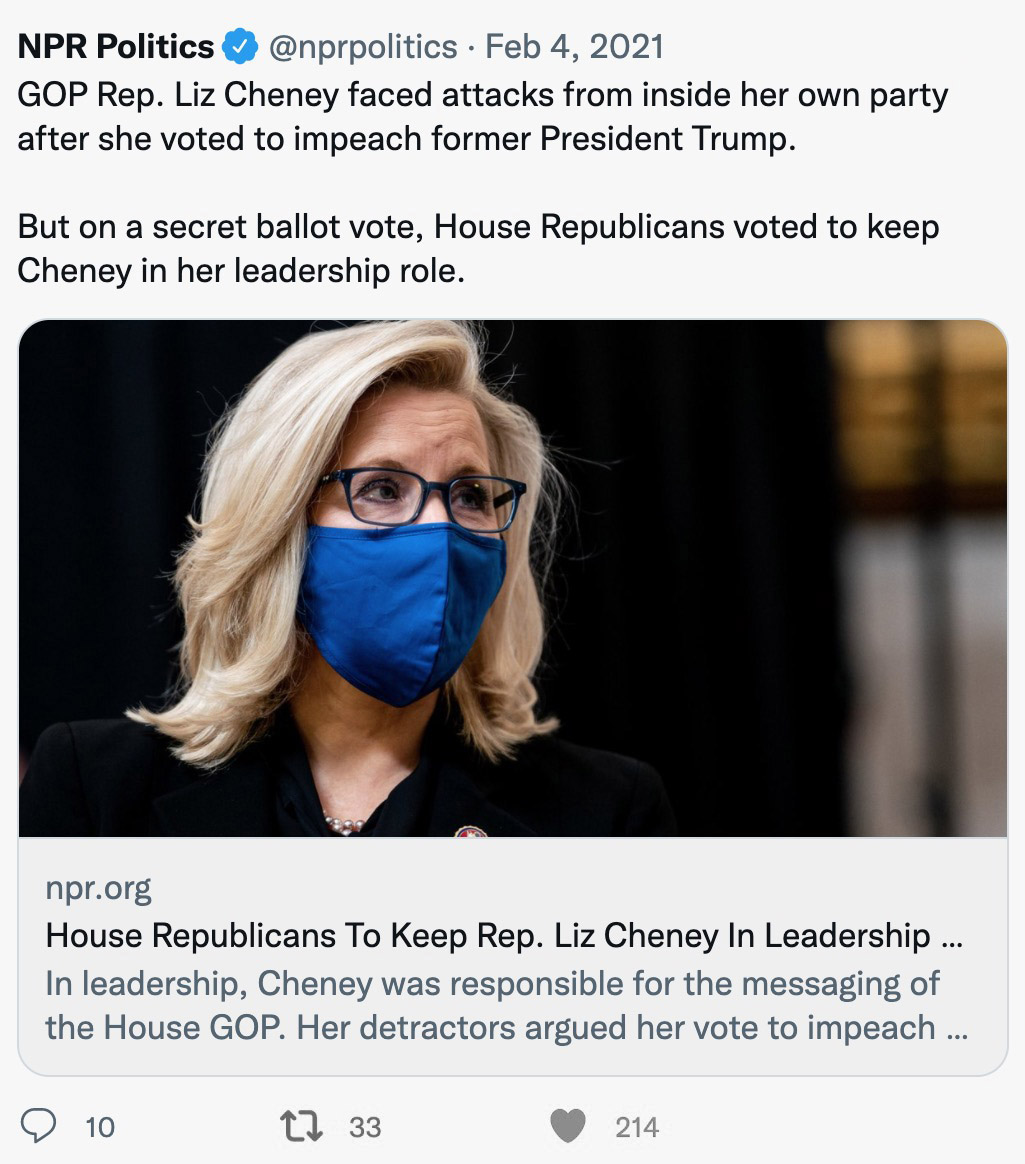
2021 Liz Cheney retains leadership role via secret ballot despite attacks on Trump

2021 Liz Cheney retains leadership role via secret ballot despite attacks on Trump
One of the most important ingredients in a democracy is the secret ballot. A true democracy emphasizes the will of the people, and secret voting ensures this. The U.S. government guarantees “Every American. ..the right to a secret ballot so that no one – not husband or wife, not parents, not employer – knows how a voter votes.” This secrecy enables citizens to express their private opinions freely without infliction of even the subtlest influence and without fearing reprisal from those who vote or think differently.Ira P. Robbins 2006
The Importance of the Secret Ballot
If the American framers had been seriously concerned with vote buying or with the pressure the wealthy could exercise on their clients, they, too, could have proposed a secret ballot.Jon Elster 2013
Securities Against Misrule
Article 21 of the Universal Declaration [of Human Rights] provides for ‘periodic and genuine elections…by universal and equal suffrage and…by secret vote’ as the only process by wich democracy can be attained.Reginald Eztah 1997
The Right to Democracy: A Qualitative Inquiry
Secrecy is justified in many cases, imperative in some, and it is not cowardice to seek protection against evils which are honestly avoidableJohn Stuart Mill 1861
Mill and the Secret Ballot: Beyond Coercion and Corruption*NOTE: Mill is perhaps the most famous propent of the open ballot, as in he did not appear to support the secret ballot, so this is quite a concession.
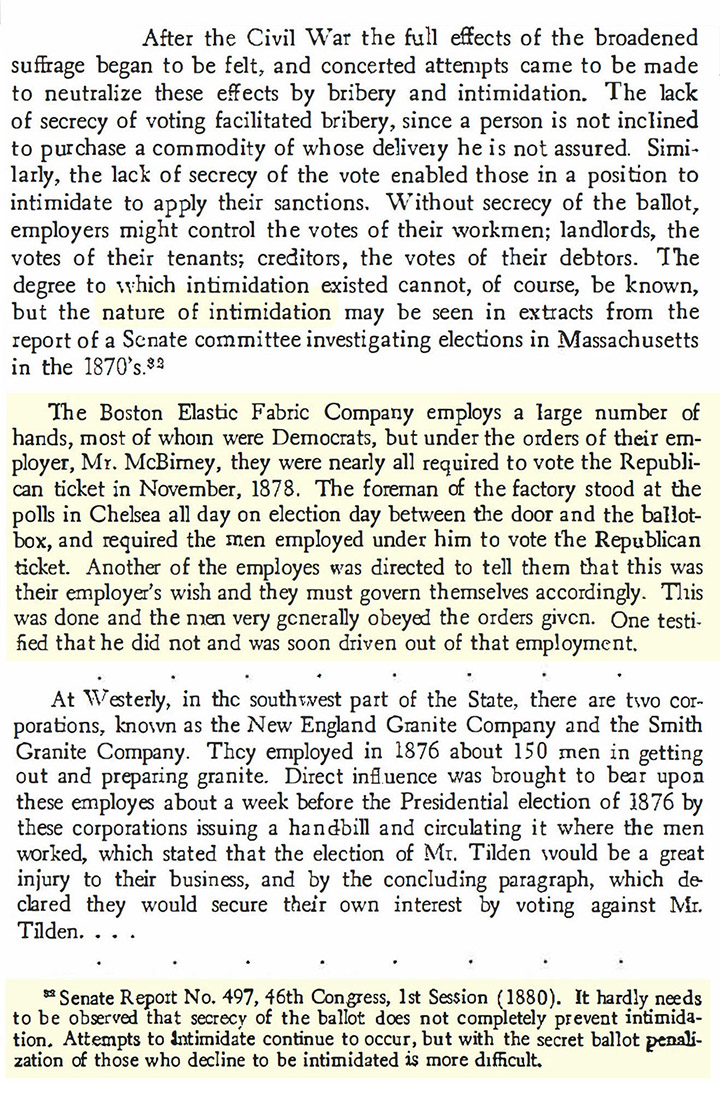
V.O. Key 1947 - Politics, Parties, & Pressure Groups
The footnote here is interesting because of the date. Written in 1880 (a full ten years before the US began to move toward the secret ballot), the Senate sees clear ties with secrecy and the prevention of intimidation. And the main text suggests that intimidation (and not bribery) was the central reason for increased voter attendence when the ballot is not secret.

V.O. Key 1947 - Politics, Parties, & Pressure Groups
The footnote here is interesting because of the date. Written in 1880 (a full ten years before the US began to move toward the secret ballot), the Senate sees clear ties with secrecy and the prevention of intimidation. And the main text suggests that intimidation (and not bribery) was the central reason for increased voter attendence when the ballot is not secret.
There was no secret ballot and votes were usually cast publicly. Where opposition emerged, it was often suppressed by fraud and violence.Smith, J. & Vinhosa, F. 2002
History of Brazil
There is not a lot of research about bribery and coercion in mail-in elections in the U.S. But two surveys undertaken taken after Oregon introduced universal vote by mail in 1998 found that as many as a third of voters completed their votes while others were present. Just 1%, or fewer, reported feeling pressured by the presence of another person. But that may still be enough to tip a close election. There are other warning signs that electoral coercion remains a threat in the U.S. In recent years, impoverished and otherwise vulnerable citizens in Appalachia and Texas have been paid for their votes. In 2018, the results of a North Carolina congressional election was overturned because political operatives filled out ballots on behalf of voters, without their consent.Susan Orr & James Johnson 2020
Perils of voting without secrecy
And in the last two presidential elections, as many as 1 in 4 workers was approached with political information by their employer. Some of that was innocuous or nonpartisan material about registering to vote or company rules about time off to vote. But it also included employer endorsements of referenda or candidates – and even notes in employees’ paychecks threatening layoffs or plant closures if one particular candidate were to win. Without the secret ballot system blocking landlords and company executives from monitoring tenants’ and workers’ votes, these predictions and warnings could become enforceable threats and meaningful bribes.Susan Orr & James Johnson 2020
Perils of voting without secrecy
The Act of 1872 providing for a secret ballot had, moreover, done away with the main possibility of corruption.Maurice Bond & Horace King 1966
The History of Parliament
He believed that the Petition was calculated to promote the advance of a Question which of late years had made great progress in the public mind – he alluded to the Question of the [Secret] Ballot. He was one of the few persons who many years ago had advocated the Ballot as the best security for the honesty of the elective body. Certain he was, that wherever there was wealth it would be employed to seduce, and wherever ther was power it would be employed to coerce the honesty of voters, and this was a remarkable example of the manner in which wealth and power combined, had been used to obstruct the conscientious voters of Preston.Great Britain Parliament 1835
Hansard’s Parliamentary Debates
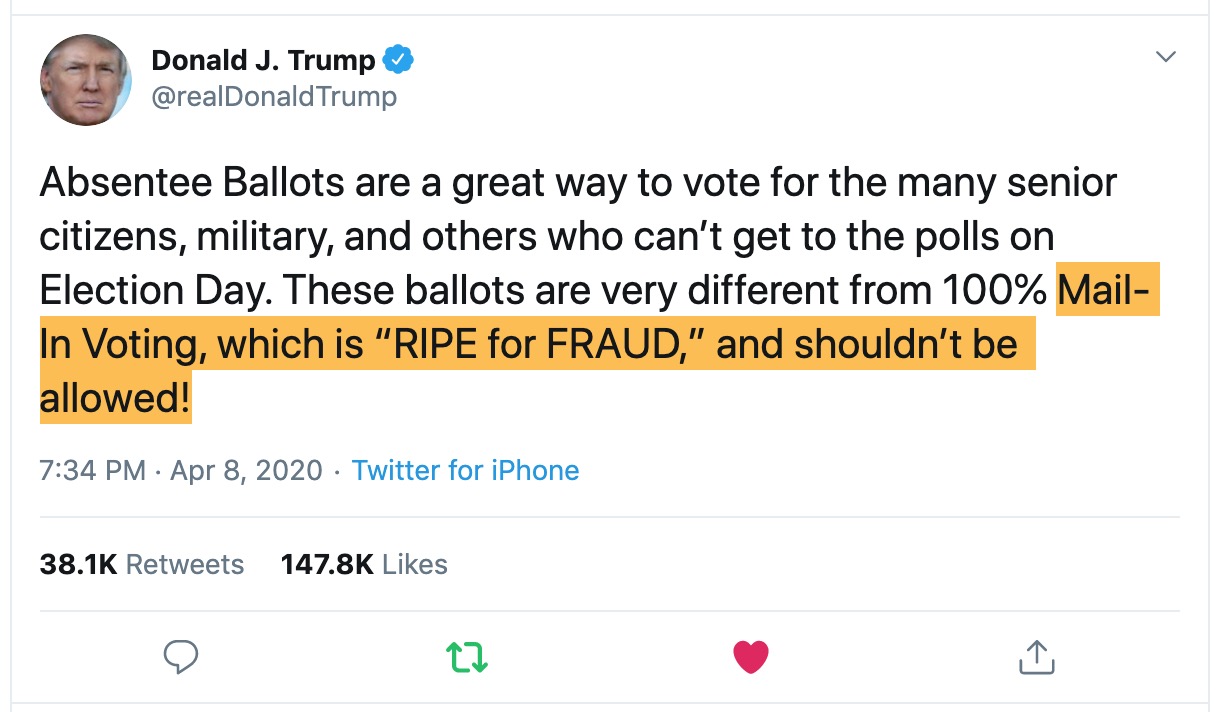
Donald Trump 2020 - Cautious about open voting systems

Donald Trump 2020 - Cautious about open voting systems
“The secret ballot is really profound — it’s critical to capturing the true will of the people,” says Ben Adida, the executive director of VotingWorks, a nonprofit maker of open source voting equipment. “People who would break your kneecaps or physically threaten you at the polls represent one extreme, but there are also much more subtle ways that undue influence could affect the outcome of an election. Think about people who support a candidate but don’t feel that strongly about it. They might think, ‘Well, do I really want to fight with my spouse or my employer? It's just one vote.’”Lily Hay Newman 2022
Secret Ballot Is US Democracy’s Last Line of Defense
Three people who claim to be former members of the Proud Boys domestic terrorist group planned to work at polling sites on Election Day.Lily Hay Newman 2022
Secret Ballot Is US Democracy’s Last Line of Defense
The second societal benefit of secret voting, though, is not about the right to individual privacy, but instead about undercutting the ability of any entity, foreign or domestic, to buy votes. If you can't be sure that someone voted a certain way, there's no clear benefit to paying, blackmailing, or otherwise pressuring someone over how they vote. This relates in part to ongoing discussions over whether people should be allowed to take selfies in voting booths or otherwise document their trips to the polls. The US voting system is designed, though, so that even a photo captured in the privacy booth doesn't definitively prove how someone voted. “You should be able to lie convincingly about how you voted, but not just because you choose not to tell someone," VotingWorks' Adida says. “In fact, you shouldn’t be able to show evidence. There is a stronger secrecy property these systems strive for known as ‘receipt-free.’ We as a society don’t want you to be able to sell your vote, even if you want to. It is actually not your right to sell your vote. There’s a greater democracy goal at stake here."Lily Hay Newman 2022
Secret Ballot Is US Democracy’s Last Line of Defense
Most of these restrictions are part of larger laws to protect voters' right to a secret ballot and to curb bribery, voter coercion, and, perhaps most notably, vote-buying. In this case, someone could pay people to vote a certain way, and then demand a photo of a marked ballot as proof that the bought votes were actually cast.Melissa Goldberg 2020
Here’s How Your Voting Ballot Selfie Might Be Breaking the Law
The Ballot Act 1872 abolished the hustings in Britain in favor of the secret ballot.[2] The system of public nomination at the hustings was replaced by nomination based on the submissions of signed papers. John Bright, a Radical reformer, was among those who supported the secret ballot and the end to the hustings, citing the "tumult and disorder" (including often alcohol-fueled mob violence that accompanied the hustings process in some areas).[9]Wikipedia 2024
Husting
The committee heard evidence from nearly eighty witnesses, many of whom testified to endemic problems of bribery, intimidation, and violence in British electoral politics. It reluctantly concluded that only the adoption of secret voting (‘the ballot’) was likely to bring an end to the evils that had marred so many contests in 1868. The ballot, the committee argued, would not only promote ‘tranquillity’, but also ‘protect voters from undue influence and intimidation’, thereby introducing a ‘greater degree of freedom and purity’ into British elections. Many leading Liberals such as Gladstone and Forster followed the same logic—long staunch defenders of open voting, they came to accept the pragmatic case for the ballot as the best means to prevent intimidation and reduce disorder given the new enlarged urban electorate. In 1871 legislation to introduce the secret ballot failed in the Lords, but in 1872 it became law. Henceforth the British would cast their votes in secret—answerable only to their individual consciences.Jon Lawrence 2009
Electing Our Masters: The Hustings in British Politics from Hogarth to Blair
After the introduction of the secret ballot in 1872, it became impossible to determine who was a bona fide party supporter.Jon Lawrence 2009
Electing Our Masters: The Hustings in British Politics from Hogarth to Blair
It would be a mistake to imagine that their principal concern was to protect poor voters from bribery or intimidation by the rich and powerful. They were at least as determined to protect ‘respectable’ voters from intimidation by ‘roughs’ picketing the polling booths, or ‘mobs’ parading the streets, breaking windows and assaulting passers-by whenever they came upon the despised emblems of their political opponents. It was no accident that, alongside the Ballot Act, the government also introduced a bill to prohibit the use of public houses for election meetings or as committee rooms—the lavish supply of free beer was generally recognized to play a major part in electoral disorder. Nor was it an accident that the Act itself also introduced new powers to prevent disorderly behaviour in or around polling stations. Given the widespread fear of mob violence and intimidation at this point, it was perhaps hardly surprising that few politicians were prepared to speak up for the debased rituals of the hustings—for ‘the once popular farce of ‘““The Nomination’’’ as one jaundiced Bristolian observer put it in 1870. Confident that this would probably be the last such hustings to disturb the peace of his city, the writer mocked those, who, befuddled by drink, still found humour in the ‘brutal horseplay’ of the hustings; in ‘blue and red powder, rotten eggs, and cabbage stalks’. What was needed, all agreed, was ‘tranquillity’ not ‘tumult’—only this would allow Britain safely to absorb the new voters into the political system by taming the excesses of an official political culture that had hitherto pandered to the vulgar tastes of the politically excluded.Jon Lawrence 2009
Electing Our Masters: The Hustings in British Politics from Hogarth to Blair
According to Charles Seymour, ‘the factor of violence disappeared almost entirely from electoral contests’ after the legislation of 1872, although he acknowledges that where bribery was endemic the secret ballot made little difference beyond lowering the market rate for a vote (and making it easier to take money from both sides). Certainly, most contemporary observers were convinced that the combined effect of the ballot and the abolition of the hustings was indeed to increase the ‘tranquillity’ of elections. Sir Joseph Heron, town clerk of Manchester, welcomed the fact that election day excitement was now ‘confined to a short period instead of having it during the whole of the day’, although interestingly he believed that whilst there had been less excitement in 1874 than at previous elections, there had been greater ‘interest’ in the contest (though he would not be drawn when Charles Pelham Villiers suggested that this might be because, for many, the vote now belonged ‘to them and not to somebody else’). However, not everywhere was so calm in 1874, and overall Seymour’s picture is rather too rosy. True, henceforth no MP was to be unseated for intimidation, but it had always been notoriously difficult to prove intimidation in the election courts.Jon Lawrence 2009
Electing Our Masters: The Hustings in British Politics from Hogarth to Blair
At Bristol, it was alleged that the [open ballot] elections of 1868 had been the most disorderly in the city since the bitter clashes associated with the reform crisis in the early 1830s. A by-election in April 1868 witnessed the reappearance of bands of armed ‘roughs’ outside polling booths, and the destruction of property on a grand scale by partisan mobs. It was widely alleged that the ‘roughs’ were in the pay of John Miles, the victorious Conservative candidate who was subsequently unseated for bribery on petition. But at the November General Election it was Liberal mobs that attacked the houses of prominent Conservatives throughout the city and destroyed the party’s committee rooms in St Michael’s parish. As in April, the election was marked by violent clashes between rival bands of supporters, many of them armed with makeshift weapons, leading to claims that some voters had been too frightened to come to the polls.”Jon Lawrence 2009
Electing Our Masters: The Hustings in British Politics from Hogarth to Blair
According to one Bristolian observer, there was considerable anxiety that the Reform Act of 1867 had resurrected violent customs banished from the city with the passing of the first Reform Act in 1832. But it seems highly doubtful whether elections as a whole became more disorderly after 1867 — events in Bristol seem to have followed their own, distinctly local, logic fuelled mainly by Miles’s cavalier electioneering style (besides hiring 1,200 roughs he was alleged to have underwritten the supply of free beer to voters at 200 local pubs). If Bristol had enjoyed relatively peaceful elections during the mid-Victorian period, many constituencies had not. For instance in 1865, at the last Middlesex hustings to be held in Covent Garden, all three candidates, John Stuart Mill (Liberal), Robert Grosvenor (Whig), and W. H. Smith (Conservative), were pelted indiscriminately by the London ‘mob’ out for its election fun. At the same election a mob of 30,000 was said to have rampaged through Nottingham, smashing windows and sacking the Liberal party offices, while at Chippenham Liberal rioters greeted defeat at the polls by attacking the houses of fifty prominent local Conservatives.Jon Lawrence 2009
Electing Our Masters: The Hustings in British Politics from Hogarth to Blair
The American political system underwent a remarkable array of changes during the final two decades of the nineteenth century. In response to the numerous excesses associated with the Gilded Age, progressives pushed for a variety of electoral and institutional reforms in an attempt to weaken the party bosses’ control over the electorate. Adoption of the Australian (or secret) ballot was one such reform, which had an immediate and lasting impact on the U.S. electoral landscape. Secret ballots first appeared in the 1888 presidential election and were used in approximately 7% of all congressional elections that year. By 1892, over 75% of all congressional races were conducted using the secret ballot, and the number quickly approached 90% in subsequent elections.
Prior to the adoption of the Australian ballot in the late nineteenth century, the political parties, rather than individual states, printed and distributed ballots for voters to use when they went to the polls. These party-controlled ballots provided the parties with considerable influence over access to the ballot (Carson and Roberts 2013). For instance, parties could regulate who participated in the elections as well as monitor who individual citizens were voting for when they showed up at the polls on Election Day. This arrangement made voters, candidates, and elected officials more dependent on the parties in a way not found in the contemporary electoral system.
By severing these ties, the Australian ballot has been widely viewed as fundamentally altering both the American electoral system and political institutions (see, e.g., Katz and Sala 1996; Rusk 1970;Ware 2002). modern era where all elections are administered by the states, it can be hard to fully appreciate the magnitude of these changes. Indeed, it is important to remember that the Australian ballot was the first in a series of reforms that eventually produced the modern U.S. electoral system. Ballot reforms predate other electoral changes like the direct primary, direct election of U.S. senators, and reporting requirements for federal campaign expenditures by a decade or more. In this way, ballot reforms were a crucial step in modernizing elections and ultimately facilitated the adoption of subsequent electoral reforms (Ware 2002).Jamie Carson & Joel Sievert 2015
Electoral Reform and Changes in Legislative Behavior
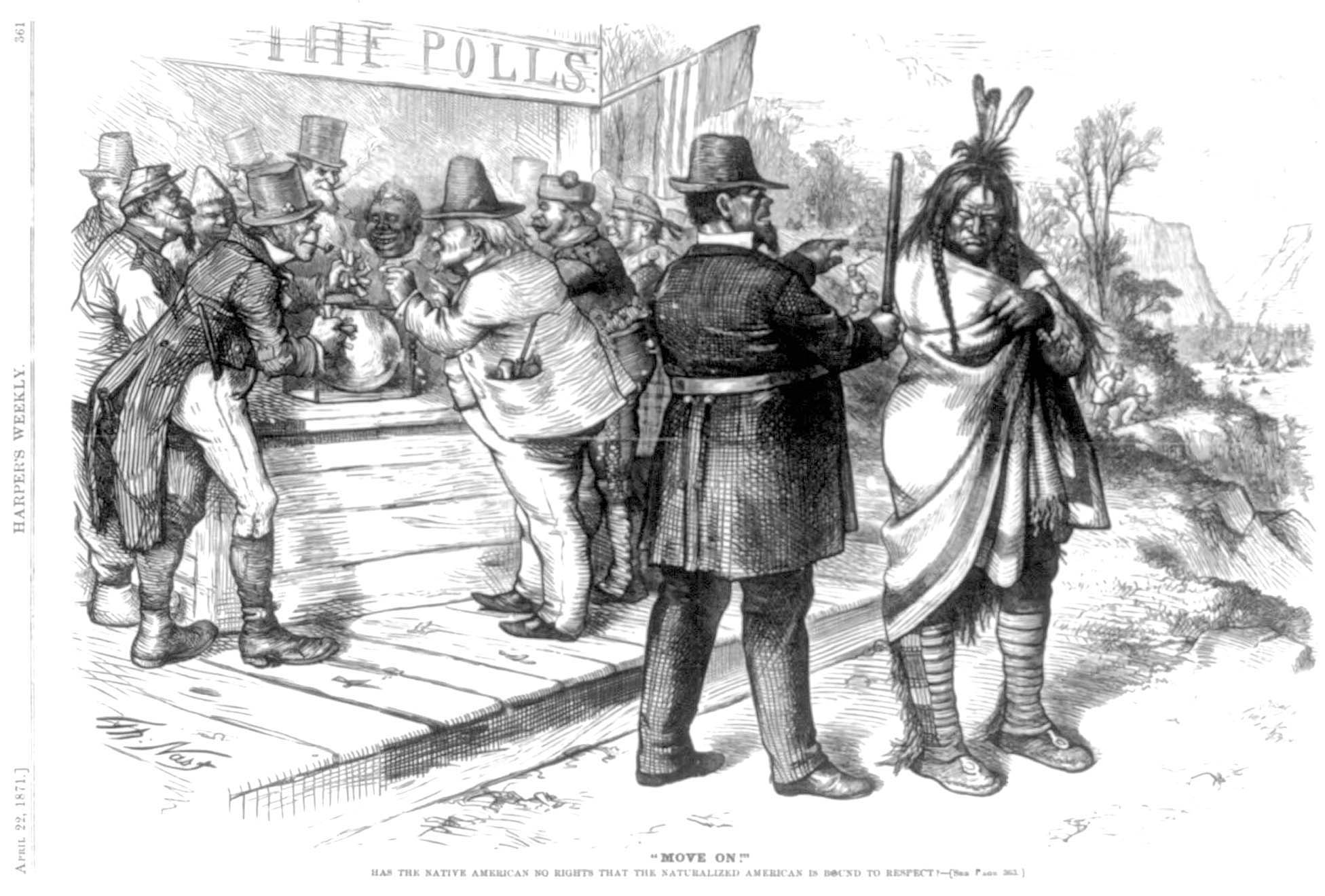
Policeman keeping Native American from polls - 1871

Policeman keeping Native American from polls - 1871
Widespread adoption of the secret ballot across the world creates an obstacle for candidates attempting to buy votes (Cox and Kousser Reference Cox and Morgan Kousser1981; Cox Reference Cox1987). Specifically, citizens who receive money from the candidates are still free to vote for their preferred candidate and there are very few repercussions for such defection.Footnote1 Candidates, government officials, and interest groups have attempted to capitalize on this fact to reduce and undermine the effectiveness of vote buying practices. In the Philippines, for example, vice-president Jejomar (“Jojo”) Binay reminded voters that they could pocket the money and vote for the candidate they preferred.Footnote2 A variation of this message has been found in Bulgaria, Zambia, the Philippines, and elsewhere (Schaffer Reference Schaffer2008). In Indonesia, several political leaders, government officials and outside interest groups throughout Central Java also expressed variations of this message, most commonly in the form of pamphlets reading “ambil uangnya—jangan pilih orangnya” (“take the money, but do not vote for them”). During the past several years, these appeals have become somewhat common across Central and Eastern Java and even promoted by government officials.Footnote3Ari Pradhanawati, George Towar Ikbal Tawakkal & Andrew D. Garner 2018
Age of Voting their Conscience
Prior to the adoption of the Australian ballot by the states around the early 1890s, parties exercised far greater control over elections and the balloting process than they do in elections today (Burnham 1965). Ballots in use at the time did not list candidates from all major parties on a single ballot; rather, each party printed its own ballot that listed its slate of candidates. These party-supplied ballots facilitated voting among illiterate citizens and provided a convenient way for the parties to monitor their own voters as well as their opposition’s voters (Ware 2002). Aside from the physical differences between the party and the secret ballots, the distribution of both ballots was markedly different as well. Party ballots were given to voters either in advance of the election itself or outside of the polling place on Election Day. As such, party bosses or “henchmen” often used a variety of tactics to persuade voters to support their slate of candidates. Jamie Carson & Joel Sievert 2015
Electoral Reform and Changes in Legislative Behavior
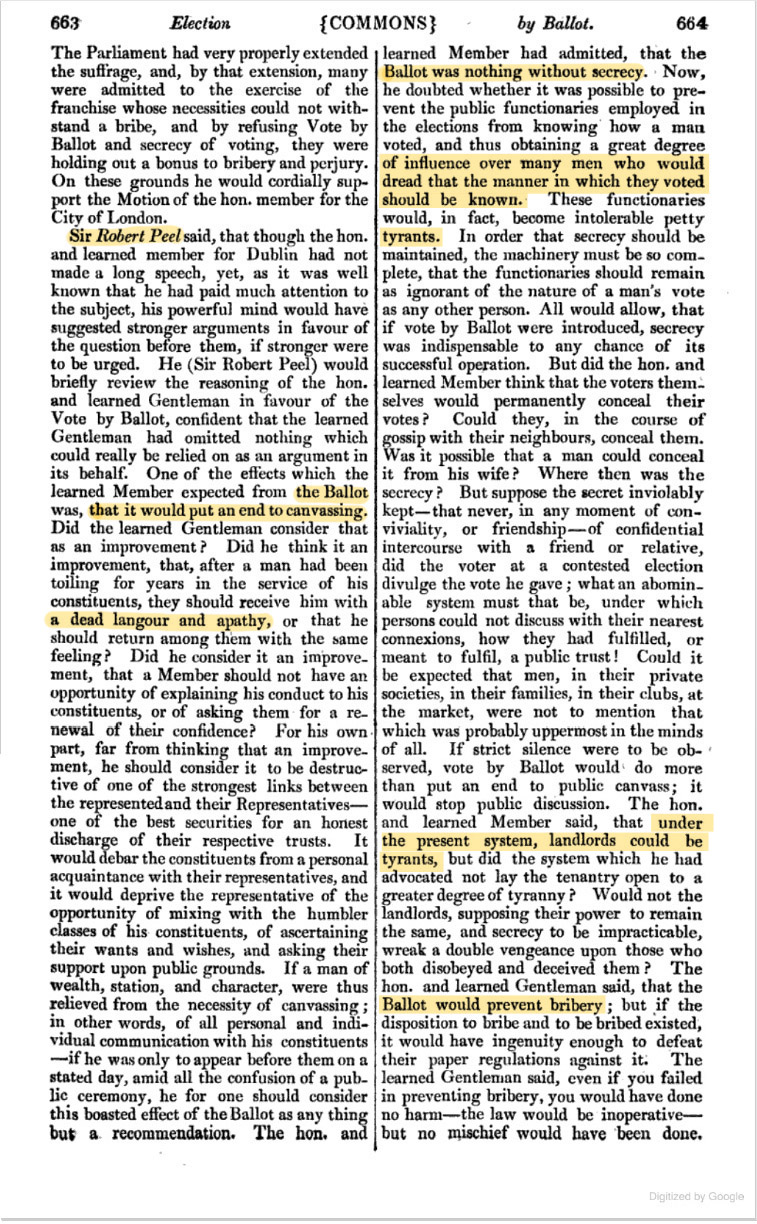
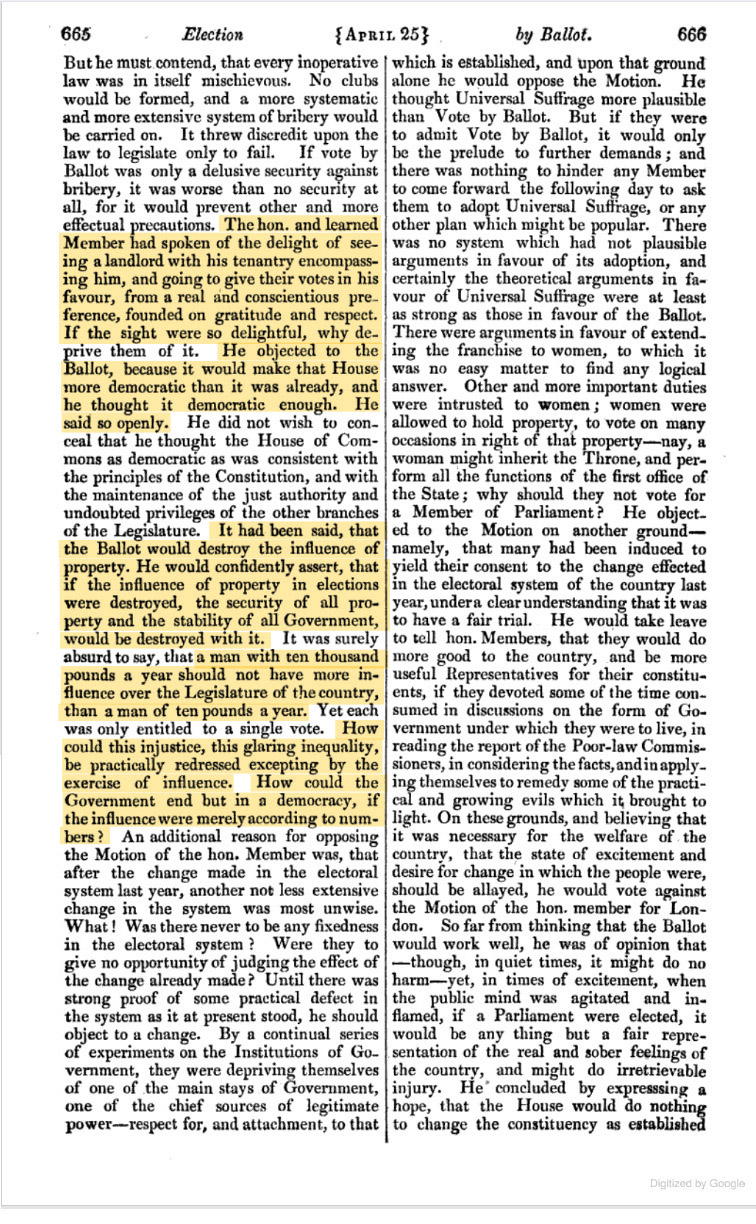
Sir Robert Peel 1833 - Parlimentary Debates
*NOTE: Peel talks about himself in the third person "he." He is an aristocrat terrified of losing is status. So in Parliament, he claims that the secret ballot would take away the power of the land owners and make England far too democratic. It would give the poor just as much power as the rich.

Sir Robert Peel 1833 - Parlimentary Debates
Intimidation was just as rife as bribery, and was largely traceable to the same cause – the non-secret ballot.Eldon Cobb Evans 1917
A History of the Australian Ballot System in the United States
The uncertainty surrounding how someone voted is enough to undermine traditional electoral bribe conditions.Bruce Cain 2014 (Stanford)
Democracy More or Less
Gentleman to hear the prayer of the petition, the House would be pleased to pass a law preventing the occurrence of bribery and intimidation at elections, and that it would grant the (Secret) Ballot as a security to electors.Great Britain Parliament 1835
Hansard’s Parliamentary Debates
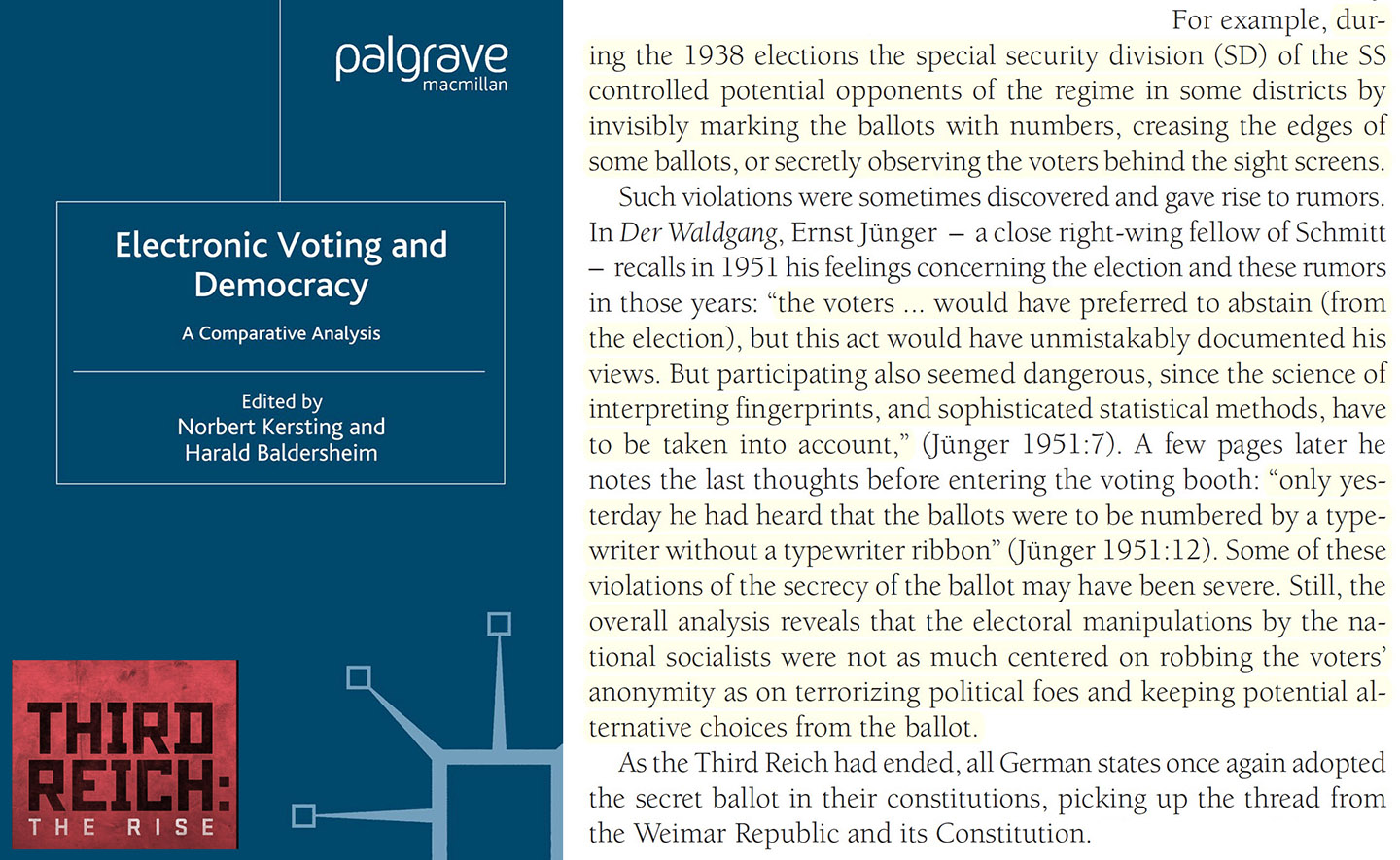
Hubertus Buchstein 2002 - Democracy's Secret and Voter Intimidaiton in Third Reich

Hubertus Buchstein 2002 - Democracy's Secret and Voter Intimidaiton in Third Reich
With the advent of the Australian, or secret, ballot in the early 1890s, American elections took on a decidedly freer and fairer tone.Tracy A. Campbell 2003
Machine Politics, Police Corruption, and the Persistence of Vote Fraud
Positive inducements entail monitoring costs because vote-buying politicians run the risk that they will provide a benefit only to see the recipient not deliver the vote. Politicians often must expend resources to create monitoring systems to ensure that voters show up at the polls after receiving their benefit.38 More active forms of monitoring turnout include co-opting electoral administrators to disclose vote choice or turnout, or compelling voters to inform party officials about how (or if) they voted. In some systems, the secret ballot may be violated by forcing voters to take non-standard ballots (absentee ballots or mobile ballot boxes) and directly overseeing the process of filling in ballots. In the twenty-first century, an oft-publicized strategy for violating the secret ballot is to require voters to take a photo of their ballot with their mobile phone before submitting it. Timothy Frye & Ora John Reuter 2018
Hitting Them With Carrots: Voter Intimidation and Vote Buying in Russia
In the “age of impeachment,” there is a tendency for “We, the people” not to reason but to intimidate and threaten with political retribution. Is there a way to mitigate this party-induced bias? Yes, the secret ballot (in Congress). The Constitution provides that the “Senate [has] the sole power to try all impeachments,” and absent a fundamental denial of due process, the rules chosen are beyond judicial review.
Secret ballots are traceable to ancient Greece and, in times of great division in history, the practice has freed the exercise of conscience. Some nations guarantee ballot secrecy; the U.S. Constitution allows for it where fair judgment requires. All it takes is 51 Senate votes, and some members of Congress speculate that even a one-vote majority would invite up to 35 Senate jurors to be a “profile in courage,” whichever side — in light of all the relevant facts and the law — proves the most worthy.Douglas Kmiec 2020
Impeachment trial could use a secret ballot
The action taken at this meeting was spoken of by the employés affected as being prejudicial to their freedom of action. Fear of loss of work if they voted or acted against their employers' wishes was frequently expressed . The result of the meeting and its action was a degree of intimidation to the employee. One witness described its effect upon the operatives thus : “It caused them to be no longer active , to grow cold ; it dampened their ardor and changed their conduct.” An other witness said the meeting was held for the purpose of “forcing their help , through dread of non-employment, to vote contrary to their wishes and according to the wishes of their employers.” United States Congress 1880
Alleged Frauds in the Late Elections
Other signs of discontent appeared in a series of laws designed to change the way Romans voted. Before the 130s, Romans voting in elections or as members of a jury did so by personally approaching an election official and announcing their vote aloud. Although efforts to intimidate voters were rare, there was nothing to prevent someone from “observing” how the votes were cast, and there was no written record of the breakdown of the votes against which one could check the tally. In 139, a tribune named Aulus Gabinius pushed to change the election of magistrates so that voters placed a clay tablet bearing the name of their chosen candidate into a basket. Then, in 137 BC, the tribune Lucius Cassius Longinus Ravilla backed a law extending the use of secret ballots to juries presiding over trials for every offense but treason. Then, in 131, a third tribune, Gaius Papirius Carbo, extended the use of secret ballots to votes on legislation taken within assemblies.
No contemporary literary sources survive that describe what prompted this outpouring of support for secret ballots, but later Republican authors make it clear these reforms proved to be quite controversial, especially among members of the senatorial elite. Gabinius was later criticized as an “unknown and sordid man” whose law was thought to have disrupted political affairs by estranging ordinary citizens from the Senate. The Cassian reform prompted even more vocal opposition at the time it was proposed. Although Cassius came from a noble family, the extension of the secret ballot to trials was seen as a populist measure that brought shame to his family because it courted the “fickle praise of the mob.” One of Cassius’s fellow tribunes worked alongside one of the consuls to block this law. Scipio Africanus the Younger finally broke the impasse by persuading the tribune to withdraw his veto. Carbo, for his part, is called “a seditious and wicked citizen” who elite audiences apparently viewed as a particularly craven opportunist.
Such criticisms notwithstanding, the introduction of secret ballots responded to at least two genuine political problems. First, secret ballots made voter intimidation much more difficult. Although people could (and, apparently, did) still physically position themselves in ways that might allow them to see what was written on an individual ballot, no figure now could stand nearby and listen to how each individual voted. Second, this reform also made it much more risky to try to influence an election through the distribution of political favors or bribery. There was now no way for a corrupt candidate to determine whether the people he paid actually delivered the votes they promised.
The introduction of secret ballots also coincided with some clear evidence that new paths were emerging through which politicians could build a career for themselves by seeming like they were advancing the cause of good governance amid tremendous economic inequality. Though Gabinius, the author of the first secret ballot law, does not appear to have parlayed this achievement into any higher offices, another Gabinius, who may have been his grandson, served as consul in 58 BC.9 Both Cassius and Carbo were rewarded more promptly. Cassius’s status as a champion of voting protections propelled him to a consulship in 127 and the censorship in 125. Carbo, for his part, built his early career as a populist around the voting reform he sponsored, although upon winning the consulship for 120, he turned dramatically against other populists.Edward J. Watts 2018
Mortal Republic - How Rome Fell Into Tyranny
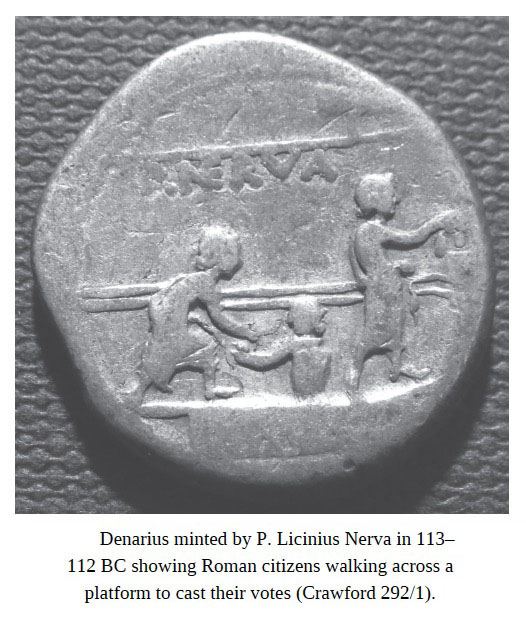
Mortal Republic - How Rome Fell Into Tyranny 2018
NOTE: Denarius minted by P. Licinius Nerva in 113– 112 BC showing Roman citizens walking across a platform to cast their votes by secret ballot on pottery shards (Crawford 292/1). Private collection. Photo by Zoe Watts. Book by Edward J. Watts

Mortal Republic - How Rome Fell Into Tyranny 2018
The secret ballot was won in a hard‐fought reform campaign late in the Nineteenth Century and has been fundamental to American election practice ever since. It helps safeguard individuals’ right to vote their conscience against the threat of retaliation or intimidation, which had been common practice in some localities when voters’ choice of ballot was publicly visible. It also tends to curb explicit vote‐buying, a practice still common in some other electoral systems, by interfering with the extent to which a would‐be bribe provider can check on whether any given recipient followed through on his or her end of the bargain.Walter Olson 2023 2017
Privacy, Transparency and Individual Ballots
“[T]he Constitution of the United States protects the right of all qualified citizens to vote.” Reynolds v. Sims, 377 U.S. 533, 555 (1964). “[N]o right is more precious in a free country than that of having a voice in the election of those who make the laws under which, as good citizens, we must live. Other rights, even the most basic, are illusory if the right to vote is undermined.” Burson v. Freeman, 504 U.S. 191, 199 (1992) (quoting Wesberry v. Sanders, 376 U.S. 1, 17 (1964)). “The right to vote freely for the candidate of one’s choice is of the essence of a democratic society, and any restrictions on that right strike at the heart of representative government.” Reynolds, 377 U.S. at 355. Such a crucial right is protected “by the secret ballot, the hard-won right to vote one’s conscience without fear of 7 retaliation.” McIntyre v. Ohio Elections Comm’n, 514 U.S. 334, 343 (1995). The secret ballot exemplifies the respected tradition of anonymity in the advocacy of political causes. Id. With recent advances in technology, one’s right to vote freely without fear of retaliation is in jeopardy. Technology such as digital photography and social media allow other parties to invade the sanctity of the voting booth and eliminate the anonymity of the secret ballot. This crucial right to vote by secret ballot has not always been protected. In the late nineteenth century, political parties, unions and other organizations had the ability to print their own ballots which for the most part were distinguishable by size and color. App. 3. Ballots that were distinguishable allowed the various organizations to monitor how individuals voted, which in turn allowed voter coercion and intimidation to flourish. Id. In 1891, New Hampshire passed legislation which required the Secretary of State to prepare ballots for state and federal elections. Id. New Hampshire’s statute banning the display of a marked ballot dates as far back as 1911. 1911 N.H. Laws Ch. 102, Sec. 2. The earliest version of the statute made it illegal for a voter to “allow his ballot to be seen by any person, with the intention of letting it be known how he is about to vote.” The use of the term “about to vote” reflects then-current technology. At the time, a voter only had the ability to publish his ballot to another for the brief period of time between when he left the voting booth and when he cast his ballot. Once the 8 ballot was cast, the voter no longer possessed it, thus removing direct evidence of how he voted. With digital photography and the ability to disseminate images through social media, a voter’s right to cast his or her ballot free from intimidation and coercion has become vulnerable. The aforementioned advances in technology allow those who would seek to influence an election to do so easily and on a wide scale. To address that concern, New Hampshire updated RSA 659:35, I, which now prohibits the display of the ballot after it has been cast.Supreme Court 2017
New Hampshire Ballot Selfies
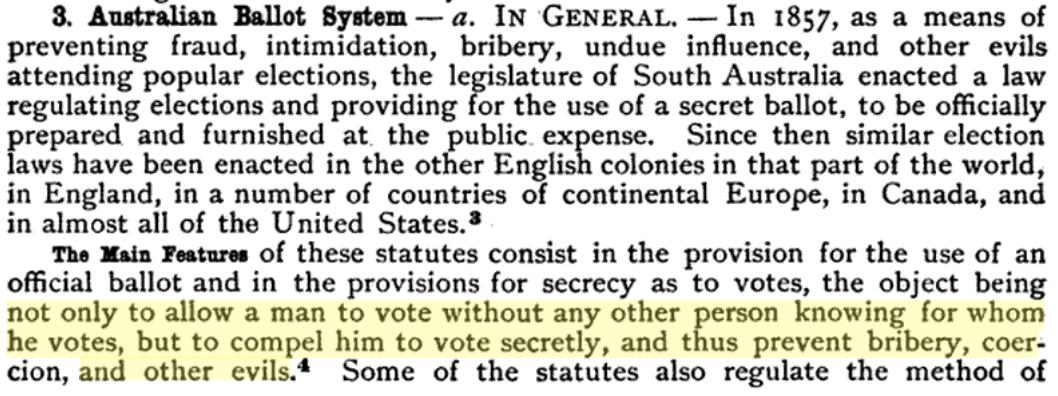
The American and English Encyclopædia of Law, Volume 10

The American and English Encyclopædia of Law, Volume 10
The secret ballot is the cornerstone of how our democracy works. It is the right to vote your conscience — without fear of retribution, intimidation or bribery.Rep. Darrel Issa 2009
One Hand Giveth
Soon after this sermon was preached, the election was held. Approaching the polls, I asked for a Union ticket, and was informed that none had been printed, and that it would be advisable to vote the secession ticket. I thought otherwise, and going to a desk, wrote out a Union ticket, and voted it amidst the frowns and suppressed murmurs of the judges and bystanders, and, as the result proved, I had the honour of depositing the only vote in favour of the Union which was polled in that precinct. I knew of many who were in favour of the Union, who were intimidated by threats, and by the odium attending it from voting at all.John Hill Aughey 1863
The Iron Furnace
In many states there was no regulation of the form or appearance of the ballot whatsoever. As a result, ballots of the opposing parties were so different that it could accurately told how an elector voted by the color of his ticket…The failure of the law to secure secrecy opened the door to bribery, intimidation, and corruption.Eldon Cobb Evans 1917
A History of the Australian Ballot System in the United States
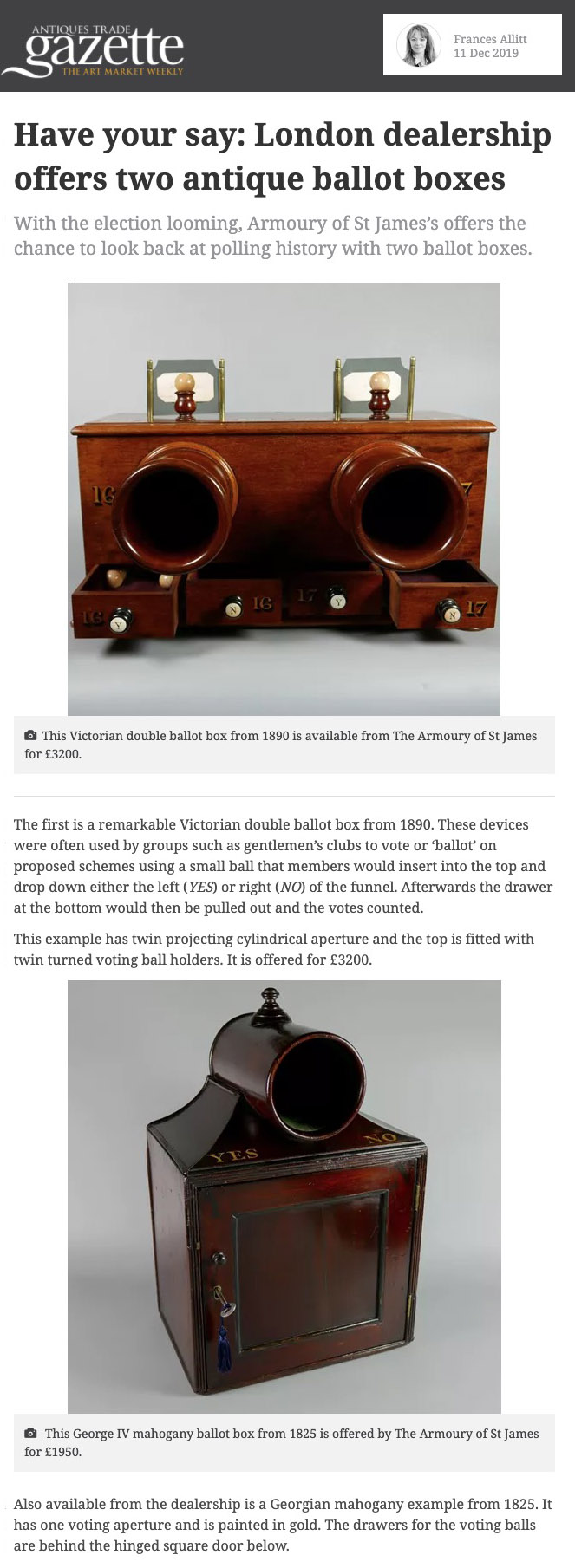
Victorian Era: Aristotle-style Ballot Boxes

Victorian Era: Aristotle-style Ballot Boxes
This sounds like exaggeration, but it is truth; and these are facts so notorious that no one acquainted with the conduct of recent elections now attempts a denial – that the raising of colossal sums for the purpose of bribery has been rewarded by promotion to the highest offices in the government; that systematic organization for the purchase of votes, individually and in blocks, at the polls has become a recognized factor in the machinery of parties; that the number of voters who demand money compensation for their ballots has grown greater with each recurring election;… men of standing in the community have openly sold their votes at prices ranging from fifteen to thirty dollars; and that for securing the more disreputable elements-the "floaters," as they are termed – new two dollar bills have been scattered abroad with a prodigality that would seem incredible but for the magnitude of the object to be obtained.Eldon Cobb Evans 1917
A History of the Australian Ballot System in the United States
Lest anyone think the lessons of the secret ballot are not pertinent to contemporary elections, one need look no further than the June 1993 Los Angeles mayoral election for evidence to the contrary. The Democratic-backed (Michael Woo) and Republican-backed (Richard Riordan) candidates were running dead even on the eve of the election. To bolster its chances, the Democratic party offered bribes in the form of six free doughnuts to anyone providing proof of voting. These bribes cost the Democratic party $100,000 (Fiore, 1993). Although the Democrats were able to boost overall turnout, they still lost the election by a margin of eight percentage points. There was a hole in the Democrats’ doughnut plan. Since voters today are able to make their choices while cloaked under a shroud of secrecy, these enticements could not be limited to those voting for Woo. There is simply no mechanism to verify the voters’ choice. Instead, the doughnuts were offered as payment to anyone who voted, relying upon goodwill to steer voters toward Woo’s name once inside the booth. If the pre-election polls were accurate, the 120 Democrats actually attracted a disproportionate percentage of Republican voters with the doughnut bribes. These bribes proved sufficient inducement to improve Los Angeles’ previously abysmal turnout in municipal elections, but Woo was not the beneficiary of these extra votes. The Democratic party could have saved themselves $100,000 if they had only remembered this historical adage: You can lead a voter to the polls, but you can’t make him vote Democratic. At least not under a secret ballot. Jac C. Heckelman 1995
The effect of the secret ballot on voter turnout rates
The Australian ballot system was effective in reducing the most blatant intimidation at the American polls. Landlords or employers were less able to force people to vote according to their wills, because they could no longer see for whom their tenants or employees were going to vote. This accounted for the slower acceptance of the Australian ballot in the Southern States, especially since black men were allowed to vote in 1870.Elizabeth Dori Tunstall 2014
Australia’s un-doing of voter intimidation
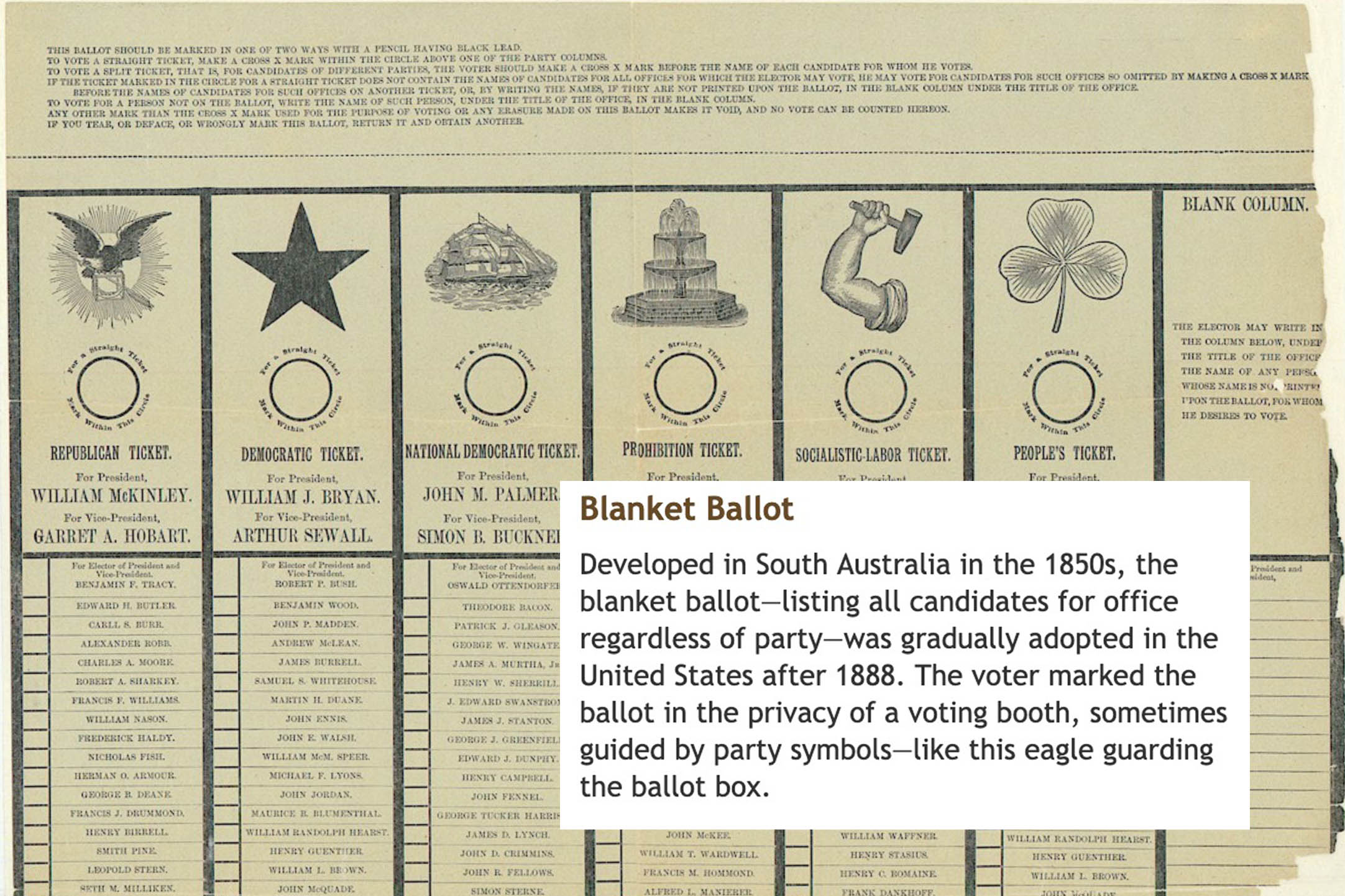
The blanket ballot provided secrecy - 1850s

The blanket ballot provided secrecy - 1850s
Now there is only one method by which he can discharge this duty. It is only by the use of a secret suffrage that he can come personally forward in a way in which corruption can have no hope of arresting him, and intimidation no chance of diverting or deterring him from indicating who shall be his responsible agent to represent his views — tax his resources, protect his interests — and attempt in his name to increase the freedom, honour and repute of his native land. All this independence of action, is my business as a voter, and if that indi¬viduality of action which Mr. Mill so usefully vindicates, is to be secured to me — voting must be left my business. It is no affair of my neighbour how I vote, or for whom I vote, or why I vote — since I exercise no power or freedom which he does not equally possess, and which I do not equally concede to him.George Jacob Holyoake 1868
A new defence of the ballot in consequence of Mr. Mill's objections to it
The Australian Ballot Act, adopted by Massachusetts in 1888, replaced all former methods of getting secrecy. Massachusetts was the first American State to enact a State-wide law. So quickly did the system approve itself, that within seven years it had been adopted by all save four of the other States. It appears to have established beyond any likelihood of change in our time, that the electorate shall have all the freedom that secrecy can bring, for expressing the common will without coercion, intimidation, or pressure of any sort. Robert Luce 1930
Legislative Principles
In 1839 the Legislature enacted that all ballots should be deposited “open and unfolded.” Then came loud complaint of intimidation.Robert Luce 1930
Legislative Principles
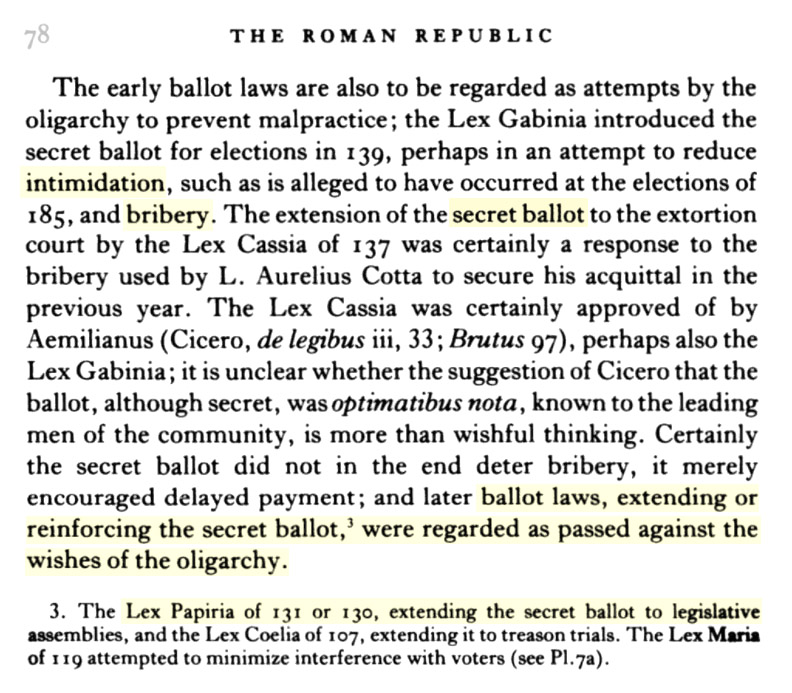
Michael Hewson Crawford 1993 - The Roman Republic
NOTE: The early ballot laws are also to be regarded as attempts by the oligarchy to prevent malpractice; the Lex Gabinia introduced the secret ballot for elections in 139, perhaps in an attempt to reduce intimidation, such as is alleged to have occurred at the elections of 185, and bribery . The extension of the secret ballot to the extortion court by the Lex Cassia of 137 was certainly a response to the bribery used by L. Aurelius Cotta to secure his acquittal in the previous year. The Lex Cassia was certainly approved of by Aemilianus (Cicero, de legibus iii, 33; Brutus 97), perhaps also the Lex Gabinia; it is unclear whether the suggestion of Cicero that the ballot, although secret, was optimatibus nota, known to the leading men of the community, is more than wishful thinking. Certainly the secret ballot did not in the end deter bribery, it merely encouraged delayed payment; and later ballot laws, extending or reinforcing the secret ballot, were regarded as passed against the wishes of the oligarchy. The Lex Papiria of 131 or 130, extending the secret ballot to legislative usemblics , and the Lex Coelia of 107, extending it to treason trials. The Lex Maria of 119 attempted to minimize interference with voters.

Michael Hewson Crawford 1993 - The Roman Republic
The Australia ballot system (the secret ballot) was designed to address the blatant intimidation of voters in the voting processes of the 19th century.Elizabeth Dori Tunstall 2014
Australia’s un-doing of voter intimidation
“All this means that the people of any country have the right, and should have the power by constitutional action, by free unfettered elections, with secret ballot, to choose or change the character or form of government under which they dwell…”Winston Churchill 1946
The Sinews of Peace
The secret ballot was designed to stop one problem made possible by these very public election days — voter intimidation. It's much harder to intimidate or bribe someone if you can't see who they end up voting for.Nick Wiggins 2020
US elections were changed for better (and worse) by the secret 'Australian ballot'
In emerging democracies that don’t protect ballot secrecy well, as many as 15% of voters are regularly offered bribes for their votes – and almost half fear being targets of violence during elections.Susan Orr & James Johnson 2020
Perils of voting without secrecy
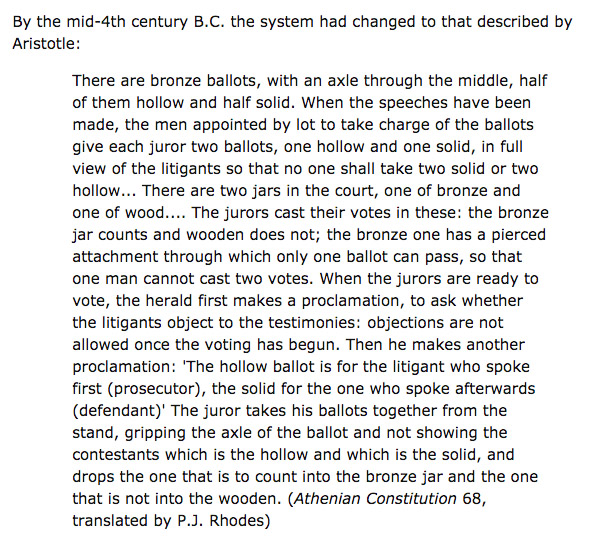
The secret ballot system put in place by Aristotle. It would still work today, despite cellphones and cameras (see 3-D drawing above)

The secret ballot system put in place by Aristotle. It would still work today, despite cellphones and cameras (see 3-D drawing above)
Far from being just a Latin American problem, or a problem that advanced democracies have completely overcome, vote buying, clientelism, and machine politics are blights on many democracies around the world, even today. Prosecutors in 2004 accused a candidate for a district judgeship in Eastern Kentucky of giving $50 checks to voters, implicitly in return for their support. 3 Journalists reported, also in 2004, that an elderly hospital patient in Ukraine confessed to his son that he had voted for the official presidential candidate, Viktor Yanukovych, rather than for the opposition candidate, Viktor Yuschenko. He had planned to support Yuschenko but switched his vote after a nurse at the hospital promised him a wheelchair if he switched.
These practices make a mockery of democratic accountability. Democratic accountability usually means that voters know, or can make good inferences about, what parties have done in office and reward or punish them conditional on these actions. But when parties know, or can make good inferences about, what individual voters have done in the voting booth and reward or punish them conditional on these actions, this is perverse accountability. We usually think of accountability in democratic systems as a good thing: it means that voters can keep elected officials from misbehaving and pressure governments to be more responsive to voters. But perverse accountability is bad for democracy: it reduces the pressure on governments to perform well and to provide public goods, keeps voters from using elections to express their policy preferences, and undermines voter autonomy (see Karlan 1994; Kochin and Kochin 1998; O’Donnell 1996; Stokes 2004).Susan C. Stokes 2005
Perverse Accountability
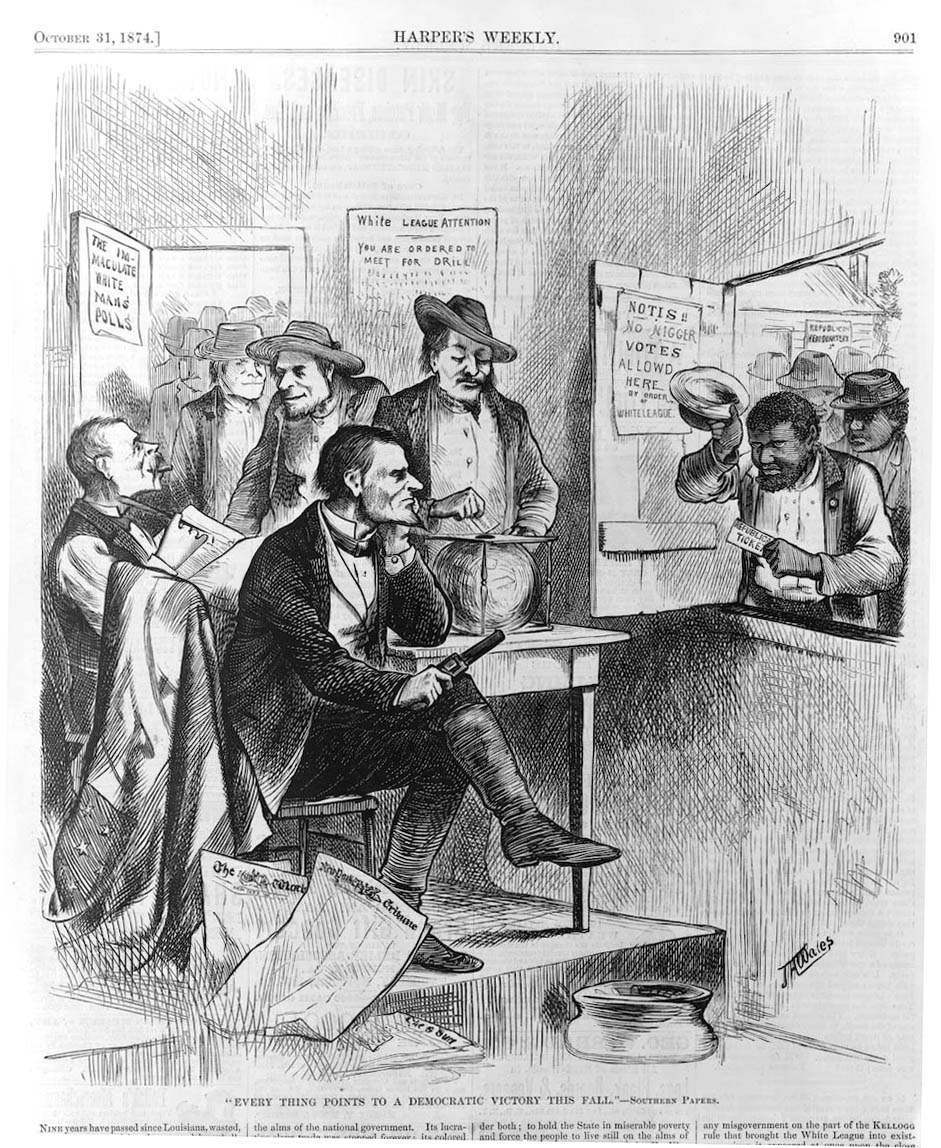
Voter intimidation And vote counting 1874

Voter intimidation And vote counting 1874
The secret ballot came to America only during the late nineteenth century. Voters previously cast their ballots in full view of the contesting parties, who carefully monitored each decision. Within this framework, corrupt votebuying was commonplace. Party hacks could readily determine whether they got what they were paying for. No voter could receive his election day turkey without casting his ballot before the watchful eyes of the turkey’s provider.
It was the secret ballot, not some sudden burst of civic virtue, that transformed the situation. Once a voter could promise to vote one way, and actually vote another, it was no longer easy for him to sell his vote. Even if he sincerely intended to perform his side of the bargain, vote-buyers could no longer verify the credibility of his commitment. Suddenly, the promise of a voter to sell his franchise for money became worthless and as a consequence, vote-buying declined dramatically.Bruce Ackerman & Ian Ayres 2002
Voting with Dollars
And the English—who have the reputation of enforcing their laws more rigidly than we do ours—have made the most stringent statutes against election bribery, and have enforced them in many cases, by unseating members of Parliament who had used corrupt means, with out being able to break up the practice. They succeeded in doing away with the open payment of money for votes, but bribery still went on. The voter would be told, by a person he did not know, to take a package out of the hand or pocket of one looking another way; the voter’s wife would find sovereigns in the bottom of her tea-cup, or the voter himself would discover them in the dregs of his mug of beer; a cabbage would be purchased for £15, or a canary for £50; or a few bricks would be taken out of a wall, and a hand from one side would pass Bank of England notes into a hand on the other. Nothing like so much ingenuity would have to be exercised here, to successfully defy any law which can be enacted. But though we can not hope to prevent bribery by prohibitory laws, there is another and a simpler remedy for the evil: making the ballot what it was intended to be — a secret vote. As a general thing, where votes are purchased, the buyer or his agent puts a ballot into the purchased voter’s hand, walks up to the box with him, and sees that it goes in, before he pays him.Henry George 1871
Bribery in Elections
In this plan of secret voting will, I think, be found the simplest and most effective way of preventing the corrupt use of money in elections.Henry George 1871
Bribery in Elections
Protected by the privacy of the voting booth, you are free to go up to George W. Bush and tell him that you voted for him enthusiastically in 2000 even though you actually voted for Al Gore. Knowing this, neither the president nor you will be prone to take such protestations seriously. The same “cheap talk” regime will disrupt the special-interest dealing we now take for granted...The voting booth disrupts vote-buying because candidates are uncertain how a citizen actually voted.Bruce Ackerman & Ian Ayres 2002
Voting with Dollars
On the one hand the secret ballot checks bribery and all those corrupt practices which consist in voting according to a bargain or understanding. No man has ever placed his money corruptly without satisfying himself that the vote was cast according to the agreement, or, in a phrase which became only too common during the last campaign, without proof that “the goods were delivered;” and when there is to be no proof but the word of the bribe-taker (who may have received thrice the sum to vote for the briber's opponent), it is idle to place any trust in such a use of money. In other words, take away all interest in committing an offence, and the offence will soon disappear. John Henry Wigmore 1889
The Australian Ballot System
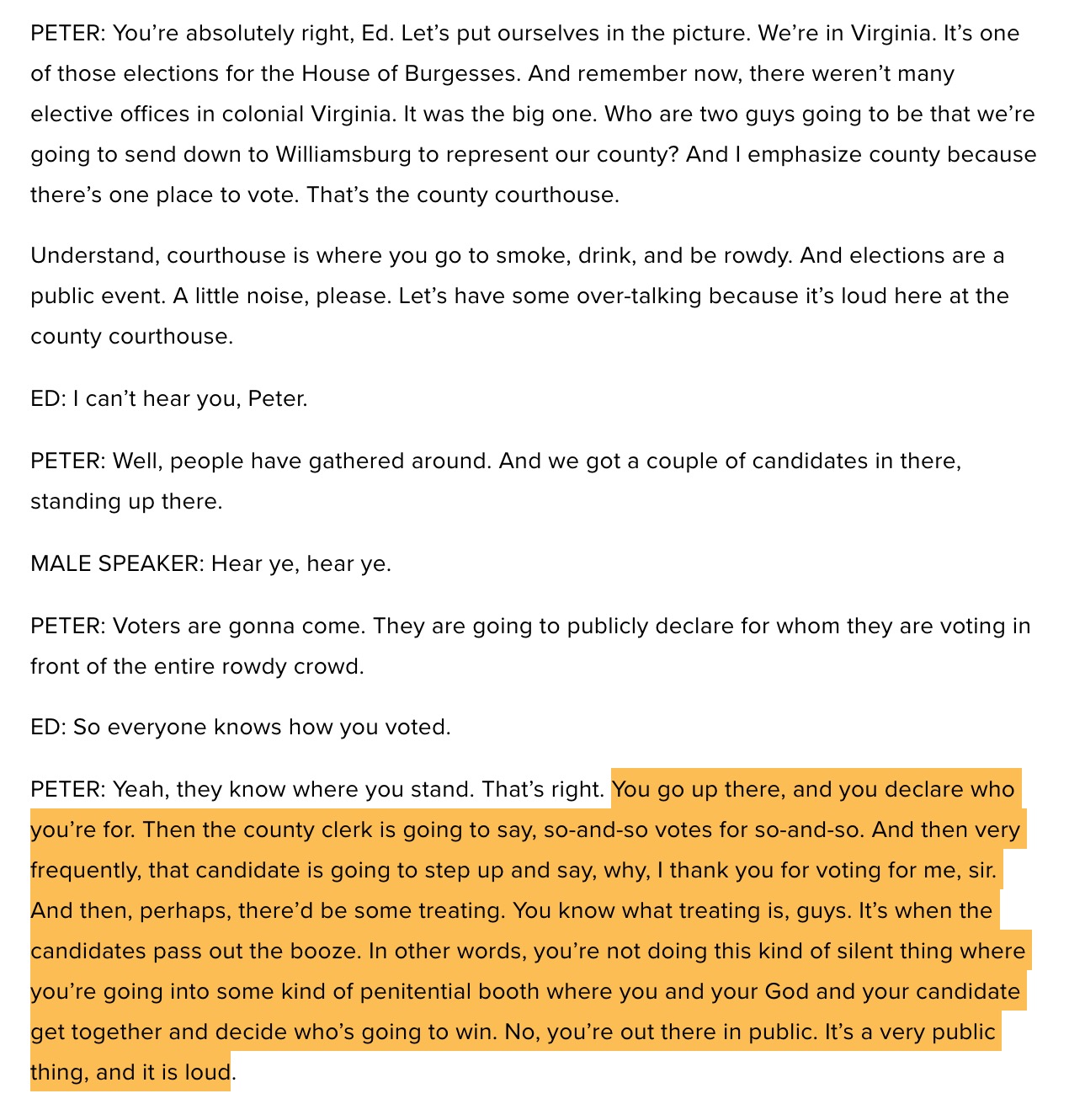
Voting in America 2016

Voting in America 2016
(The effects of the secret ballot were) undoubtedly marked and salutary. The excitement and riots which had characterized the open nomination and polling were largely eliminated, and the factor of violence disappeared almost entirely from electoral contests. The first election held under the new act took place at Pontefract and was watched with great interest. The Mayor in a letter to the Times reported that the familiar scenes of the old days were totally absent; the public houses were quiet, there was no drunkenness, no crowd around the polling places, and no difficulty in getting to the poll. At Preston the streets were nearly as quiet as on an ordinary day. In the large industrial towns it was reported that the ballot worked admirably in lessening excitement and making for order. At Leeds, Liverpool, and Manchester, general satisfaction was expressed at the quietness of the proceedings.
The fear that the system would tend to disfranchise the uneducated voters proved illusory. A small proportion of illiterates found difficulty in marking their ballots and some votes were cast out because of irregularities; but the number was trifling.Charles Seymour 1915
Electoral Reform - The Final Attack Upon Corruption
In times past (before the secret ballot) the landlord told his tenants to vote for a given candidate and they had no alternative but to obey. Tradesmen were ordered by their customers, and workmen by their employers to vote in a specified direction and they did so. Such customs were, to a certain extent, destroyed by the ballot.Charles Seymour 1915
Electoral Reform - The Final Attack Upon Corruption
In the House of Commons the fight for the ballot, as the single effective remedy for corruption and particularly for electoral intimidation, was led by Grote. Charles Seymour 1915
Electoral Reform - The Final Attack Upon Corruption
Rich A. Chrismer, who told the St. Louis Post-Dispatch that the blogger "violated the law, and I'm going to prosecute." "They may have thought the photo was cute," he continued, "but it was very serious." Why all the fuss? "You can't violate something as sacred as the ballot," Chrismer told the Post-Dispatch. "People won't trust going to a polling place if they think somebody is walking around with a camera."Eric P. Robinson 2009
Blogger Threatened Over Ballot Photo
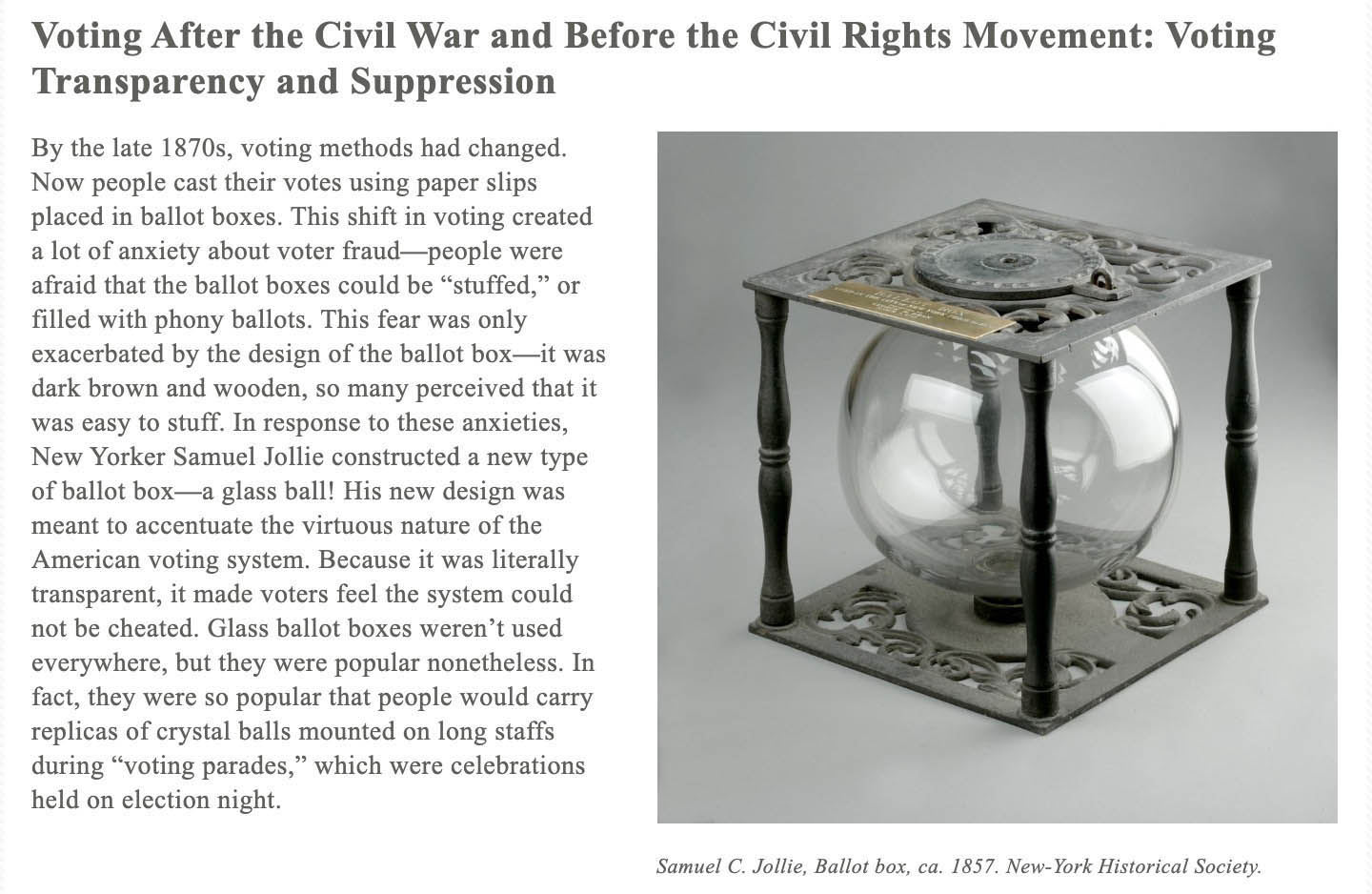
History of the Glass Urn & Samuel Jollie

History of the Glass Urn & Samuel Jollie
During the nineteenth century, Americans confronted a massive black market for votes – with machine politicians buying tons of ballots from the poor and ignorant at bargain prices. During this entire period, vote-buying was strictly illegal, but the threat of criminal prosecution was hollow. The practice was so common that it overwhelmed public prosecutors, who were easily diverted by sitting politicians to the investigation of other, “more serious,” crimes.
Then some clever Australians hit upon a solution, which now strikes us as obvious but which represents one of the great leaps forward in the history of modern democracy. By creating a secret ballot, they drew a curtain between corrupt politicians and the voters, disrupting potential black-market transactions. This elegant change in informational conditions accomplished something that the threat of criminal prosecution never achieved. Honest elections became a real possibility in the Western world. By disrupting the black market for votes, the secret ballot became the foundation for the construction of a parallel sphere of life – in which equal citizens, rather than unequal property owners, express their political judgments.Bruce Ackerman & Ian Ayres 2002
Voting with Dollars
Over the course of the twentieth century, almost all countries adopted the Australian ballot, which lists multiple candidates on a single card and therefore allows for a discreet selection, as opposed to earlier systems that required the voter to select one party's card (Fredman 1968; Markoff 1999, 674-fJ77). With secret ballots, the price of a vote plummeted in some countries, since the purchasers could no longer be certain that they were rece iving the setvic es they paid for (Schaffer 2002b, 79).Frederic Charles Schafer 2002
Elections for Sale
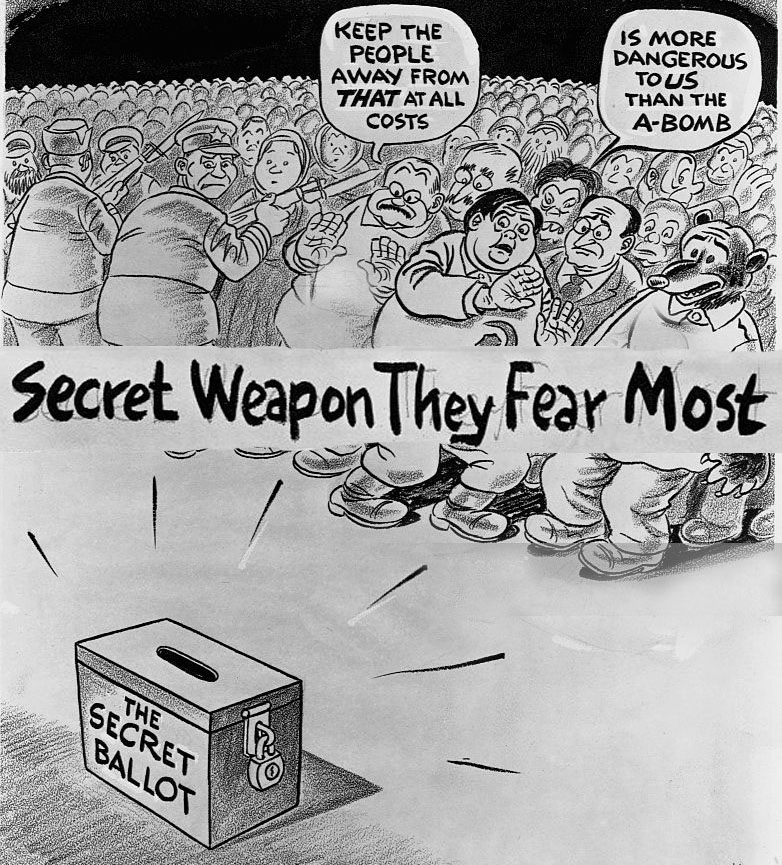
Manning 1952 - The Weapon They Fear the Most

Manning 1952 - The Weapon They Fear the Most
Ballots marked distinctively enough to be recognizable at a distance allowed both vote buying and voter intimidation. In the 185Os the Know-Nothing party dominated Baltimore elections by stationing crowds of awl-wielding thugs—the famous plug-uglies—around the ballot box. They chased off bearers of opposition tickets while stepping aside with cries of “Make way for the voters!” when their own supporters approached. Stephen J. Ackerman 1992
The Magic Ballot
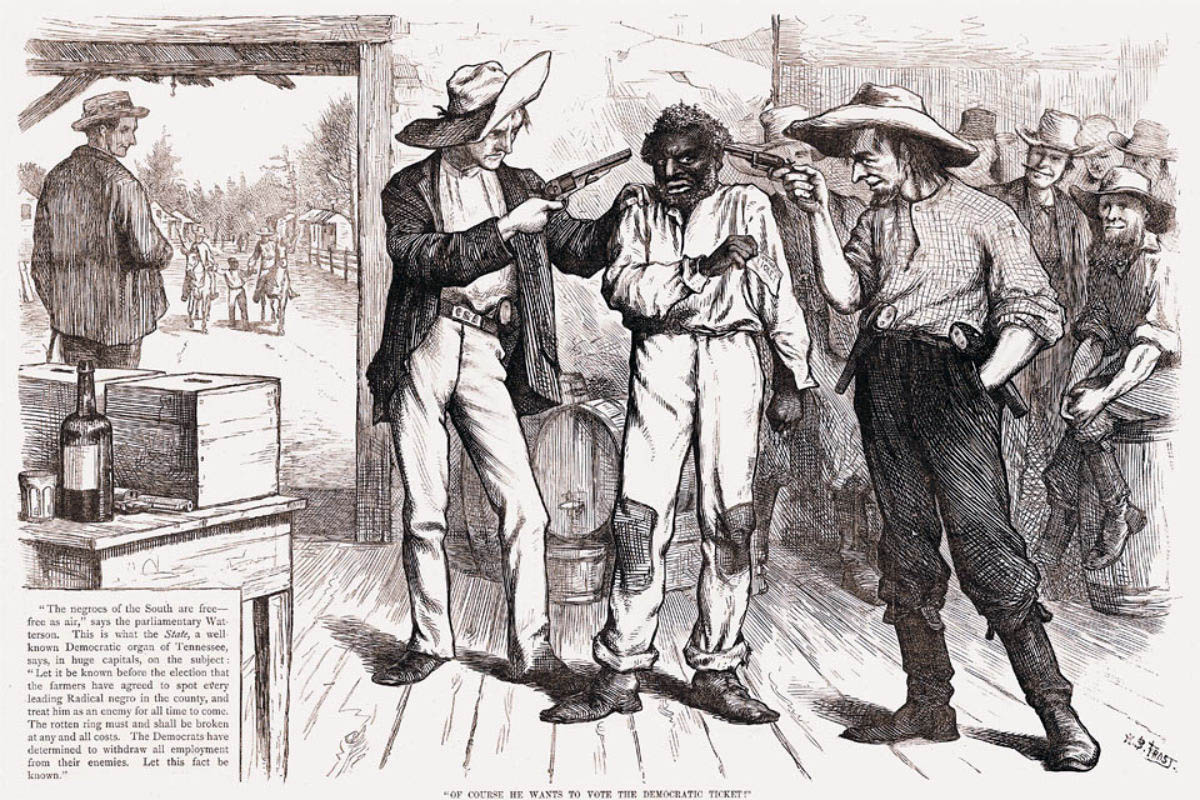
Voter Intimidation 1876

Voter Intimidation 1876
An exchange of favors for votes was an essential part of 19th-century American elections. Bensel offers many examples to support his general contention that, in the mid-19th century U.S., “For many men… the act of voting was a social transaction in which they handed in a party ticket in return for a shot of whiskey, a pair of boots, or a small amount of money.” This remained true during the Gilded Age, the golden era of party politics. Parties’ appeals to voters were economic, sectional, ethnic, and religious. But electoral politics in the Gilded Age also featured vote buying: the exchange of cash, food, alcohol, and other small items for votes. The 1888 election in Newark, New Jersey cited earlier, in which party operatives gave voters chits redeemable for cash, was not unusual. An 1887 study of New York City politics estimated that one-fifth of voters were bribed. Twenty-five years later, an investigation into bribery in Adams County, Ohio, found 1,679 voters who acknowledged receiving payments for their votes, 26% of the county’s voters.Susan Stokes & Thad Dunning 2010
What Killed Vote Buying?
This public system of voting had left electors wide open to bribery and intimidation, for example mobs might be brought to polls to bully the voters. In contrast elections could be like a party, where candidates ‘rewarded’ their voters with large amounts of alcohol...[After the introduction of the secret ballot] Observers said they had never seen "a contested election in which less intoxicating liquor was drunk', and that the town was so quiet and orderly that "it hardly seemed like an election" at all.Ros Ball 2015
BBC Parliament: The sweet history of the secret ballot
That system ensures that all voters must vote in a way that cannot be observed. And no one can prove that any single person cast any particular ballot. Even the voter cannot prove to others how he or she voted. The process makes threats and bribes useless – because there is no way to verify a voter complied.Susan Orr & James Johnson 2020
Perils of voting without secrecy
That the system is by birth Australian has once, and once only, been questioned. In 1869, when the British Parliamentary Committee were considering the introduction of the secret ballot, and were examining witnesses from all parts of the world, it was told that in the little town of Maryport, in Cumberland, a similar method of voting had for many years been in successful operation, and it was the grievance of the burgesses of the old town that Australia, far from deserving the credit of an invention, had been only a borrower, without acknowledgment, of the Maryport method, doubtless carried to the colonies by some native of the town. The Maryport Method.John Henry Wigmore 1889
The Australian Ballot System
In the first decades after the 1832 reform rural areas were places where electoral agents could closely monitor the actions of voters. “The party association sent the agent out through the boroughs to discover the private circumstances of the voter and make use of any embarrassment as a club to influence votes. [Ledgers had] a space for special circumstances which might give an opportunity for political blackmail, such as debts, mortgages, need of money in trade, commercial relations, and even the most private domestic matters.”Susan Stokes & Thad Dunning 2010
What Killed Vote Buying?
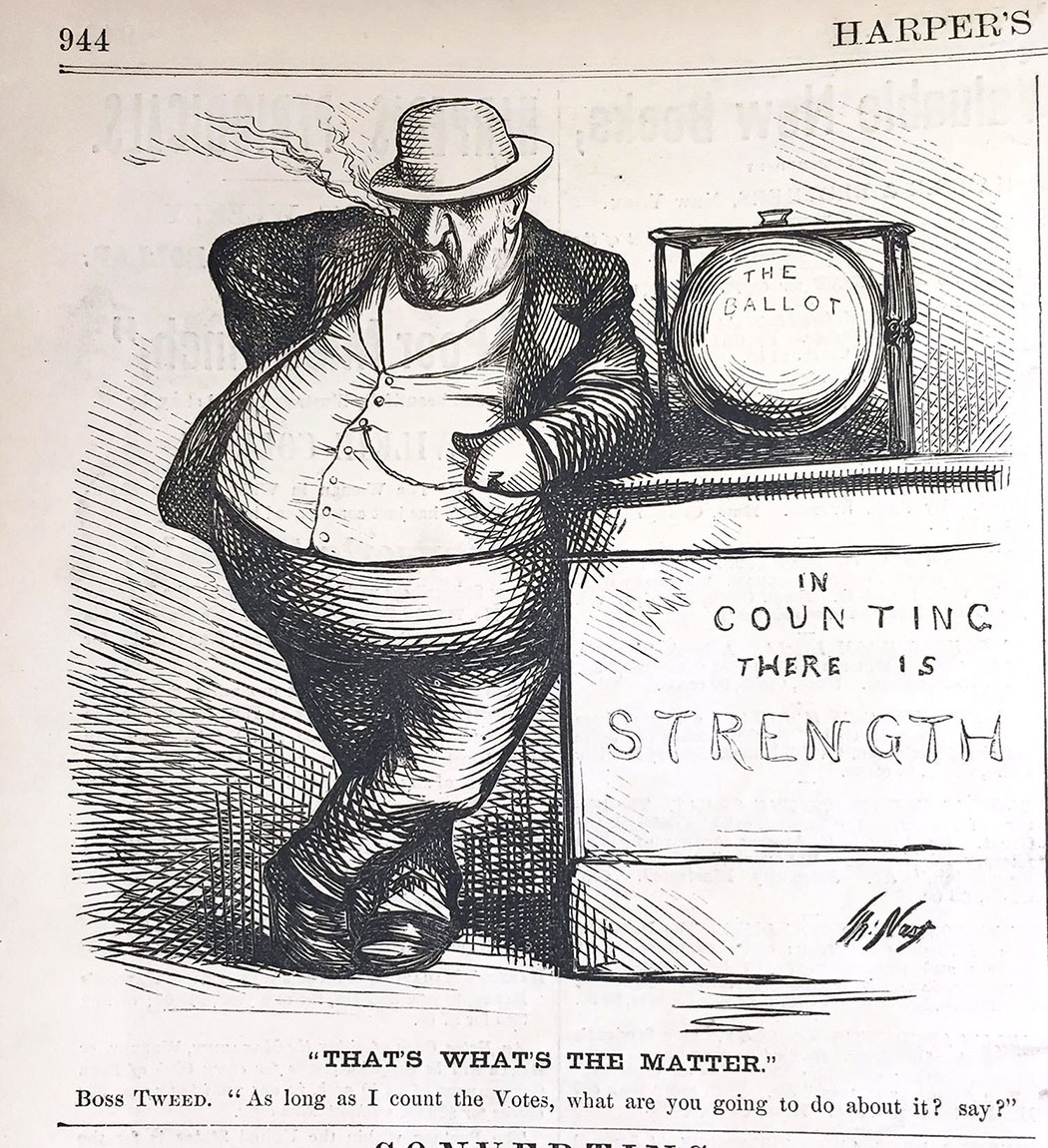
Boss Tweed and the glass (transparent) ballot box - 1871

Boss Tweed and the glass (transparent) ballot box - 1871
A major argument in favor of introducing the secret ballot (in the Gilded Age) was the expectation that it would reduce vote buying, which was relatively common with open voting (cf Orr; Lehoucq). For example a US newspaper in 1888 commented that “if the act of voting were performed in secret, no bribed voter could or would be trusted to carry out his bargain when left to himself” (cf Campbell 2005, 97)Susan Stokes & Thad Dunning 2010
What Killed Vote Buying?
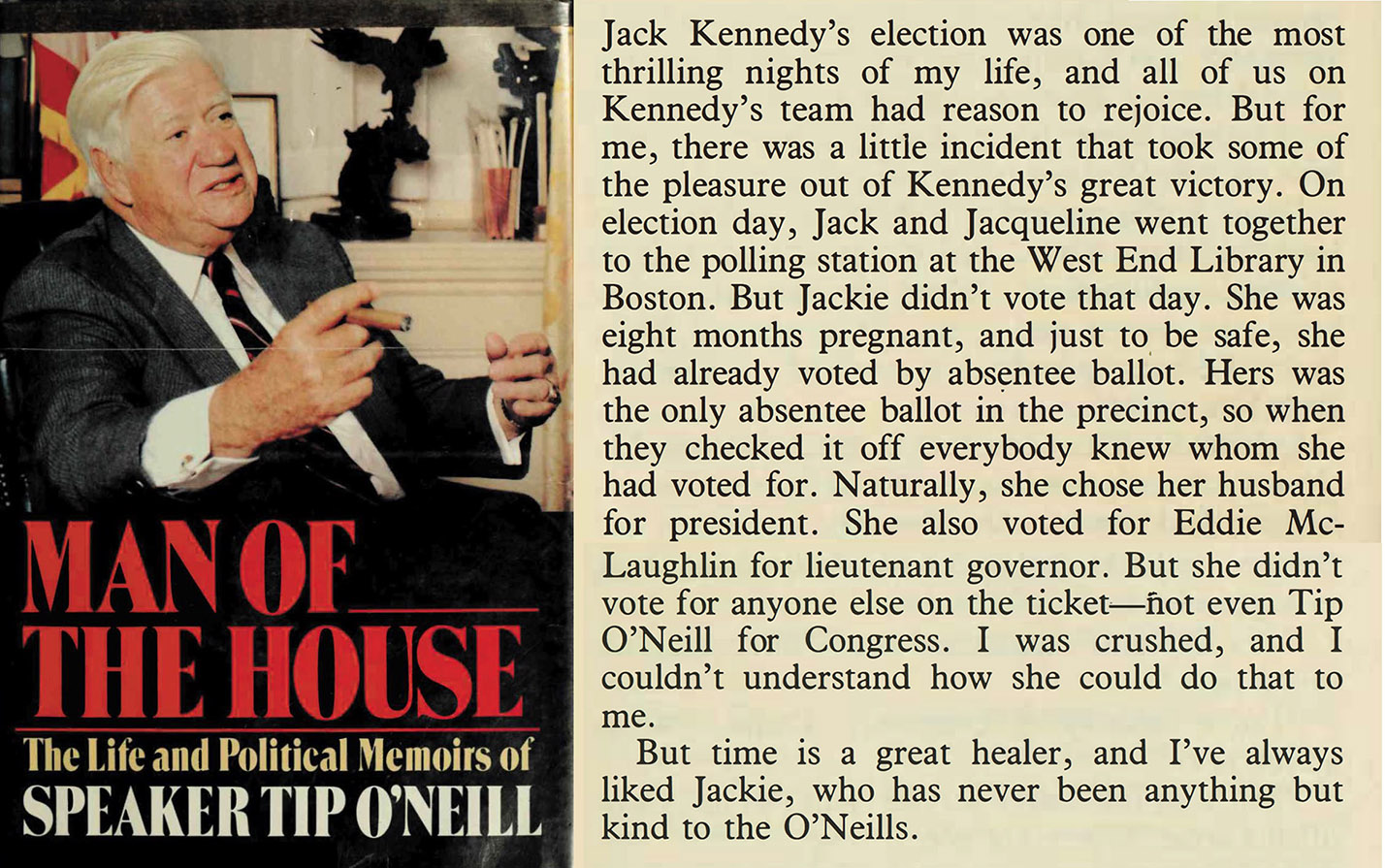
Tip O’Neill 1988 - Illegally reading Rose Kennedy’s vote

Tip O’Neill 1988 - Illegally reading Rose Kennedy’s vote
The price of votes fell after the introduction of the ballot, in one documented case from $5 to 5 shillings. The ballot meant that the candidate’s agent was buying not a vote but some probability of a vote, a commodity of lesser value. Voters began accepting bribes from multiple competing candidates. The fall in the price of a vote and voters’ inability to commit to a single buyer signaled a partial unraveling of the market for votes. Susan Stokes & Thad Dunning 2010
What Killed Vote Buying?
On the topic of buying votes, I should point out that we in the U.S. did not always have secret ballots. It wasn’t until 1880 that the first state adopted the secret ballot, and the last state to adopt it was South Carolina in 1950. Perhaps surprisingly, when secret ballots were adopted, the percentage of people voting fell by about twelve percent. Why was that? Prior to the adoption of the secret ballot, lots of people would get paid for voting. In those days, people voted by placing pieces of colored paper in the ballot box, with different colors representing different parties. Party officials would be present to observe what color paper each voter put into the box, and depending on the color, the voter would often get paid. Secret ballots put an end to this practice.France learned in 1975 that the use of absentee ballots led to the same practice—it allowed third parties to know how people voted and pay them for voting a certain way. This same problem is now proliferating in the U.S. in the form of “ballot harvesting,” the increasingly common practice where party functionaries distribute and collect ballots.Defenders of our current voting rules point out that in lieu of absentee voting, some European countries allow “proxy voting,” whereby one person can designate another to vote for him. And while it is true that eight of the 47 European countries allow proxy voting—meaning that 39 do not—there are strict requirements. In five of the eight countries—Belgium, England, Monaco, Poland, and Sweden—proxy voting is limited to those with a disability or an illness or who are out of the country. In Poland, it also requires the approval of the local mayor, and in Monaco the approval of the general secretariat. In France and the Netherlands, proxy voting has to be arranged through a notary public. Switzerland is the only country in Europe with a relatively liberal proxy voting policy, requiring only a signature match.John R. Lott, Jr. 2021
Is Ensuring Election Integrity Anti-Democratic?
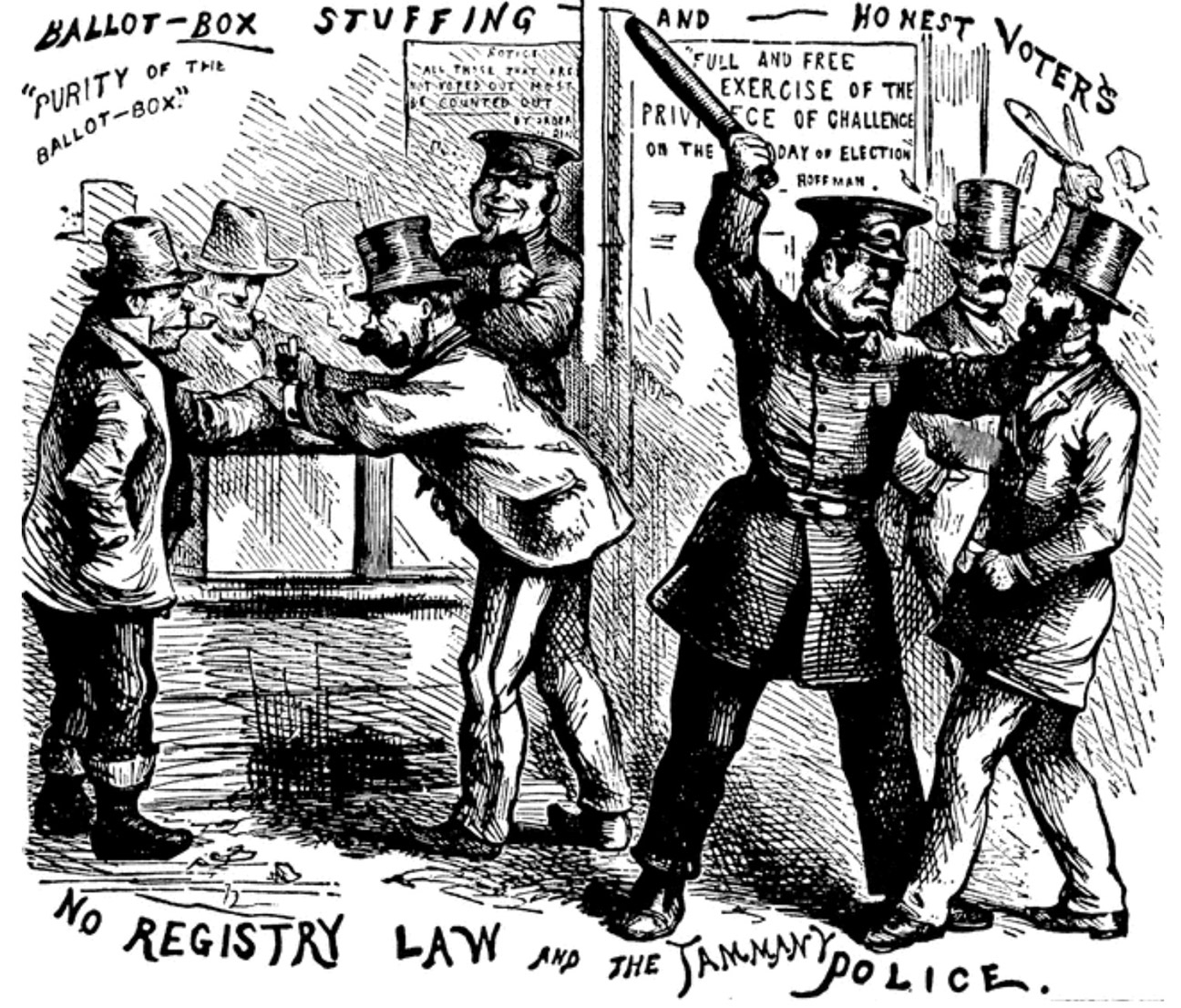
Ballot Stuffing and Intimidation

Ballot Stuffing and Intimidation
The corrupt excesses of the Gilded Age drove Thomas J. Durant, an eminent Washington, D.C., lawyer, to propose the universal adoption of the write-in ballot in 1872. while a year later Henry C. Marston tried to promote his “Patent Safety Ballot-Box.”Stephen J. Ackerman 1992
The Magic Ballot
The compulsion of open voting enables the Briber to follow the scoundrel who has sold his country, to see that he renders his vote to the Candidate who has had the baseness to buy it. Since voting is made open, and not also compulsory—it does nothing to ensure individuality of character. For it enables the coward to skulk his duty at the Poll, and subjects him who shows himself there to all the social penalties of publicity.George Jacob Holyoake 1868
A new defence of the ballot in consequence of Mr. Mill's objections to it
As to the mode of suffrage I lean strongly to that of the [secret] ballot, notwithstanding the objections which lie against it. It appears to me to be the only radical cure for those arts of Electioneering which poison the very fountain of liberty. The States in which the Ballott has been the Standing mode are the only instances in which elections are tolerably chaste and those arts [bribery & intimidation] in disgrace. If it should be thought improper to fix this mode by the constitution I should think it at least necessary to avoid any constitutional bar to a future adoption of it.James Madison 1785
Letter to Caleb Wallace
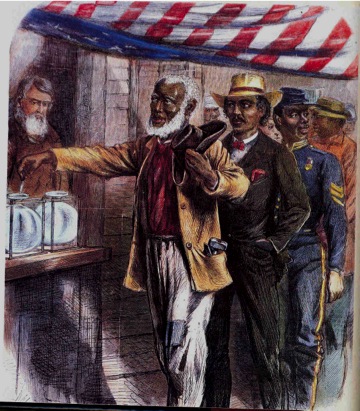
The First Black Votes were Transparent - 1867

The First Black Votes were Transparent - 1867
The secret ballot as a demand of political reform in the British context arose in the works of Jeremy Bentham in the late eighteenth and early nineteenth century. There is some evidence that there was an attempt to introduce secret voting in the Commons in 1710, but the Lords rejected the measure and no more came of it. Prior to the Benthamite proposal for secret voting, references made to the ballot in political discourse tended to use examples from antiquity, often in reference to Cicero’s De Legibus, which advocated for an open vote as a measure to counter electoral fraud. Bentham supported the secret ballot in included the secret ballot in Political Tactics from 1791, and it also took central stage in his 1817 Plan of Parliamentary Reform. His reasoning was broadly utilitarian. He worked under the assumption was that open voting disturbs the degree to which a vote represents the actual will of the voter, and that the purpose of elections was to best ascertain the universal interest, which he took as the aggregate of individual interests...By 1831 the subject of the ballot was “a theme of such daily discussion at every public gathering and in almost every newspaper, that all the arguments for and against it would be treated as nearly familiar”.Tom Theuns 2017
Jeremy Bentham, John Stuart Mill and the Secret Ballot
Using a new measure of fraud in elections to the House of Representatives from 1860 to 1930, we find that the Australian ballot and disenfranchisement measures reduced vote-buying and voter intimidation.Didi Kuo & Jan Teorell 2016
Illicit Tactics as Substitutes: Election Fraud, Ballot Reform, and Contested Congressional Elections
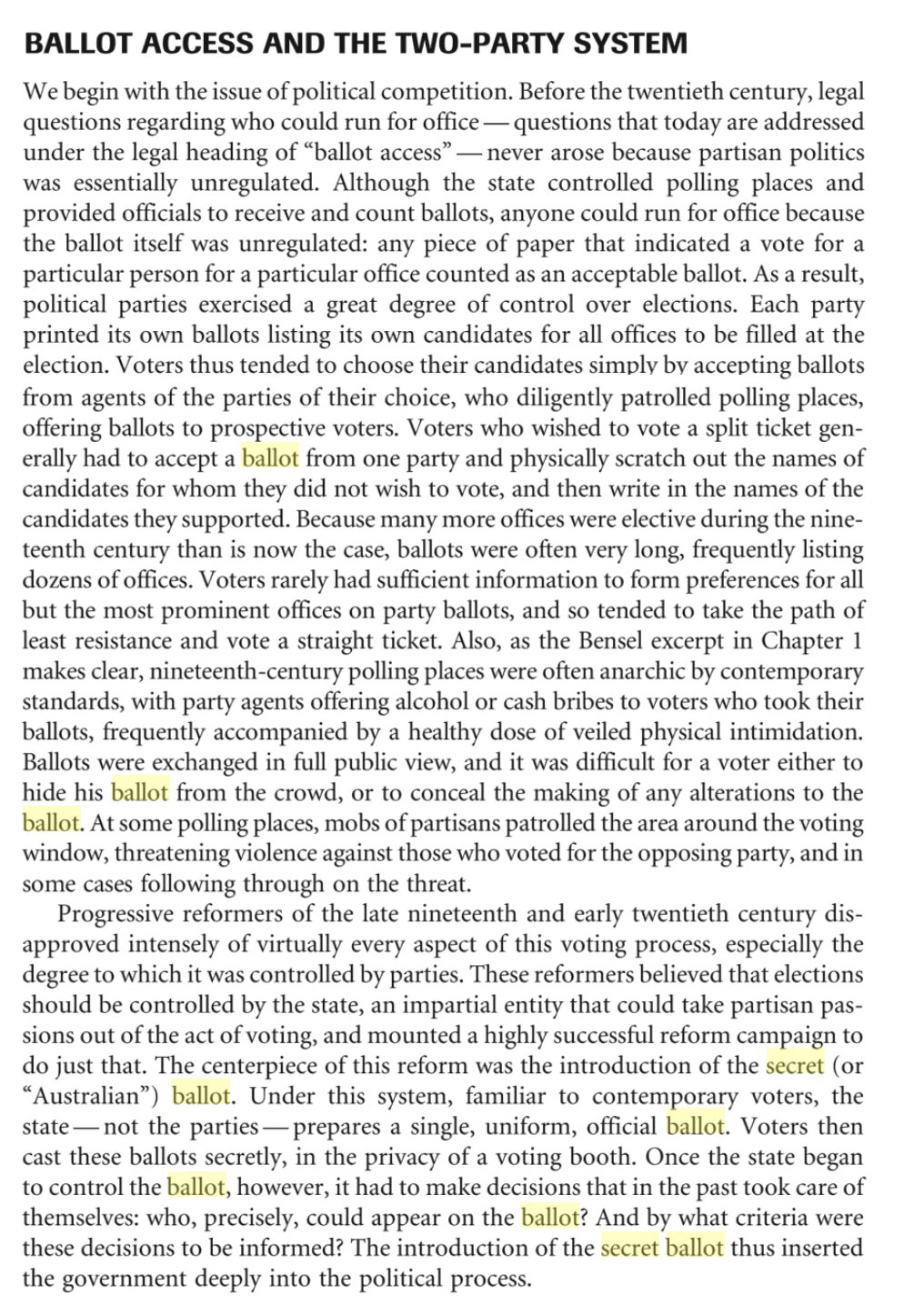
James A. Gardner & Guy-Uriel Charles - Election Law 2018

James A. Gardner & Guy-Uriel Charles - Election Law 2018
While all critics sought to curtail election fraud by advocating the Australian ballot system, with its provisions for a secret ballot instead of party tickets and for public rather than partisan control of the election process, Mugwumps viewed the reform as a way to weaken the political parties that functioned to mobilize the mass electorate. Populists, Greenbackers, laborites, and related groups saw the reform as a vehicle to end intimidation of voters and increase popular influence in the political system.Peter Argersinger 1985
New Perspectives on Election Fraud in the Gilded Age
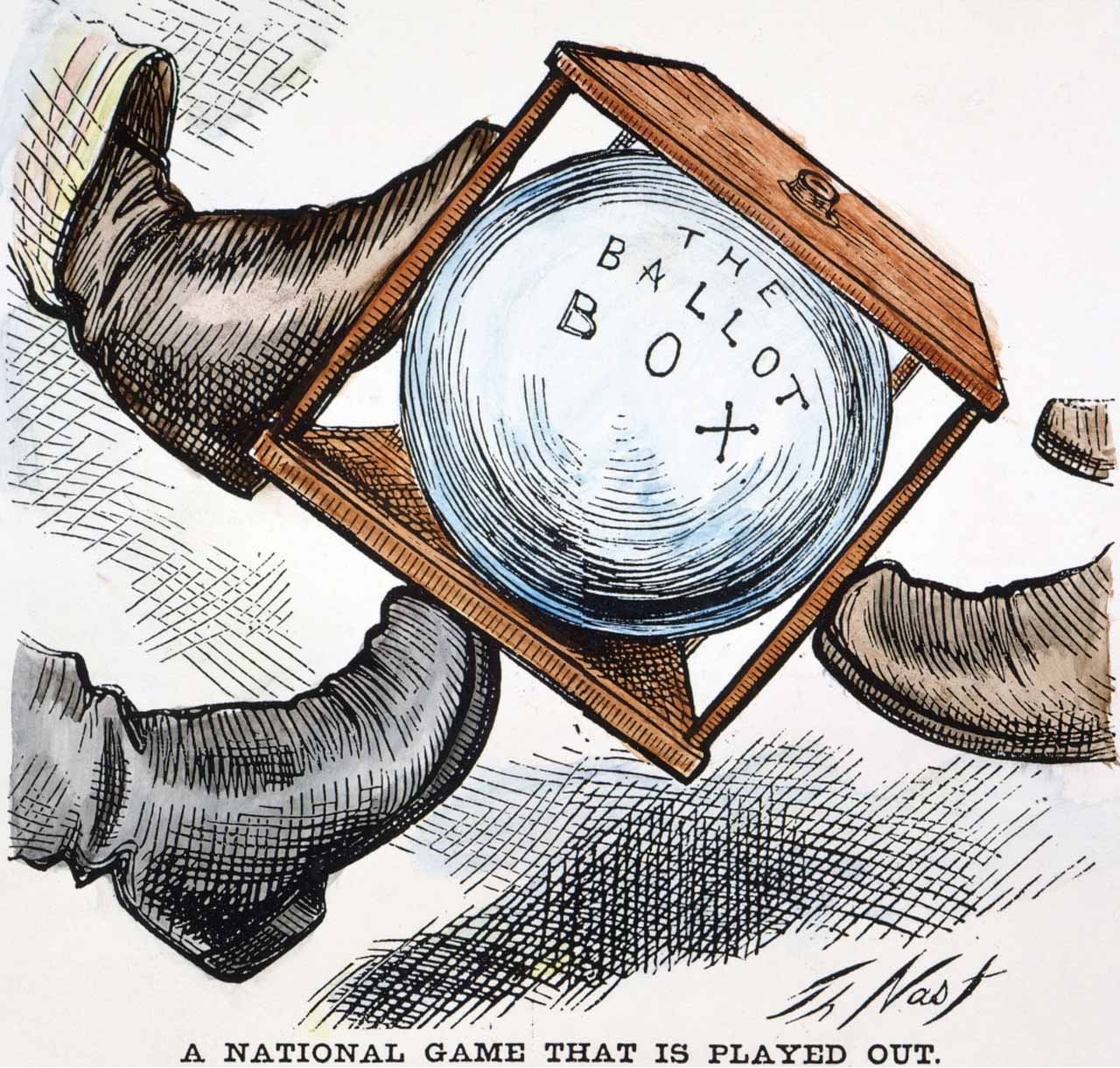
The 1876 Fight over the secret ballot - Thomas Nast
This ismage is misleading. The fight is over the secret ballot, not the transparency of the ballot box. But because the glass ballot box had become so iconic (and much easier to recognize than a regular ballot box), its image was used even up until the 1920s to suggest the secret ballot.

The 1876 Fight over the secret ballot - Thomas Nast
This ismage is misleading. The fight is over the secret ballot, not the transparency of the ballot box. But because the glass ballot box had become so iconic (and much easier to recognize than a regular ballot box), its image was used even up until the 1920s to suggest the secret ballot.
Indeed, violence was a common characteristic of Gilded Age elections and not at all limited to the South. The United States Marshal for Philadelphia admitted in 1881 that fraudulent voting and violence were so endemic in that city that “Never an election goes by without a riot” and in some wards “scarcely an election goes by without somebody being killed.” A Cincinnati newspaper reported as a quiet election one in which only eight people were killed. In many cities riots were often orchestrated to drive people away from the polls, with protection provided for those carrying the “right” party ticket. A Midwest newspaper noted in 1884 that nearly everywhere in America voting was “an arduous task attended by… personal danger. Every peaceable man and every household dread the approach of election day.”53 Such turmoil at the polls was so characteristic that the Kansas supreme court ruled in 1887 that election violence, including fights between rival party challengers, threats of physical retaliation, and “boisterous conduct,” constituted only “a slight disturbance and casual fray, such as frequently occurs at elections” and would not “vitiate an election, or justify voters in abandoning the polls.”54 One New York City election inspector reported: “I think it next to impossible for any man to go down and get a square vote at that precinct unless he had a regiment of soldiers with fixed bayonets .... The crowd got around me and threatened my life, so that I was advised I had better leave, and did so, as I did not want to be killed.” Richard Croker, eventually to become Tammany boss, got his political start as a bully to intimidate possible Republican voters and as a repeater, voting seventeen times in one election. In 1874 he was arrested for murdering one opponent at the polls.55 Peter Argersinger 1985
New Perspectives on Election Fraud in the Gilded Age
Concerned about election fraud in 1895 the Missouri supreme court ruled “The tyranny of giant corporations and concentrated wealth on the one hand, and the combinations of laborers and workingmen on the other, to say nothing of the influence of parties, make it exceedingly difficult for any save a bold and courageous man to vote an open ticket, and the courts should be exceedingly careful, therefore, in discrediting the secret ballot.”Peter Argersinger 1985
New Perspectives on Election Fraud in the Gilded Age
Second to the highly competitive nature of the political system in encouraging or permitting fraud was the structure of the election process. For most of the period there was no secret ballot. Instead voters used party tickets, printed by the different parties, containing the names of only their own candidates, and often varying widely in size and color. Distributed at the polls by partisan “hawkers” or “ticket peddlers,” these party tickets made the voter’s choice of party a public act and rendered voters susceptible to various forms of intimidation and influence while facilitating vote buying.Peter Argersinger 1985
New Perspectives on Election Fraud in the Gilded Age
Mares (2015) examines how the 1903 German legislation that introduced ballot envelopes and isolating spaces affected the strength of support for the Social Democratic Party, the major antisystem party in Germany. Prior to the introduction of this legislation, support for the party had been suppressed through intimidation by employers and state employees. The legislation protecting voter secrecy gave voters the opportunity to support the opposition party without fearing layoffs. Isabela Mares & Lauren Young 2016
Buying, Expropriating, and Stealing Votes
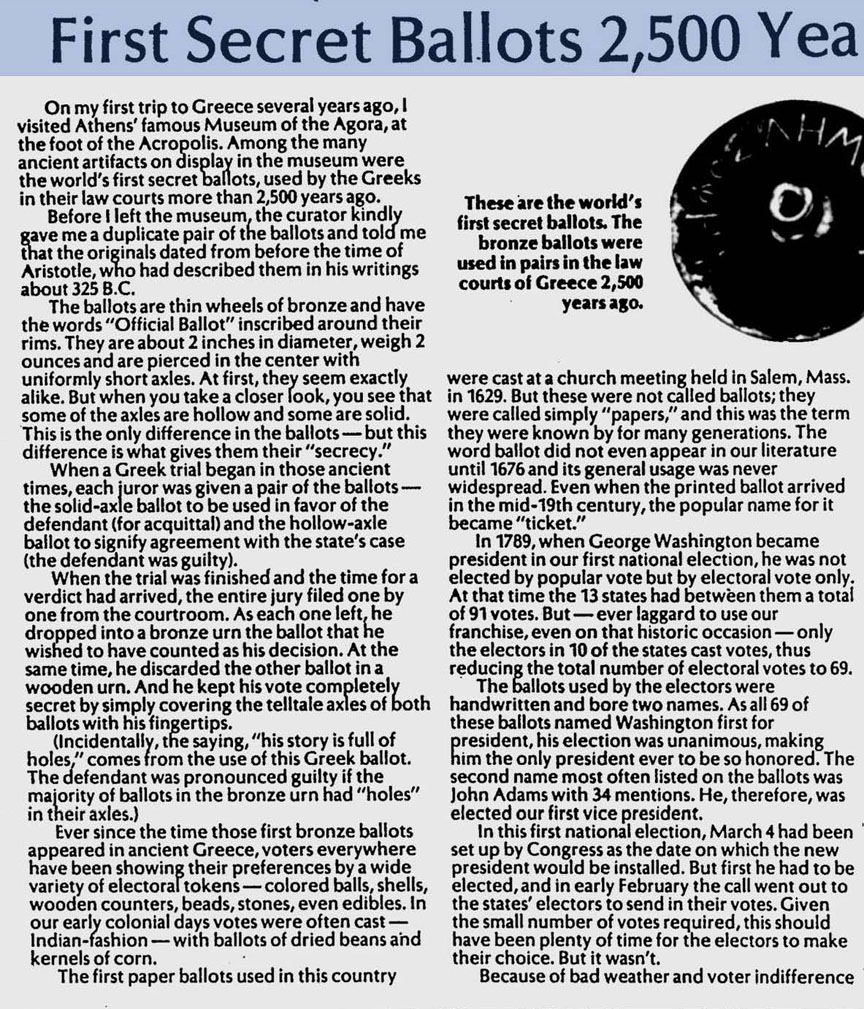
The First Secret Ballots 350BC

The First Secret Ballots 350BC
Ballot boxes have been used of many different materials, from the primitive hat or cigar box, to the voting urn, glass ballot box, and the elaborate mechanical repositories of votes above referred to. Frauds upon the ballot box should be ranked among the worst of crimes against republican government. The secrecy and the sacredness of the ballot should be maintained at whatever cost. The more free the people, the more carefully will the secret ballot be guarded, as the best guarantee of personal independence.Ainsworth Rand Spofford 1881
Enyclopædia of Political Science, Political Economy, and the Political History of the United States
In Massachusetts many conservative factory owners favored the Whig party and opposed the secret ballot.Ainsworth Rand Spofford 1881
The Surprising History of Elections in the Bay State
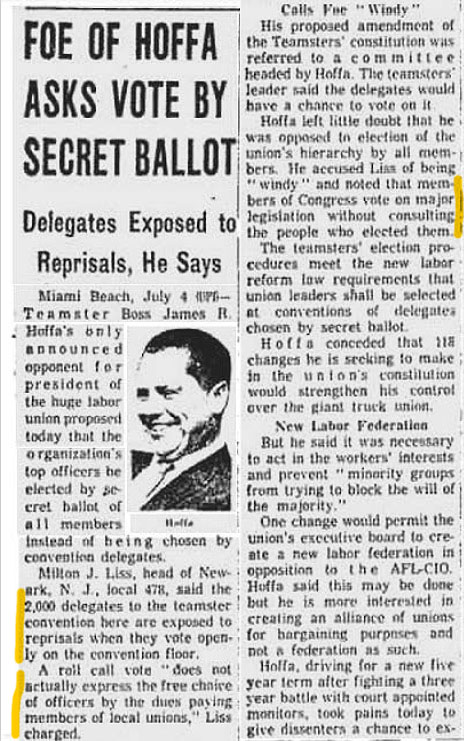
Delegates to 1961 teamster convention
intimidated by open balloting

Delegates to 1961 teamster convention
intimidated by open balloting

